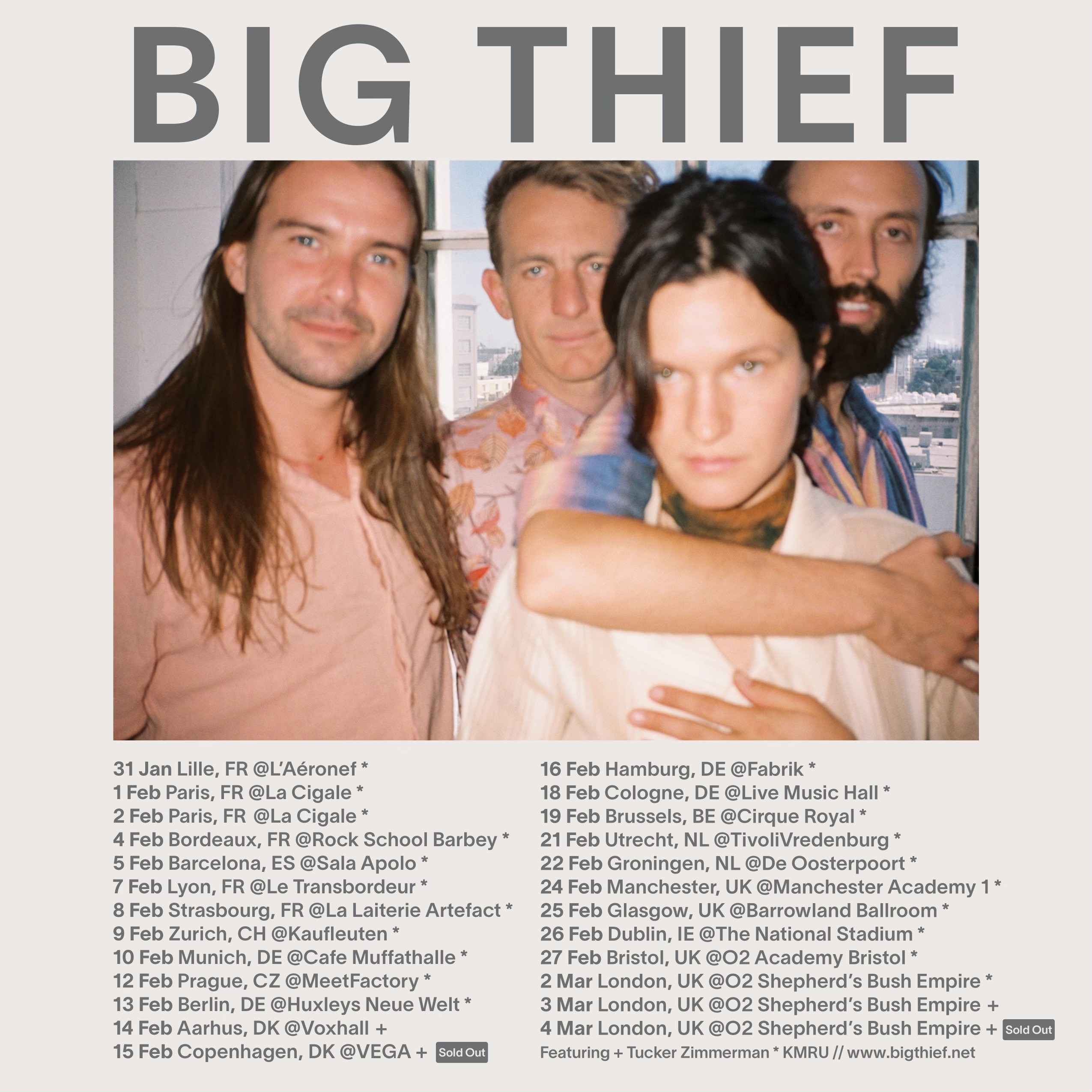C2C FESTIVAL 2026
29 OCT ╱ 01 NOV
TORINO ╱ EUROPA
25 YEARS OF
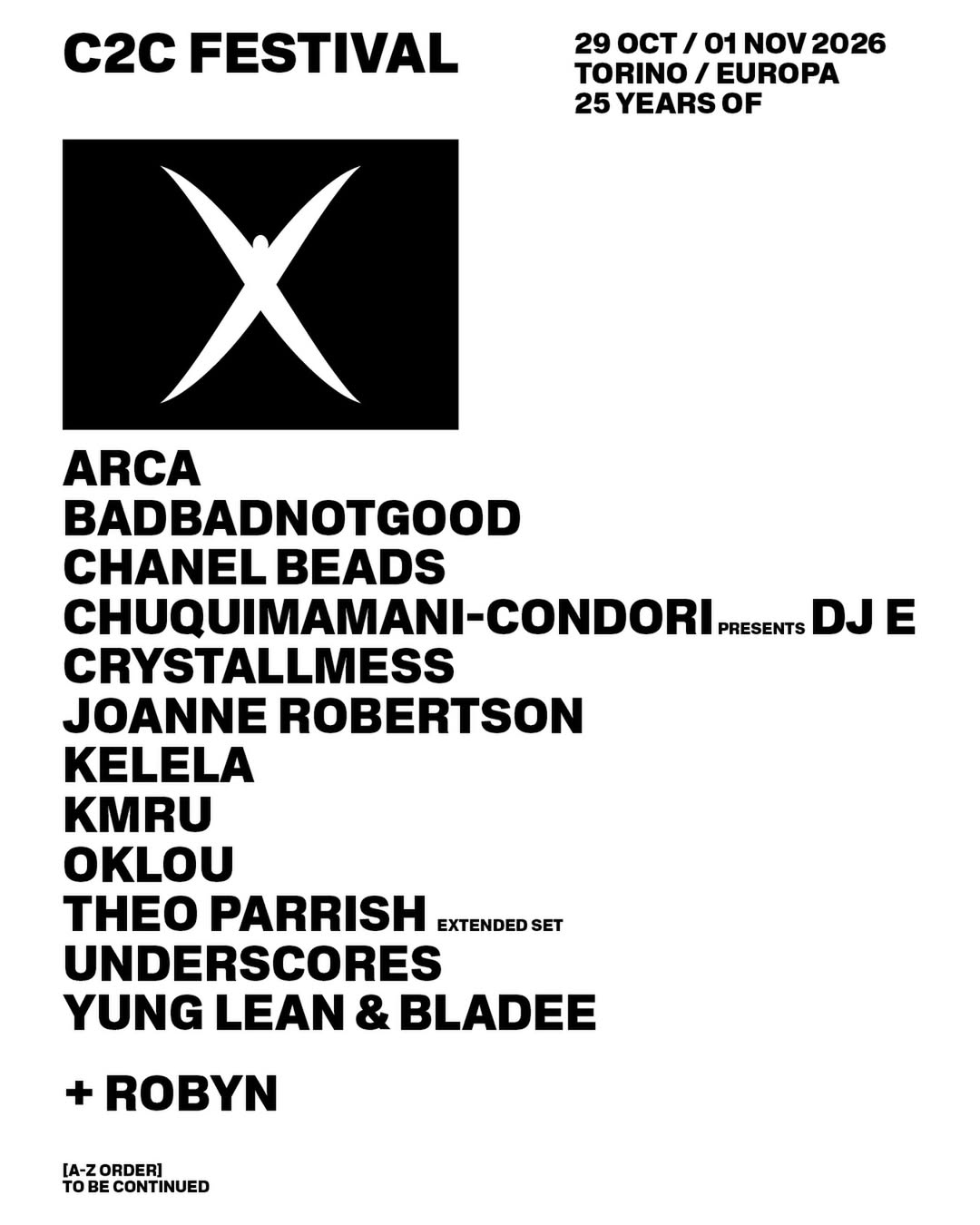
Ableton x Mixcloud
Someone’s Always Listening: KMRU on the Art of Sharing Music
From Nairobi to Berlin: KMRU on The Art of Releasing Music
“For musician and sound artist Joseph Kamaru (known on stage as KMRU), sharing music is less about promotion and more about a steady presence. His ambient compositions, shaped by the subtle use of field recordings, atmospheric pads, and delicate intricacies, move with patience, revealing space as both subject and medium. When sharing his music, what Kamaru offers is not so much a pitch or campaign, but rather a quiet invitation: to listen attentively, allowing the sound to guide your experience.“

Heavy Combination showcases career highlights by the ‘King of Kikuya Benga’, Joseph Kamaru, recorded over the course of five decades in Kenya, compiled with his grandson, sound artist KMRU
JOSEPH KAMARU
Heavy Combination 1966 - 2007


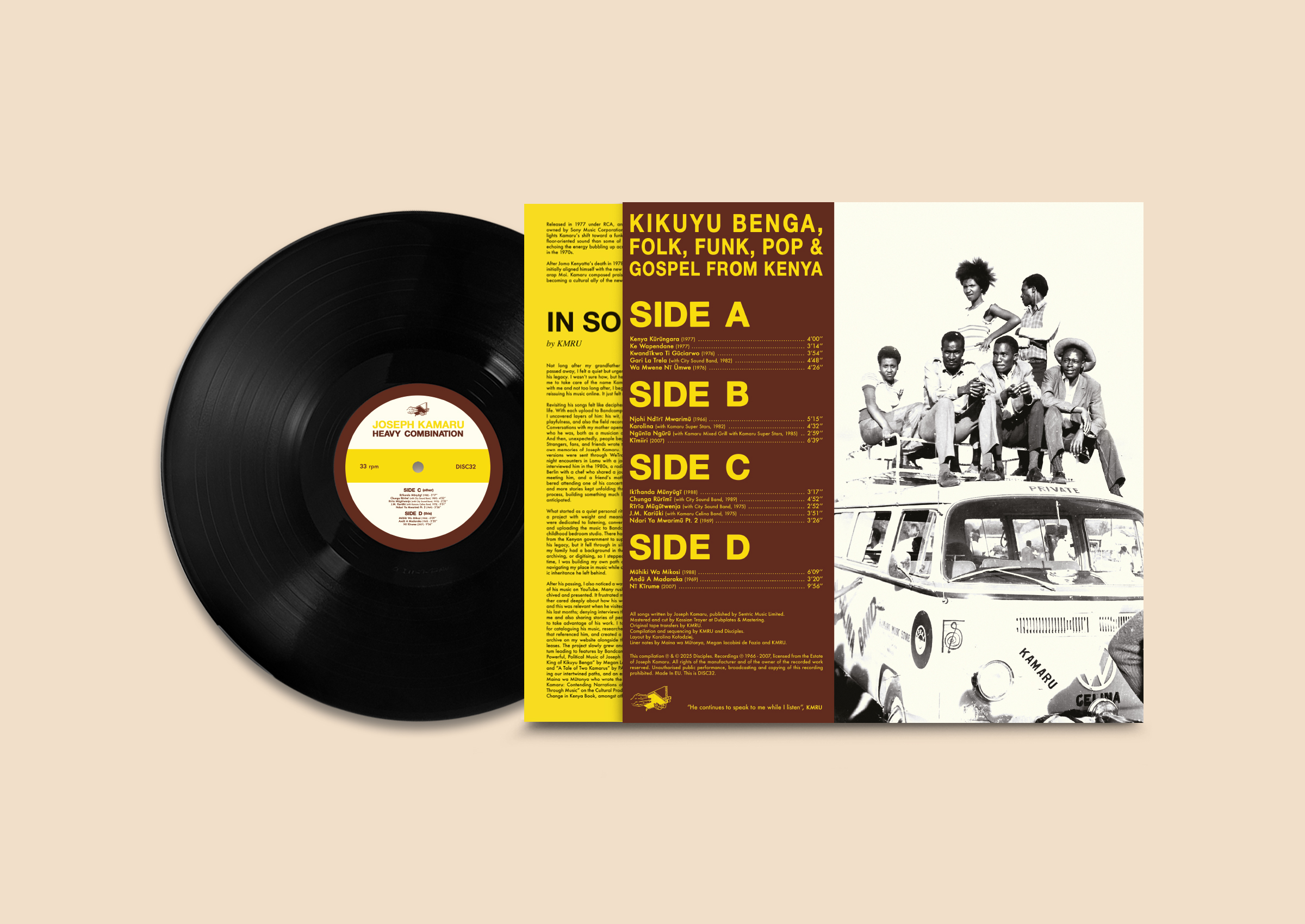
A crucial introduction to the 'King of Kikuyu Benga' and the first career-spanning retrospective of the incredible catalogue of the late, great Joseph Kamaru.
17 tracks that run the gamut from vibrant dancefloor chants with high life-esque guitars, to afro funk, drum machine and keyboard driven disco grooves, and folk style laments. The music is raw, immediate, danceable, and packed full of memorable hooks. The incisive lyrics range from protest songs to relationship advice. Joseph Kamaru was an incredibly popular figure in his native Kenya, connecting with everyone from high-powered politicians to the rural and urban working class, and his music deserves a much wider international audience.
Compiled in partnership with Joseph Kamaru's grandson, the sound artist KMRU.
The tracks have been carefully remastered from original tape transfers by Dubplates & Mastering in Berlin.
Sleeve designed by Karolina Kołodziej using original archive material from the Kamaru family vaults.
Extensive liner notes include essays by Kenyan academic Maina wa Mũtonya, music journalist Megan Iacobini de Fazio, and KMRU himself.
-
patchandtweak
Polyculture Polyrhythm: Three African electronic music Artists making waves
Aeyde Radio—Mix 09
In Conversation with KMRU
Recording the Rhythm of a City"
Oceanic Refractions: La Biennale di Venezia 2025
Official Pre-Opening: May 8–9, 2025
Exhibition: May 10–November 23, 2025
Oceanic Refractions has been selected for the Curators Pavilion of the 19th Venice Architecture Exhibition, La Biennale di Venezia. The exhibition will feature an elevated architectural design, public programming and extensive catalogue of sound and images of Oceanian self-determination, sovereignty and ecological care.

Mangrove Ecologies: Listening to land
Akin to a jam session or freeform garage band, the group conversation features a diversity of talents; musical and sonic scholarship is represented by Pratyay Raha and Joseph Kamaru — also known as KMRU — while spatial interests are covered by architectural designers Gabriela Carrillo and Carlos Facio Gaxiola, from the Mexican practice Colectivo C733. In this exchange, all parties discuss the specific majesty of mangroves.
ACL 2024 ~ Top Ten Drone
ACL 2024 ~ The Top 20 Albums of the Year
KMRU ~ Natur (Touch)
Recalling Maryanne Amacher’s claim that all cities have a key, on Natur the artist who records as KMRU responds to the sounds of place. Prompted by a move from one city to another, the album explores those qualities that soundtrack urban life in the 21st century. The sound of electricity, technology, electromagnetic frequencies begin almost immediately and extend throughout the over 50 minute run time of the album’s single composition. The result is a soundscape cum meditation on what we hear and what we don’t hear. The composition’s drone and haptic frequencies are occasionally interrupted by the occasional field recording of birds or a child, but those sounds are the exception. As we noted in our original review of the album, there are moments of beauty on the album, but the listener is primarily enveloped in the hypnotic swoon of the electronic soundscape, making those moments of interruption all the more remarkable. (Jennifer Smart)
KMRU ~ Natur (Touch)
Have I ever mentioned my horseshoe theory of German efficiency? I’ll let you fill in the details, but when Joseph Kamaru left Nairobi to study in Berlin, he was surprised at the silence that shrouds the supposed capitol of European nightlife, shocked also by the lack of contrast between day and night. Since breaking through with Peel (2020), KMRU has been prolific in his output, including solo records as well as collaborations with Aho Ssan, Echium, and Kevin Richard Martin. Earlier this year, KMRU extended his album Temporary Stored, which transformed materials from the sonic archive of the Royal Museum of Central Africa in Belgium, by inviting his contemporaries to respond to the historical archive. But Natur is a solo artistic statement, a composition that has been honed by years of live performance. The first half wades through digital noise, mildly abrasive and at times harsh.f Natur evolves as natural sounds begin to emerge from the haze, a thick synth drone pulsing slowly along. But this is no simple bifurcation, no dialectic that find resolution. Natur transforms the contrast KMRU perceived between Nairobi and Berlin into a more universal statement on how our perception of reality is shaped by our relationship with technology. (Joseph Sannicandro)
-
![]()
![]()
THE TOP 25 PRODUCERS WHO DEFINED THE YEAR 2024
KMRU
When Brian Eno coined the term ‘ambient’, he described it as music that “must be as ignorable as it is interesting”. The work of Joseph Kamaru, AKA KMRU, might be the epitome of this. With his ear constantly attuned to the world around him, Kamaru takes field recordings of the everyday noises we might otherwise ignore, and distorts them into vibrantly textured, experimental soundscapes. Having received international acclaim for his 2020 album ‘Peel’, the sound artist has been consistently building on this practice, finding new ways to elevate the beauty of noise.
This year saw a string of releases from the Nairobi-born, Berlin-based composer, starting with ‘Disconnect’, a collaborative album with British producer Kevin Richard Martin (AKA The Bug). Featuring KMRU’s own vocals, the six-track record is as eerie as it is peaceful, its apocalyptic drone sounds paradoxically pulling you in. Next came ‘Natur’, a 52-minute arrangement, which the artist first started work on in 2022. This formed a live show that KMRU took on tour, tweaking and sculpting the piece as he travelled. "I became it," he says of the track. "I merged with it on a performance level." Released this year, the composition explores the ways in which different places have different soundscapes, and how these distinct sonic identities inform our own behaviours.
Among collaborative projects with the likes of Thea Soti and Aho Ssan, KMRU put out another solo LP in 2024. Perhaps his best piece of work this year, ‘Forge’ is an exquisite 10-track record that shapes his field recordings into fully formed melodies and rhythms, while retaining their inherent delicacy and minimalism.

The 10 Best Experimental Albums Of 2024

KMRU - Natur (Touch)
For this ominous-yet-animated suite of static, Berlin-via-Nairobi sound artist KMRU uses electromagnetic microphones to reflect the invisible signals of city life. This means steady hums are swarmed with high-frequency chirps, crackling prickles twitch nervously like the flitting off exposed wires and the supposed pulses of life come in and out of focus.
The Best Field Recordings of 2024
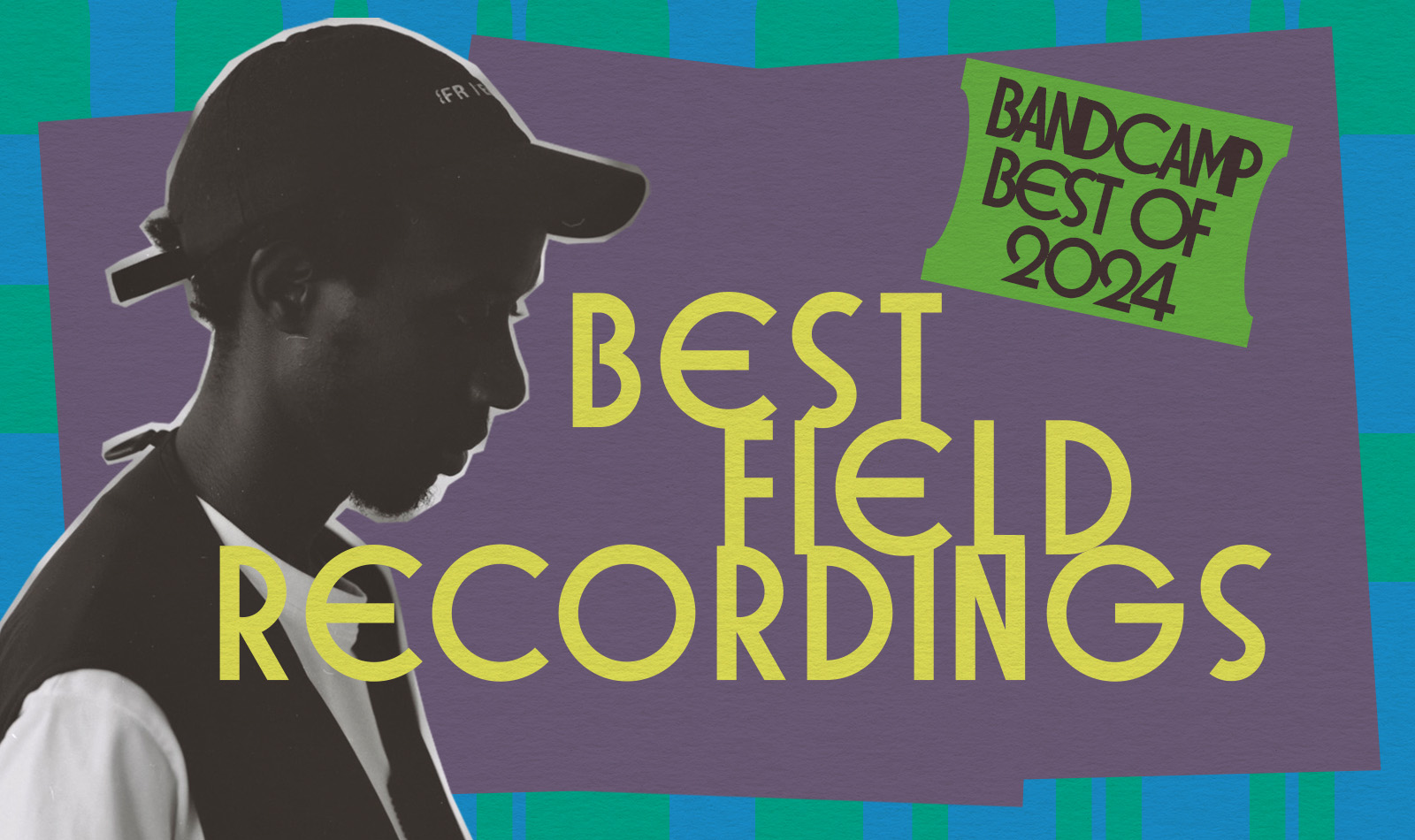
Though his work centers around field recording, the Kenyan artist Joseph Kamaru has always had the heart of a composer. His breakthrough album, 2020’s Peel, combined environmental sound with emotive electronic pieces, while last year’s Dissolution Grip re-synthesized waveforms taken from field recordings so that the originals haunted the album like memories. Natur, though, is pure field recording, though you might not know it by listening. Waves of electricity buzz and vibrate, building to crescendos and then crashing down again into staticky ambience. These sounds were gathered with electromagnetic microphones from the streets of Berlin. In KMRU’s native Nairobi, power lines and transformers buzz in the streets and mingle with conversation, birds, and insects. Upon moving to Germany, he noticed how Berlin buried its power grid, banished its wildlife, and cloistered its population into apartment blocks. Natur summons these constituent parts back into the open, making technology’s confrontation with nature explicit. Though the album’s overpowering electrical hum suggests tech may be dominant, a closer listen reveals that wildlife is always at the margins, making itself heard through the noise.

The Top 50 Albums of 2024
KMRU & Kevin Richard Martin
Disconnect
Nairobi-born sound artist KMRU is famed for his ambient sound designs, drone explorations and albums of manipulated field recordings, while Kevin Richard Martin (a.k.a. The Bug) – as you’ll be well aware of by now – is the creator of rugged, dystopian and noise-strafed dub, grime and dancehall. So, you’d expect nothing less than boundary-pushing, depth-charging sonics from this meeting of minds – and that’s exactly what Disconnect delivers. The album is a back-and-forth dialogue between the two, in which KMRU’s colonial stories and spoken-word passages about stolen African artifacts are chopped up, Steve Reich-style, and woven into slowly disintegrating, end-of-times soundscapes that put the emphasis squarely on dread. The heavy mood throughout is devastating, harking back to Martin’s often-overlooked ambient work with Earth.
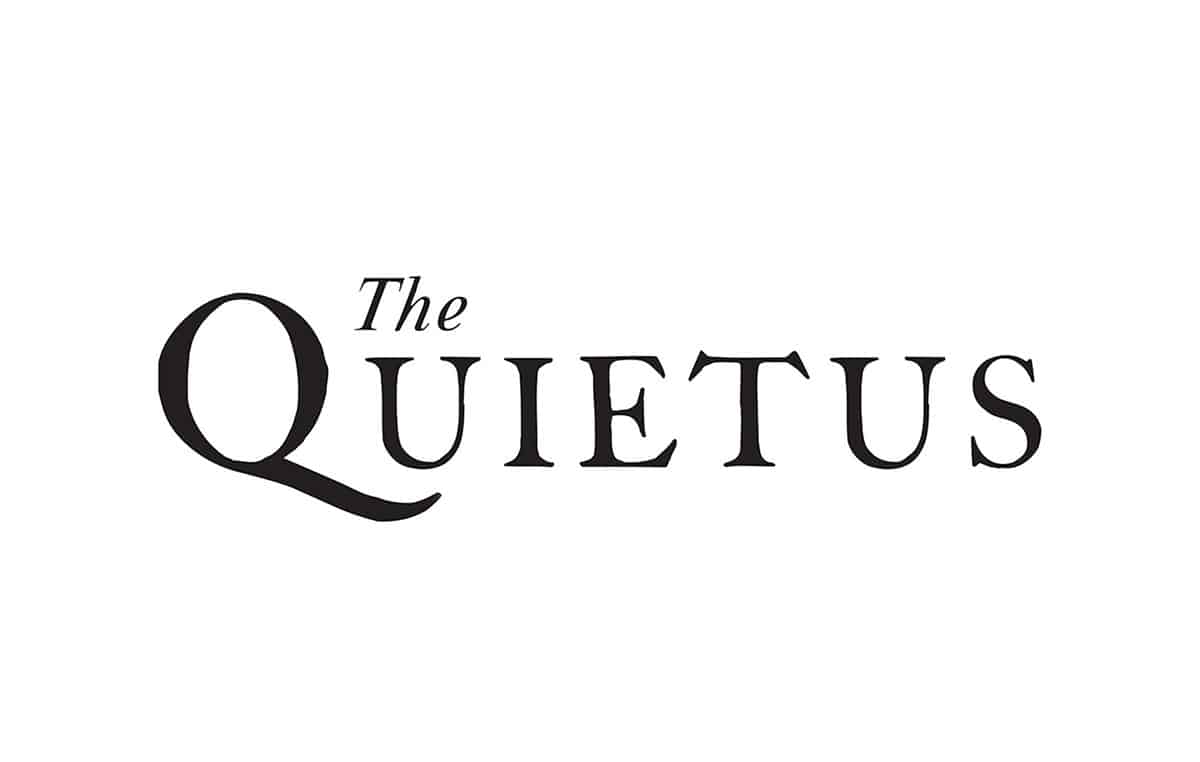
Kevin Richard Martin and KMRU Release New EP,
|Otherness|
The three-track record was birthed during the same studio sessions that led to this year's collaborative album, Disconnect
Kevin Richard Martin, AKA The Bug, and KMRU have released a new collaborative EP, Otherness.
Spanning three tracks, the EP is made up of music that the two artists created during the recording sessions that birthed their joint record Disconnect, which Phantom Limb released earlier this year. You can listen to the full EP below. In a statement, KMRU said: “I think Otherness carries the whole weight and the complexities of Disconnect. It extends the album into spaces of the unknown while remaining opaque.”
Otherness is out now on Phantom Limb.

The Best Albums of 2024
Imagine a centuries-old transmission from a distant solar system delivering an apocalyptic account of a long-defunct world’s final days. It’s not tough to imagine that posthumous communiqué sounding something like Disconnect. Born of the mutual admiration between British electronic composer/producer Kevin Martin and Nairobi-born sound artist Joseph Kamaru, the album ostensibly operates like ambient music, but it’s far too commanding to simply slip into the background. Kamaru’s electronically massaged vocals—from wordless moans to spoken-word snippets—blend with subterranean drones in a eulogy for post-industrial ghosts.
Wire mix: KMRU
December 2024
To mark Nonclassical’s 20th anniversary, the Kenyan born musician KMRU creates an exclusive mix of experimental classical and electronic music for The Wire
Top 10 Albums Of The Year 2024


Disconnect brings the evocative and enchanting results you would expect from such a high calibre connection, an inspired link up from the Phantom Limb crew.
Especially for our Albums of the Year edition, we have an exclusive 3 track CD cut from the same Disconnect sessions
-
forge
Out on Seil Records
LP+ Digital + Tape
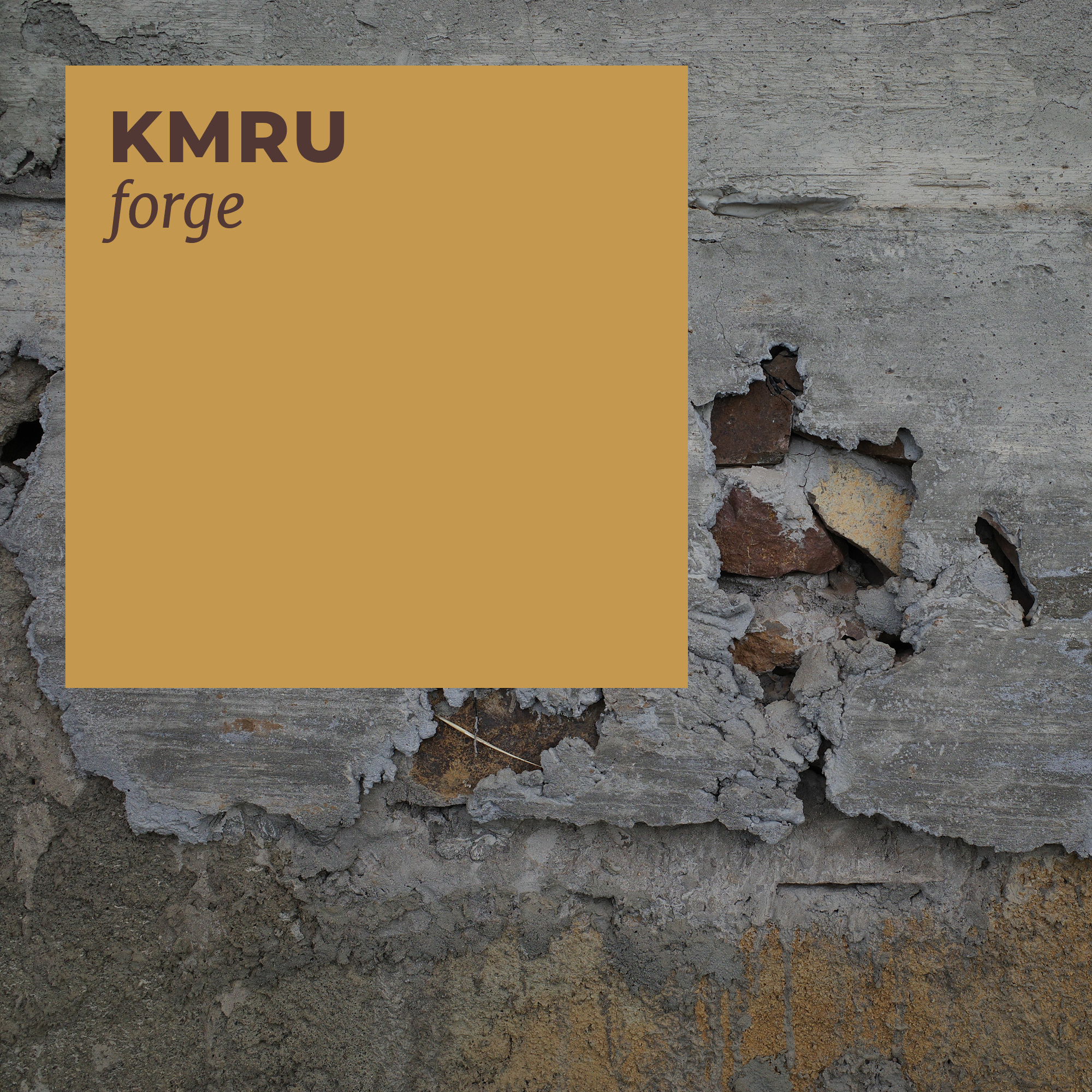


1×LP, Limited Coloured - Silver VINYL - Order on Bleep
Since emerging with his first releases in 2017, Joseph Kamaru AKA KMRU has fast become a key figure in the world of ambient music and its ever shifting definitions. The gargantuan nocturnes of 2020’s Peel on Editions Mego practically catapulted the Nairobian field recorder and versatile producer into view, leading to a prolific stream of works and collaborations across a spectrum of labels. His latest album forge follows in the vein of previous releases for Seil Records, comparatively more pop minded and snapshot like in nature when contextualised in a discography of LP side length explorations and examinations. Yet, no matter the length, melody still percolates through these tracks, patiently dribbling over intertwining notes that liquefy into a sonorous river. The soft rattle of blurry glass tones enters on ‘opener’, with sounds from the outer world leaking in as momentary glitches blip, chirp, and whirr. Sounds like these are gently amplified, muted yet vibrant, thrumming and swooping across active landscapes in playful compositions. Swirling notes of alien birdsong puff and push throughout ‘cine’, joined by fountains of static spewing over long lazing drones. Field recordings and the distorted, fried mbira plucks on tracks like ‘over a placid river’ bring the more earthly tones back into focus, growing blissfully erratic as they plink onwards. As forge merges these sounds in a “blend of melody and noise, rhythm and drone”, it pursues a communion of oscillation, with howling stretches that subtly warp and glide in harmony, ending with the amphibian synths of ‘mago’ jumping in and out of the captivating, mercurial space that KMRU conjures with every effort he has released thus far.

The 100 Best Albums of the 2020s So Far
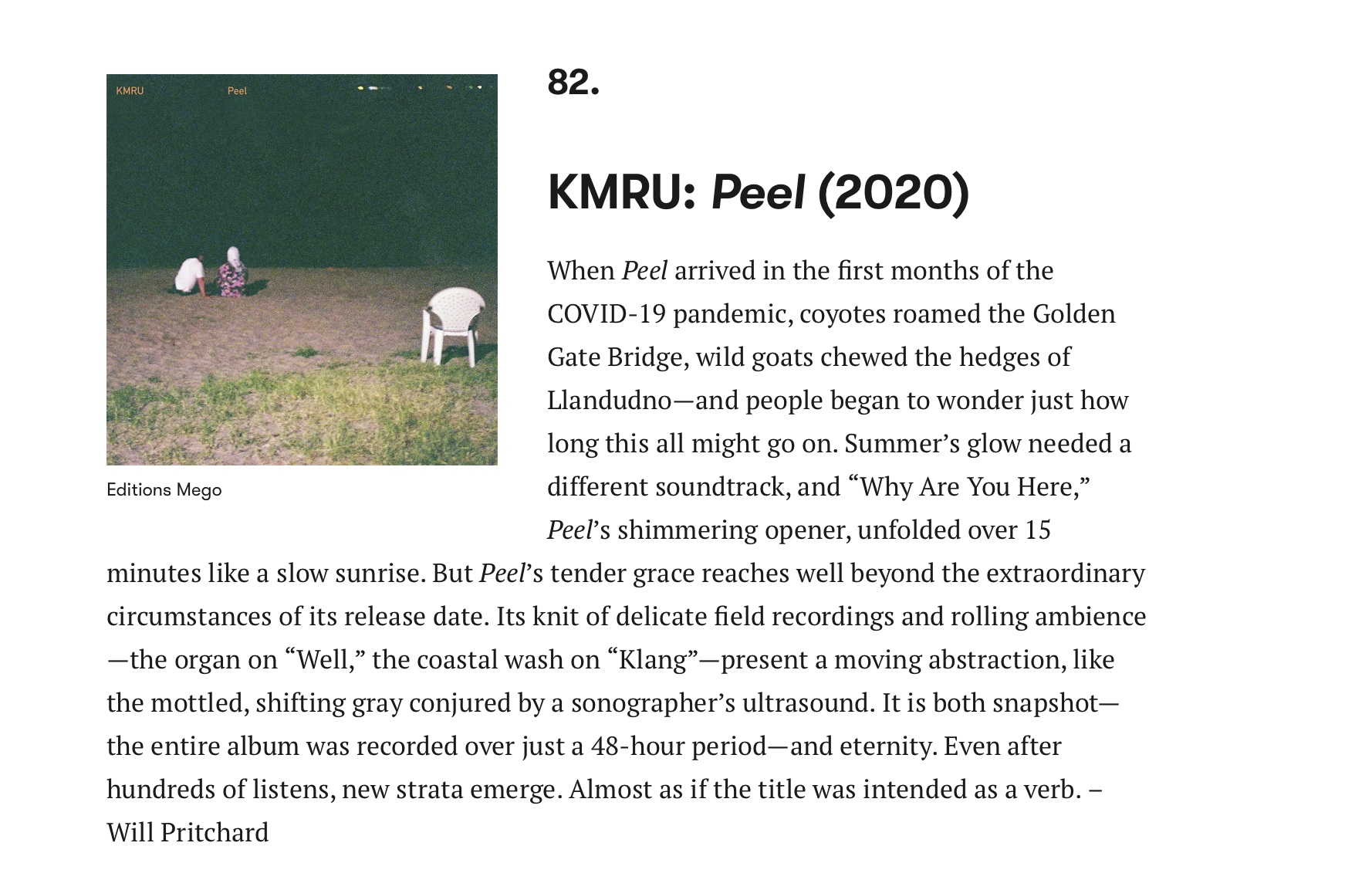
Temporary Stored II
by KMRU, Aho Ssan, Lamin Fofana, Nyokabi Kariũki and Jessica Ekomane, Bhavisha Panchia
out on 11 October - OFNOT


-

The Best Music of 2024 So Far
A rolling list of our favorite albums of the year, updated somewhat frequently.


The Best Ambient Music on Bandcamp, August 2024
“Natur is meditative and sparse. But an inescapable current of anxiety dwells beneath the five movement, 52-minute piece—as if to serve as a faint reminder that even the most casual downtown train ride could somehow go awry on the whim of technology. Using static hums to ponder differences in life between continents, Natur emphasizes KMRU’s ability to make instrumental music that packs the punch of a well-considered essay.“


The Kenyan artist’s new release is a stunning portrait of the electromagnetic sounds and hidden noises of his hometown. In its swelling electrical currents lies a thesis about the richness and drama of everyday sounds.

Boomkat:
KMRU
Natur
KMRU's most visceral and satisfying full-length, 'Natur' is a departure from his more pastoral, drone-based work, tweaking invisible electromagnetic squeals and rumbles into searing noisescapes and evocative orchestral moans. Seriously elevated gear, essential listening for anyone into Christina Kubisch, Fennesz or Kassel Jaeger.
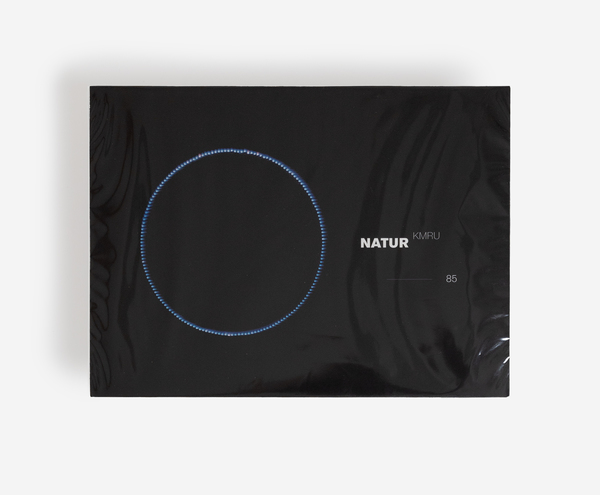
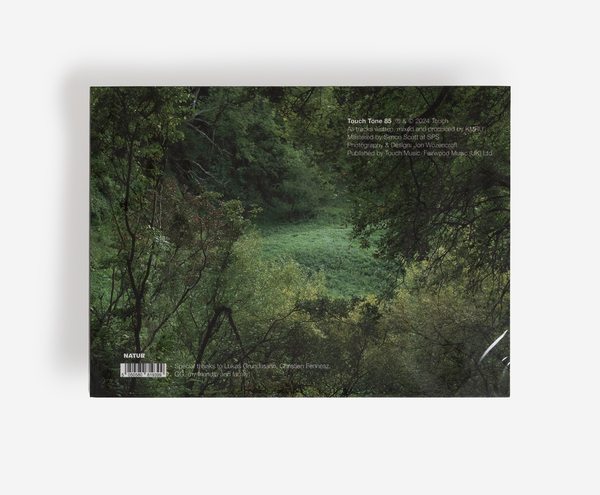
A closer Listen
KMRU ~ Natur (Review)
“Natur offers the sound of the new nature: the aggregate of sounds humans now consider natural, no matter what their source. If the piece sounds lulling rather than unsettling, the damage may already be done.”...”KMRU creates a blended soundtrack of his own relocation.“

“This Idea of Dub as a Philosophy”: A Talk with KMRU and Kevin Richard Martin (The Bug)
A conversation centered around the duo’s debut collaborative release.


Kevin Richard Martin & Joseph Kamaru on exploring Otherness with their joint album Disconnect
“From the bleak and angst-ridden artwork, to the quiet power of spoken word and desolate beats, Disconnect is a succinct and arresting project delving into the complexities of being Othered. KRM and KMRU meditate on several conceptual themes in a way that both expand their own individual practices, while highlighting their shared sensibilities. Though they represent two different generations of electronic musicianship, they found unexpected beauty and nuance in the experimental and collaborative process of creating the record and riffing on the ways they’ve experienced Otherness. Over our three-way call, KRM laughs while explaining “I thought we made a beautiful album, and the first comment I saw online from someone was ‘This is a really heavy record!’”

Disconnect
Kevin Richard Martin / KMRU
The pair’s debut collaboration is an amorphous, droning flood that sounds like the advent of the end times. In its hopeless sound world lies a poignant condemnation of colonial violence.

First Floor #226 –
- KMRU’s music is often hailed for its delicate nature and relative quiet, but the Kenyan artist will soon be releasing something far less orderly into the world: Natur, a long-form composition that’s said to use “dense clouds of static and intimidating, dissonant drones” to “[uncloak] the commotion hidden by the digital era’s ambiguous stillness.” The complete piece will be issued by the Touch label on July 26, but an extended excerpt is available now.
From Coldplay to KMRU: who to see at Glastonbury 2024
“ ....and the marrow-jolting ambience of Kenya’s KMRU (00.00, Friday, both Tree stage). BBT“

KRM & KMRU
Disconnect
The Bug and Joseph Kamaru find common ground and companionship in a stifling world on their album-length collaboration, writes Skye Butchard
"”What’s most impressive is how it merges its two creators. They’ve made a piece that combines their worlds so seamlessly. In doing so, they communicate how it feels to be alone but also what can be made together”
-
CLASH MAGAZINE
KRM / The Bug & KMRU -Disconnect
A titanic experience...
“At times it feels like Martin and Kamaru aren’t just making new music but they’re trying to invent a new musical language. Miss at your peril”
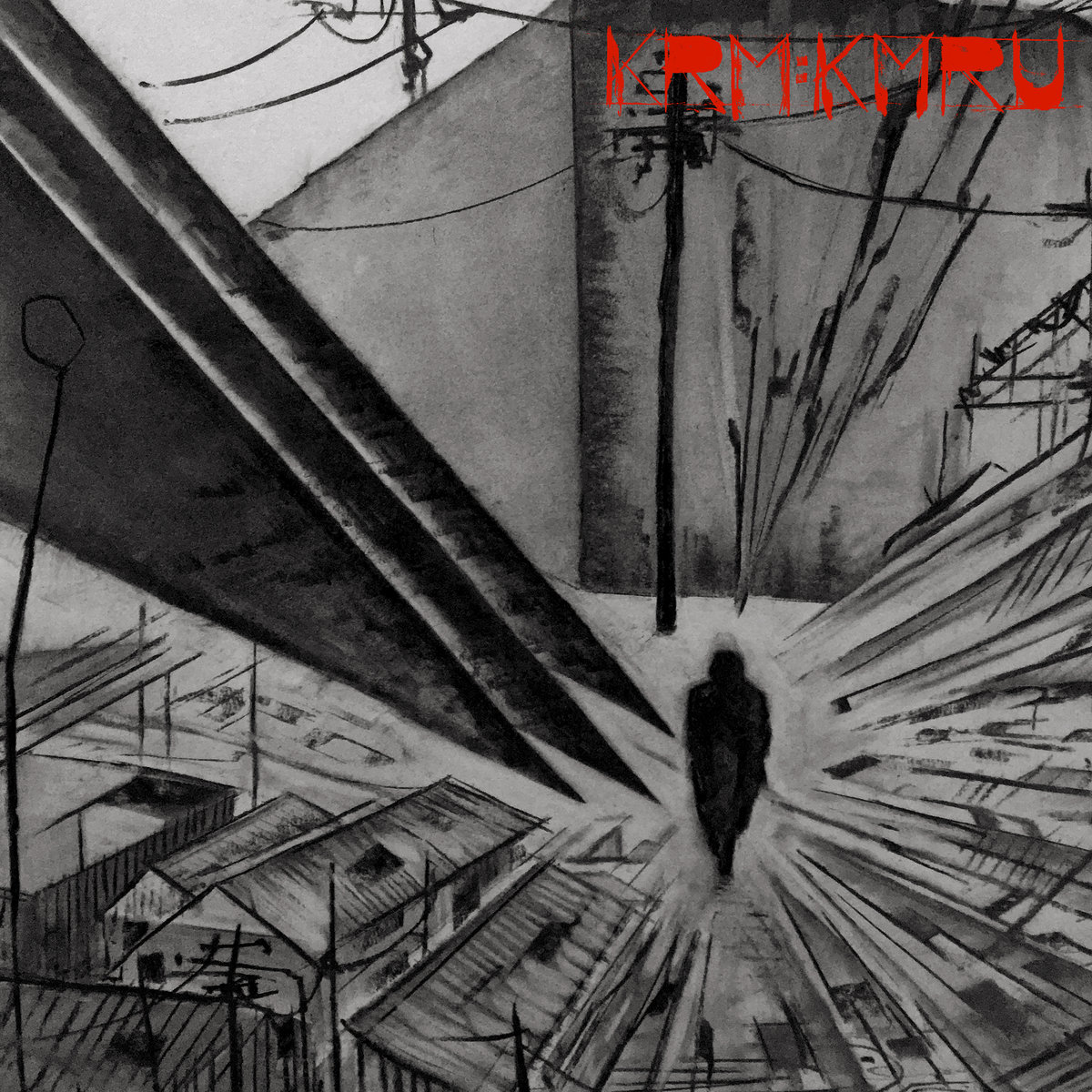
The Wire 485
July 2024
KMRU: The Kenyan sound artist finds a new mode of listening on his collaboration with Kevin Martin.


KMRU Details New Album, ‘Natur’
It's the Nairobi-born, Berlin-based sound artist's first record for UK label Touch
KMRU has a new album on the way, titled Natur.
Comprised of a single lengthy piece that the Nairobi-born, Berlin-based sound artist composed in 2022, it marks his debut release for the UK label Touch. Since he first made the piece, it has become a staple of his live sets, which he has used to reshape it into the final form that will be released in July. “I became [the piece],” he said in a statement. “I merged with it on a performance level.”
As with past KMRU works, Natur makes use of various environmental recordings. There are also moments of harsh and static noise, as well as drones, captured using electromagnetic microphones.
Natur will follow on from KMRU’s forthcoming collaboration with Kevin Richard Martin, Disconnect, which is due out in June.
Touch will release Natur on July 26, 2024.

-
Kevin Richard Martin and KMRU team up for hypnotic new album: Disconnect
Out 14th June via Phantom Limb
Acclaimed heavyweights Kevin Richard Martin (The Bug) and Joseph Kamaru (KMRU) unite
for the upcoming album Disconnect, out 14th June through UK indie label Phantom Limb.
The LP is a powerful study of dread, hope, and profound sonics that marries depth-trawling
dub with Kamaru’s voice, ambient sensibilities, and negative space.

Pre order Vinyl

REVIEWS
-
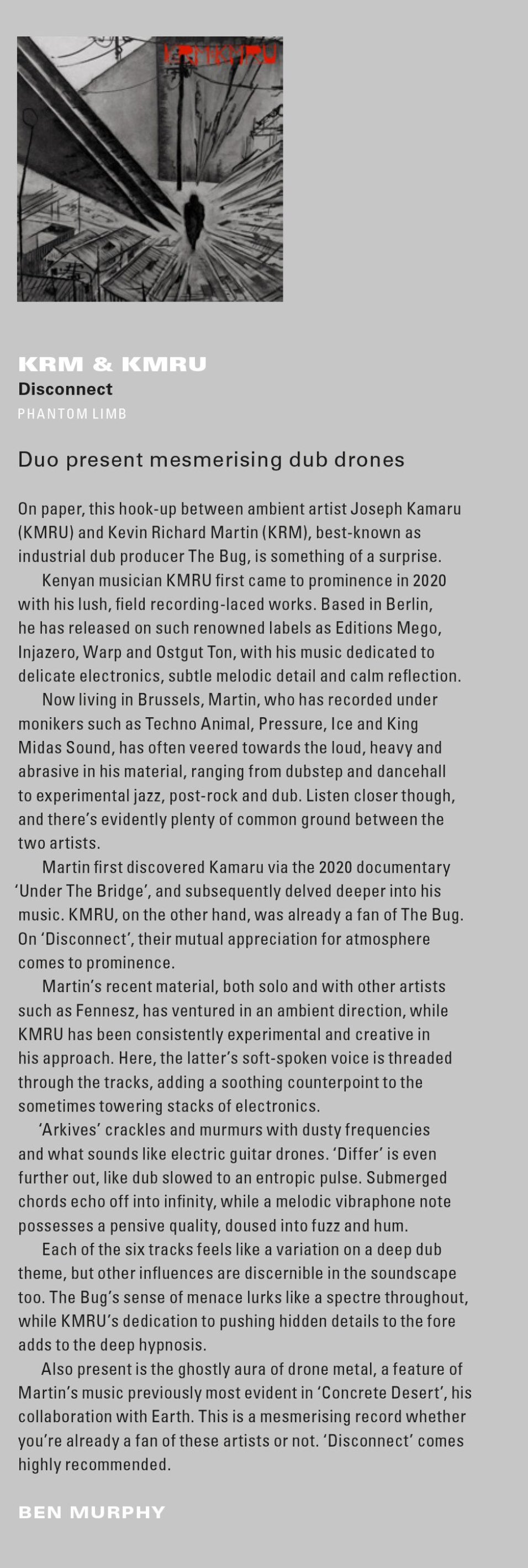



Kevin Richard Martin (AKA The Bug) and KMRU collaborate on new album, Disconnect

Kevin Richard Martin (AKA The Bug) and KMRU are releasing a collaborative album.Out on June 14th through Phantom Limb,
Disconnect is an exploration of dread, hope and profound sonics. The LP combines dub and ambient with KMRU's vocals, which Martin described as possessing a captivating, lilting, tonal quality."
"
The album originated from an exploration of a text I wrote during my sound art studies, delving into the complexities of otherness, said KMRU. The project served as a response to Audre Lorde's idea that differences should be embraced as a dynamic force within humanity, rather than a perceived threat."
Disconnect follows Martin's run of Machine EPs. He'll also play at Berlin venue Gretchen on April 20th. KMRU's last release was September's Dissolution Grip. He has gigs in Bristol, Sheffield, Manchester and Glasgow scheduled for next month.
-
Minimal Collective
Nurturing sonic worlds: potentials of field recording with KMRU
‘”I think there's always this force exerted from sound that goes beyond what the sound is in itself.’ That same force drives our conversation with KMRU in which we discuss how sound tickles our memories, our idea of home, and our urge to move. The Berlin-based artist contemplates the musical tapestry that ties together our experiences, thoughts, and dreams.”

HEAVY CALMNESS – AN INTERVIEW WITH KMRU

KMRU
Stupor
How does Joseph Kamaru do that? With "Dissolution Grip" the Kenya-born, Berlin-based artist recently released an outstanding ambient album, and the new LP "Stupor" is also convincing. On only three tracks, which all exceed the ten-minute mark, he carefully expands his idea of the genre, how could it be otherwise. KMRU does not need an acoustic sledgehammer to overwhelm. His tracks are constantly, but hardly noticeable, gaining in energy without making senseless noise. The volume that the 18-minute title track reaches after just a third of its playing time has its purpose. Through her and in her, the music unfolds its force, which this time has a more sacred coat of paint than ever.
The foundation of the three pieces is an almost endlessly long drone, on which different elements shoot transversely or submit to the most delicately overmanned river possible. The opener "CPR-12" is reminiscent of works by Eluvium, which contrast sound walls, as large as life itself, with lovely sounds and samples - in this case Christmas-like sound swabs and children's voices. But that's only half the truth: Towards the end, the track changes, and the mood tilts into the morbid, also thanks to the samples that now play on the Hauntology keyboard. On "Even A Tear" the almost familiar lead drone peels from bass white noise. Also here, as always, with a successful outcome.
KMRU US TOUR 2024
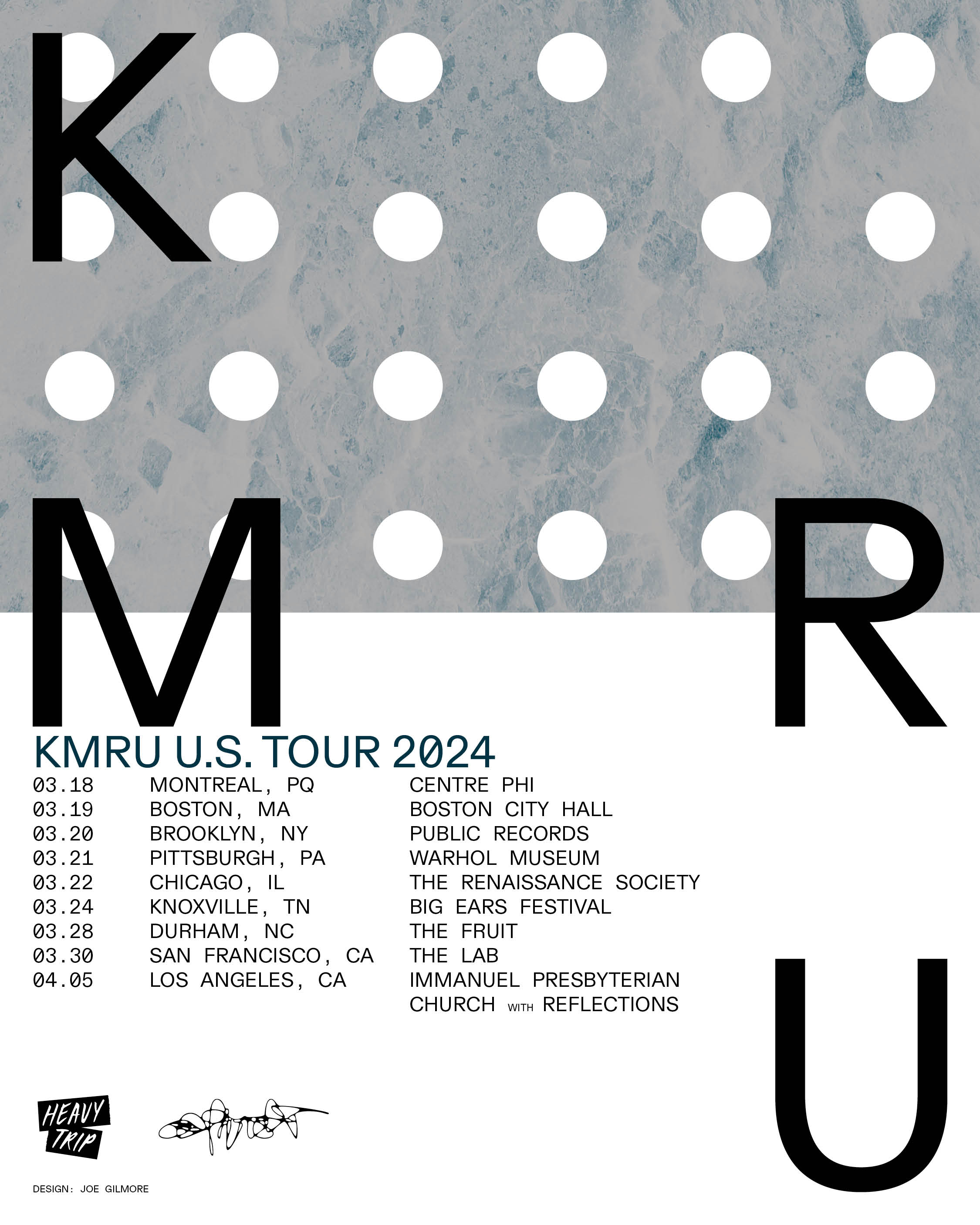
ACL 2023 ~ Top Ten Drone
KMRU ~ glim
On glim KMRU deploys austere melody and the richness of texture playing with everything from strings to piano, comfortable with both scraping dissonance, and gentle hum. There’s a lot to feel with on glim as the artist experiments with a wider dynamic range and a more diverse array of sonic textures than on earlier solo albums such as last year’s Epoch. There is delicate beauty here but it is often threatened, whether by timbral effects such as a drone’s warbling or wavering, by piercing volume, or by the multiplication of sonic layering and crushing volume. A sense of place too, a real sense of place, is threatened by technology on this album, its ability to manipulate and fabricate, to overlay and overlap. The limited play with field recording across a quite noisy and sonically dense album might perhaps be interpreted then as an acknowledgment of the perennial threat that someday we ourselves may not be able to locate the natural. (Jennifer Smart)
ACL 2023 ~ The Top 20 Albums of the Year
5) KMRU ~ glim
We’ve been fans of KMRU’s work since before the release of his breakthrough Peel (2020), and have happily watched his reputation grow with each subsequent release. While he has increasingly embraced the synthesizer, field recording remains the core of his practice. Even if Dissolution Grip, released just a few months ago, features no audible field recordings, Kamaru still interpreted the waveforms of selections from his archives as graphic scores for compositions. But glim, released at the beginning of the year, finds the Berlin-based Kenyan artist continuing his delicate fusion of ambient field recordings and meandering synth tones, to great effect. Avoiding the cliches of both practices—no water or bird sounds, no bleeps or bloops—KMRU continues to grow as a composer. Like the album title, all but the final track consists of one word titles, offering a poetic but mostly inscrutable glimpse into the meaning lurking behind the aural scrim. Full of delicate textural manipulation and dynamic arrangements, glim continues to reveal new aspects on each subsequent immersion within its confines. (Joseph Sannicandro)

Finding Resonance: artists Arman Nouri and KMRU on power, sound and practices of listening
Berlin-based musician Joseph Kamaru — a.k.a. KMRU — has been described as an artist who draws from a rich experience of listening, in response to various global and emotional contexts. Arman Nouri — a London-based artist and half of Kin Structures — has been experimenting with programming sound-based events to gather people together, building political and community resonance. Their conversation reflects a rich reflection of and between their respective practices, exploring the potentials of sound in space.
-

The Best Albums of 2023: Essential Releases

Nairobi-born, Berlin-based artist Joseph Kamaru (aka KMRU) has an academic approach to sound. This tendency beams especially bright on Dissolution Grip, which is the first release on his new label, OFNOT. The record emerged as a product of his endeavors in Sound Studies and Sonic Arts at Universität der Künste. Across three sprawling pieces, KMRU twists the waveforms of field recordings into melodic tones, causing organic textures to feel synthetic and alien. Dissolution Grip contrasts searing dissonance and raw beauty in mesmerizing fashion.
Quietus Albums Of The Year 2023
56. KMRU – Dissolution Grip

The Kenyan artist plays with the very fabric of sound itself on his new record of powerful, sometimes serrated ambient and drone music.
Dissolution Grip Review
“Powerful ambient that creates great things from simple means - arching dynamic changes, long-drawn tones, serious dramaturgy.“ - HHV Mag

Pitchfork DIssolution Grip

The prolific Kenyan-born, Berlin-based electronic musician departs from his typical use of field recordings, but environmental sound still makes its mark on his immersive, long-form explorations.
THE WIRE : 477
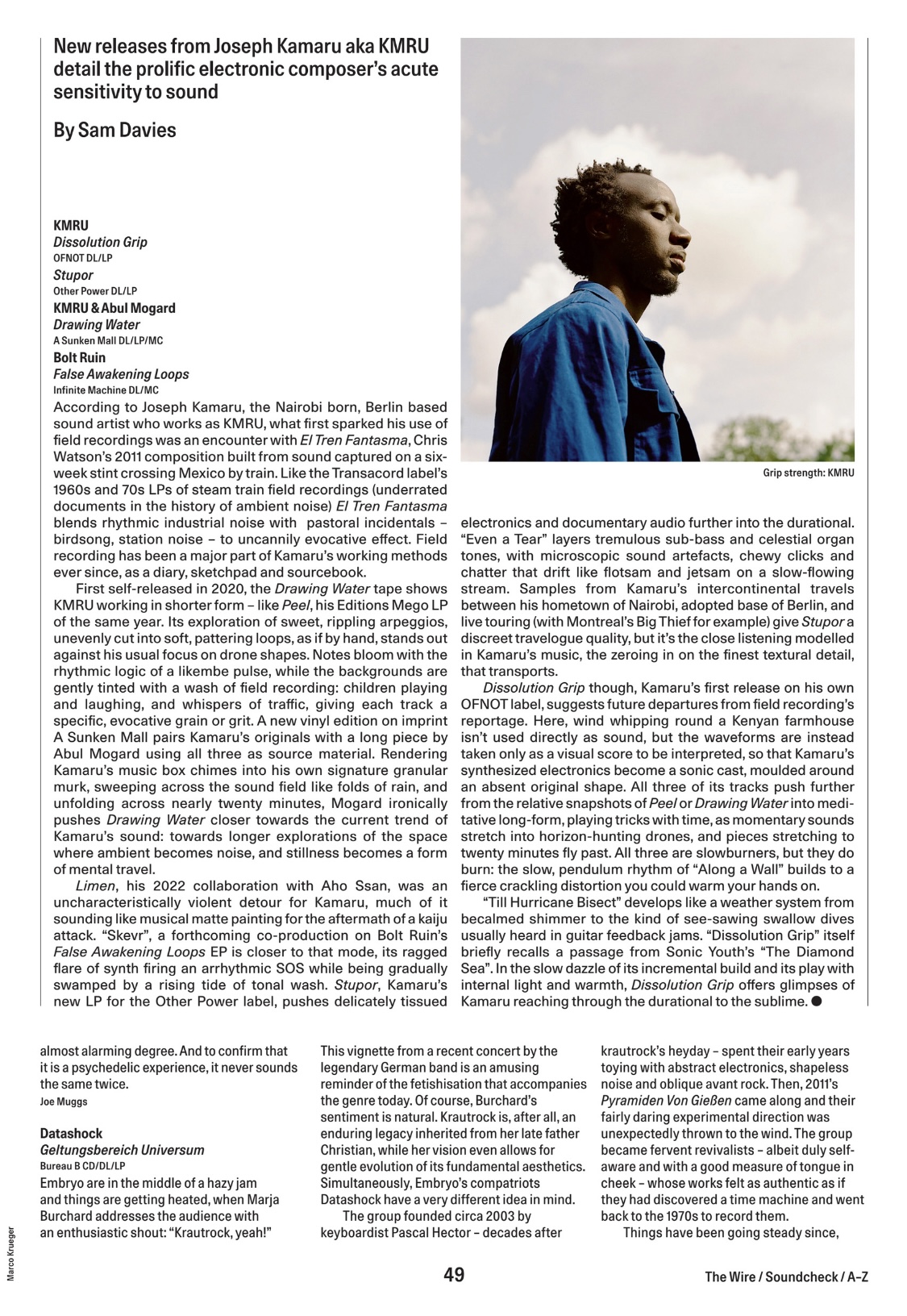

ALBUM OF THE DAY
KMRU, “Dissolution Grip”
a record by a musician masterfully bending a myriad of influences to his will.“
LOUD&QUIET
KMRU: Dissolution Grip
(OFNOT)
Dissolution Grip exists outside of time and place, while deep inside them both. As might be expected given his back catalogue, each of the sounds on KMRU’s latest project started as a location-specific field recording, but were ultimately sculpted and retooled in the image of an orchestra, giving up their origins in the pursuit of beauty.
Invité : KMRU

KMRU Launches Label with New Album'Dissolution Grip' LP is scheduled for September 29 release.

We round up 15 announcements from the last few days.
KMRU - Dissolution Grip
Label: OFNOT Release date: September 29th, 2023KMRU announced the first release on his new label, OFNOT, this week, and also revealed a new project on Finnish label Other Power.Stupor
Nairobi-born Berlin-based sound artist Joseph Kamaru, aka KMRU, shares his new work Stupor on the new Helsinki-based label Other Power. Commissioned by the Helsinki curatorial and commissioning agency PUBLICS, Stupor is comprised of three original long form tracks. The tracks on the album are speculative notes to social architectures and environments the artist has traversed.
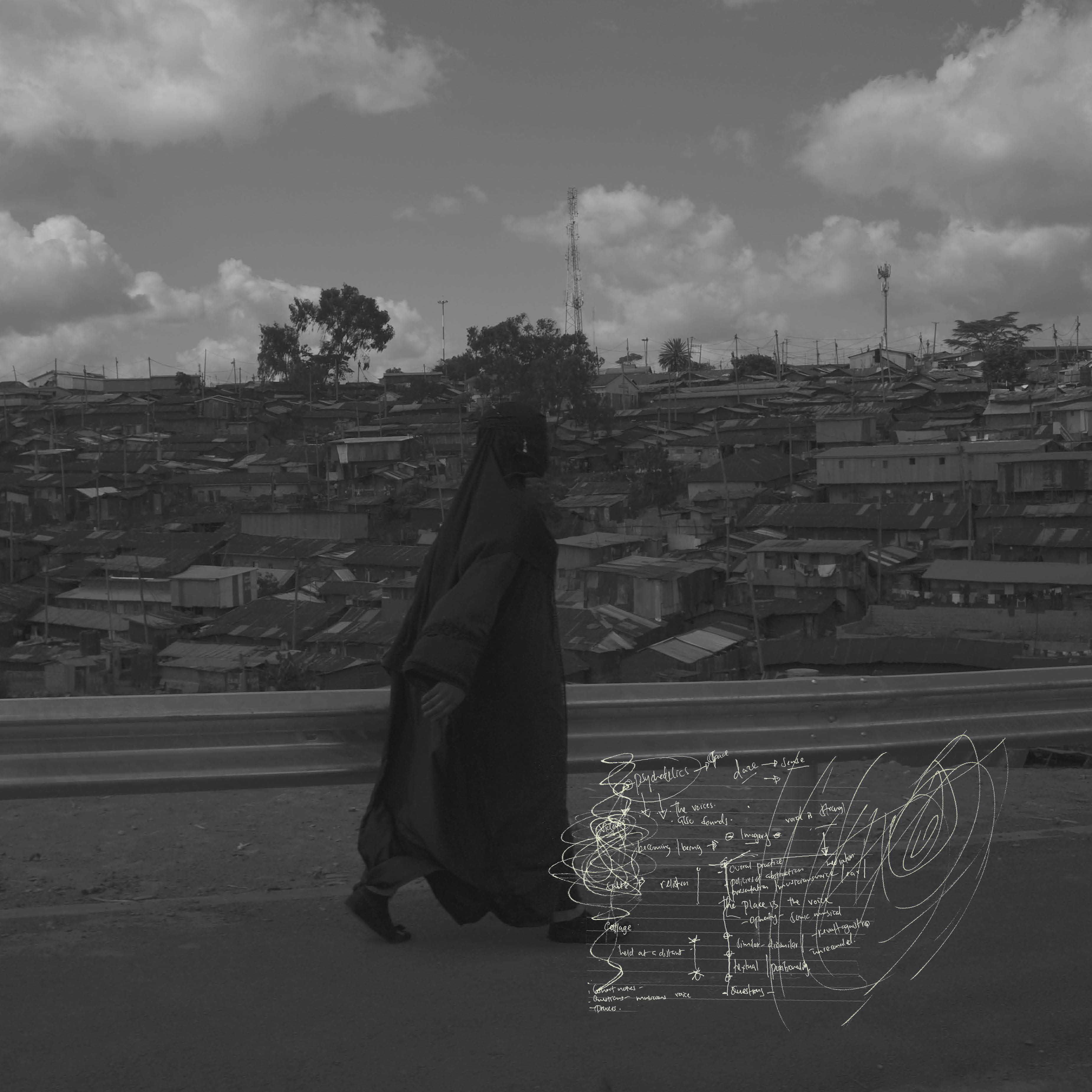
Composed by Joseph Kamaru
Mastered by Stephan Mathieu at Schwenbung Mastering
Original photos & artwork by Joseph Kamaru
OBI Design (Publics identity presence) by Valerio Di Lucente
Design by Matti Nives
Co-produced by Performa / PUBLICS / Other Power
-
Dissolution Grip
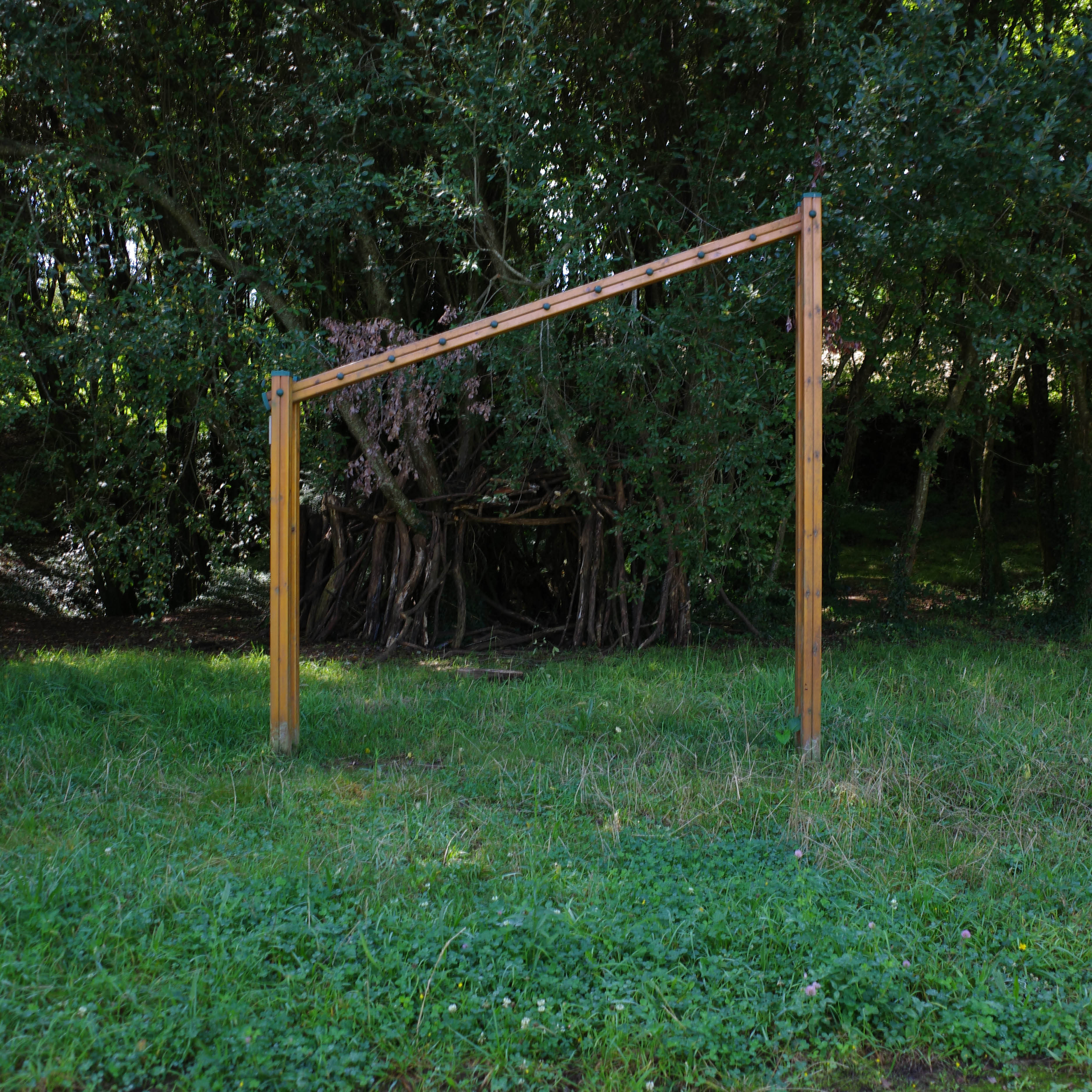
“Dissolution Grip' expands at its own pace until it's a dense wall of harmony, powerful but never completely overwhelming. It's music embedded with a rich sense of place that informs us of KMRU's past and present, and signals where his musical philosophy might take us in the future. “
Pre Order Lp

Bandcamp / ANOST
Out on 29th September at OFNOT
-
Drawing Water Reissue , W Abul Mogard
Reissue of KMRU's Drawing Water on Vaagner imprint A Sunken Mall - with the original material spanning the first side of the record in remastered from. The original release contained 3 supple works of porous resonance and intimate motion, giving way to a very heartfelt body of work that peers directly into the fabric of the everyday; gestures, movement, conversation, rendered graciously into waveform. For the second half of the record, the label has taped none other than Abul Mogard, who prepared a new piece by reworking various layers from KMRU’s original compositions.
This new 17 minute long piece, tilted 'Drawing Water On Matching Teal Surfaces' is defined by a continuously cascading and deeply resounding solemnness, which, towards the work’s concluding moments, gradually disperses through a subtle downpour of warm pads, delicately rippling through the fabric of the work, before gently dissolving into thin air."
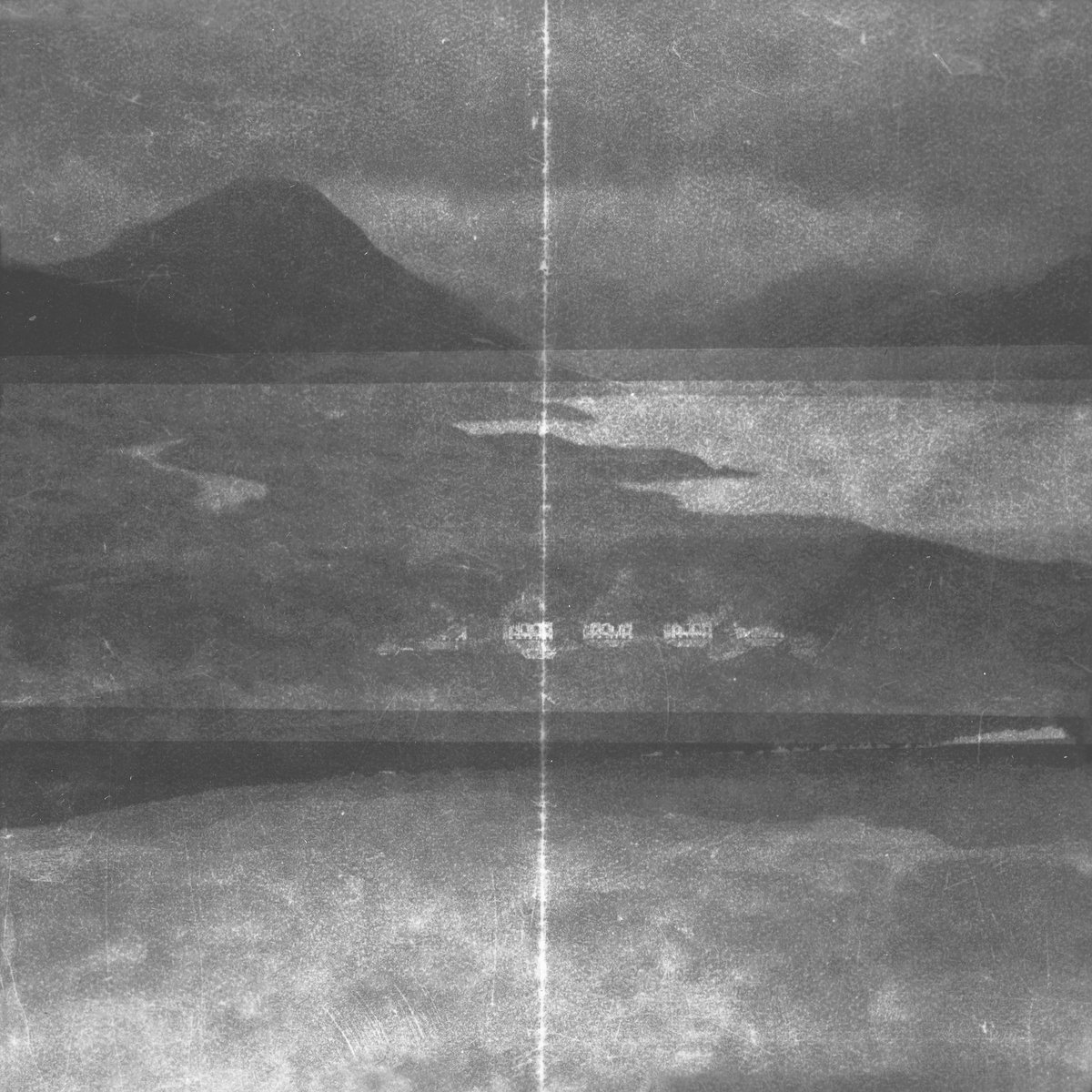

-
Slim Filter
KMRU: Lost in Teufelsberg
-
TEMPORARY STORED, PRIX ARS HONORARY MENTION 2023

“(…) Temporary Stored is nonetheless not a rehashing of European colonial violence—this piece rather uses sound as a conjuring of specters of oral and cultural histories of Central and Eastern Africa.”
KMRU scores EXTANT
EXTANT, ON WHAT IS HIDDEN BETWEEN THE APPROPRIATE AND THE INAPPROPRIATE
Choreographer and associate artist Jermaine Maurice Spivey on Extant,
Five Rewire alumni featured on compilation release Remotely Together
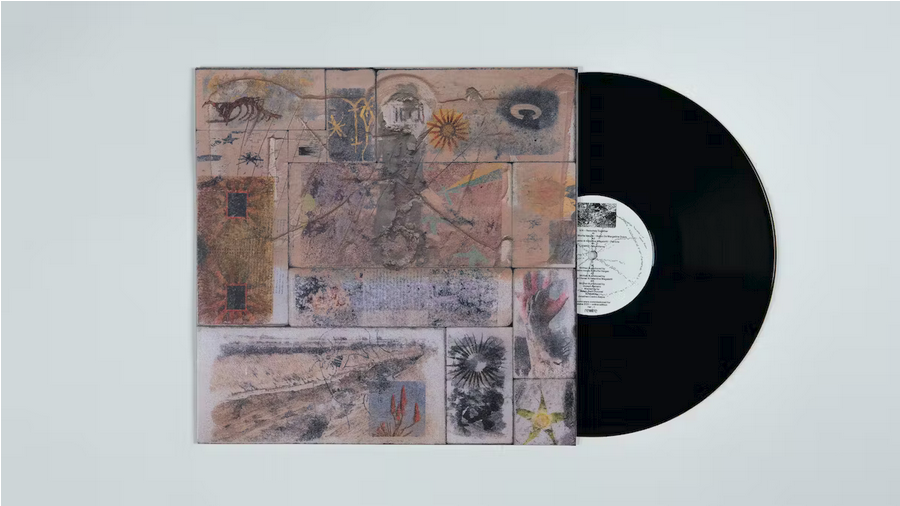
Podcast 799: KMRU
Pensive, drifting ambient.

=
A Closer Listen
Glim Review
glim cassette- Limited Edition

-

Artist Tips: KMRU
The secrets behind the ambient sound artist's work.

Pitchfork Glim Review
This digital-exclusive album from the Berlin-based Kenyan artist sounds blank and unrevealing but opens up to reveal a wealth of detail.
-
KMRU’s continuing exploration of reflective ambient space and sound remained top notch on 2023’s glim, one of the artist’s most subtly varied releases yet. With mastering provided by fellow traveller Simon Scott, the twelve piece collection showcases KMRU’s approach around shorter pieces for the most part, with many only just breaking the three minute mark if not four. The expected combination of cryptic field recordings and serene drones can be found but so can crackling disruption on “strain” and the calmest sense of melody on the striking “orna.”
–
First Floor #162
KMRU “room” (Self-released)
There’s been no shortage of praise thrown KMRU’s way during the past few years, and much of it has focused on the Kenyan artist’s ability to strip his ambient creations down to the bare essentials. Populated with finely tuned microdetails and unassuming field recordings, KMRU’s compositions often have a quiet grace, their meditative beauty determined as much by what he puts in as what he chooses to leave out. That’s still the case on much of his new album-length release glim, but “room” offers a slight deviation, its lithe drones and orchestral swells displaying a kind of sonic stridency that feels like a new addition to his toolkit. It’s not quite as bold as Limen, his volcanic collaboration with Aho Ssan, but given that project’s raw power, perhaps it’s not surprising to see KMRU bringing a bit more muscle to his solo work. “room” is still an exquisite creation, but it’s not something that will unobtrusively loom in the background.
Random and emblematic: The sound of space
by Felicia Atkinson, Büşra Kayıkçı, Carmen Villain, Kuniyuki Takahashi, KMRU and more
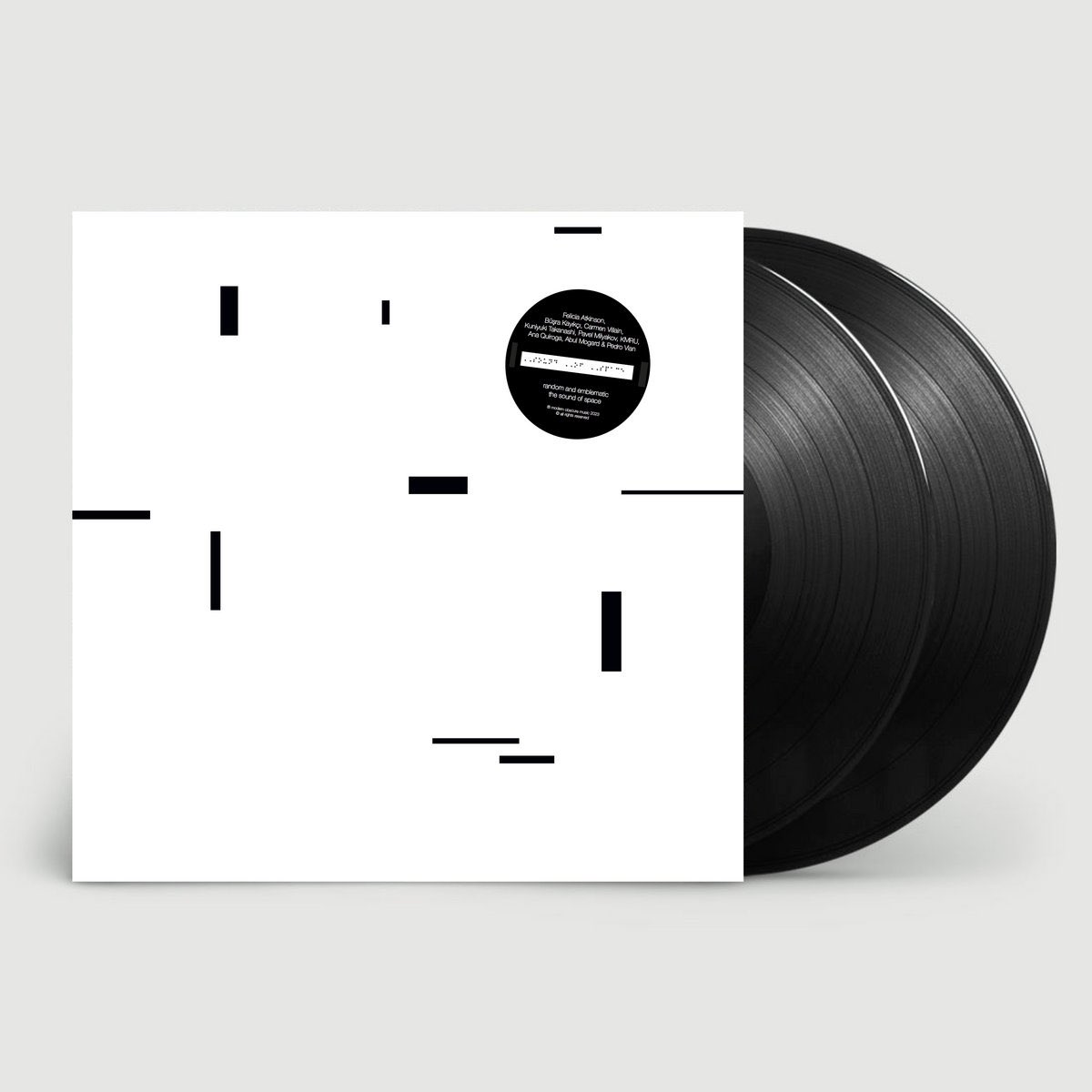
Kamaru’s piece Stretch Mabati’ opens with warm saturated drones, scattered with field recordings and distant clangs of corrugated metal, all the while progressing and expanding outwards. As glitches flutter and intercept the composition, a blissful crescendo is reached, then steadily, the track simmers down, reducing to its core elements to finish.
=
Narrating Environments” A Discussion between Lukasz Polowczyk and KMRU
==
Recently the two artists had the opportunity for a brief chat, pondering the ethics of field recording, the importance of listening, and subliminal nature of familiar sounds.
Fact Mix 893: KMRU & Aho Ssan & Sevi Iko Dømochevsky
Artist Sevi Iko Dømochevsky visualises the kind of catastrophe that KMRU and Aho Ssan make audible in their Fact Mix, one that is painful to comprehend, yet serves as a prescient diagnosis of our present.
-
Subbacultcha: An Interview with KMRU
KMRU listens to cohere with that what’s around. Sometimes as an observant with bare ears, sometimes as a collector, documenting what passes by. KMRU’s re-sculpted collages, big or small, brim with details, props and pieces of decor. They capture reveries of another time, and especially of another place. We spoke with the sound artist and musician about era’s in one life, liminality and slowing down. ‘
-
curation:
V/A -INSHA / Nairobi Ableton User Group
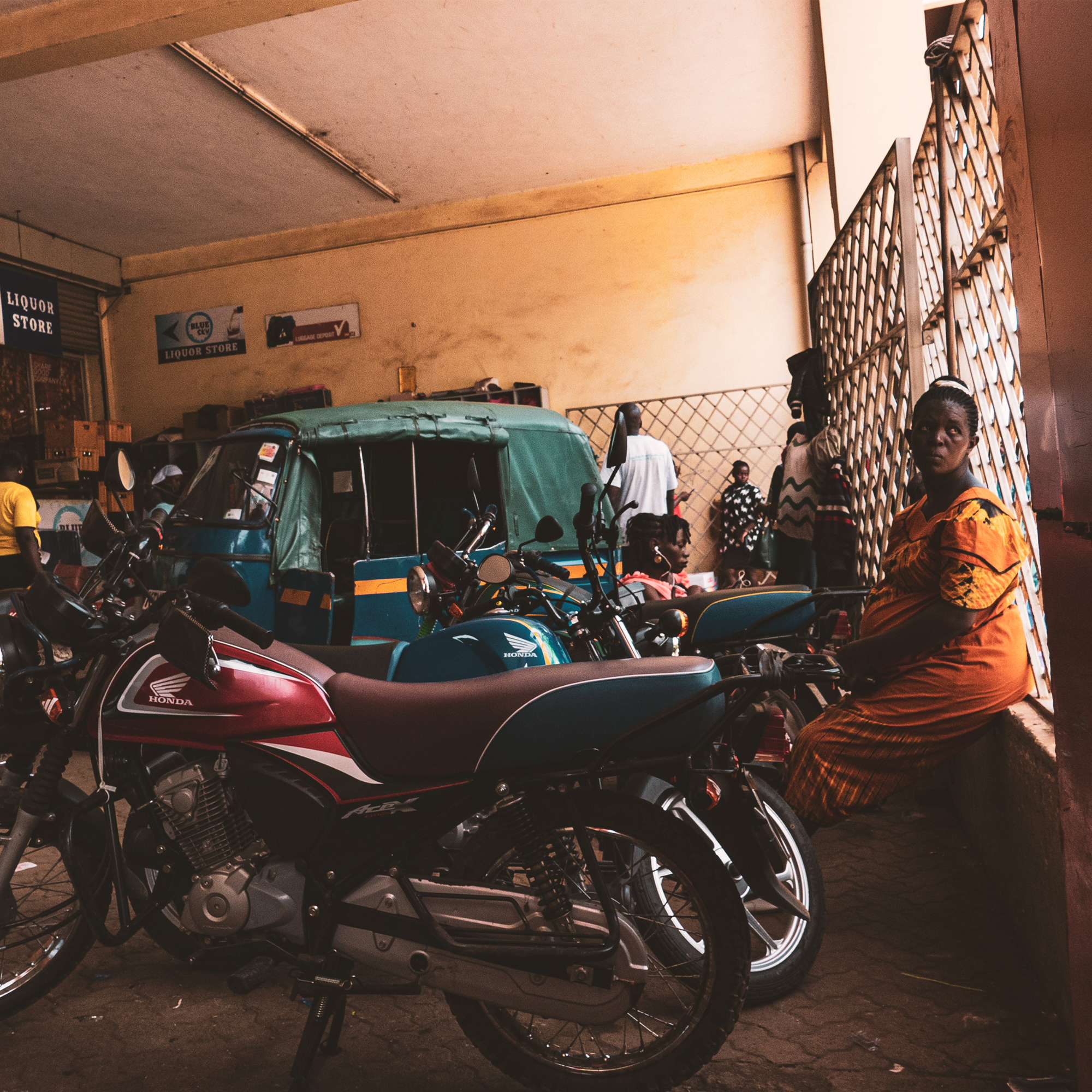
PreOrder Vinyl
ACL 2022 ~ The Top 20 Albums of the Year
KMRU & Aho Ssan ~ Limen (Subtext)
There is nothing like the sublimity of watching a natural landscape transform at the scale of human time. The video for “Resurgence”, the first track of this album, depicts an erupting volcano hauntingly recreating its surroundings. It is a haunting experience simply because what is no longer there lingers, somewhere beneath our sight, as the lava redraws the landscape anew. The music follows suit: it flows, yet grinds, like molten stone; it bubbles with electronic noises and traces the air with hisses and compressed sounds; it fills whatever space you play it in with volume. It is the perfect combination of these two artists’ practices, in terms of ambient and abrasive electronics, an overwhelming and expansive set of pieces that expressionistically builds a listening cycle of creation and destruction. The limen is the border of perception, an idea that crosses the entire album as it grows these masses of sounds — like the lands around the volcano, the music shifts right at the edge of perception, and it is impossible to truly keep in place, to fully process in the moment it happens. It will hit you, after a while, and it will burden you with the weight of the earth as it suffers its demise. Such is the power of Limen. (David Murrieta Flores)
Ransom Note- Silence: A reflection on migration and sound with Emeka Ogboh & KMRU
Kenya-born sound artist KMRU and Nigerian sound artist Emeka Ogboh discuss their respective journeys.

They often say that we are a product of our environment – that our environment is what then influences our perspective, our interests, our sense of self and our creative outlook. However, what happens when that environment changes? What happens when we are emerged in a new environment with different social constructs, different sounds, different sights and different cultural ideologies? Emeka Ogboh and KMRU are both visionary artists based in the city of Berlin, both have worked tirelessly in fierce pursuit of endeavours and projects which challenge and deconstruct the boundaries and sensibilities of art’.
In this conversation the two reflect on the shock they experienced when experiencing the silence of the city for the first time; recount stories of their most powerful installations and the narrative of ‘experimental’ art in the context of African culture.
Boomkat Review: Epoch
Kenyan sound artist KMRU pushes off deep into Berlin skool ambient on a richly layered and empathetic suite on a return to Seil Records, site of his debut album.KMRU follows collaborations with Seefeel, Luke Slater/Speedy J, Echium and Aho Ssan for the likes of Editions Mego and Berghain’s A-Ton, with a bouquet of bittersweet synth meditations that return us to his most intimate side. Doing for ambient electronica what his fellow Kenyan artist Slikback did for techno, KMRU exerts an expressionist angle on the paradigm with a distinctive grasp of texture and tone mirroring aspects of 0PN or Emeralds’ capacity for evoking nostalgia and a sort of fraught sublime, allowing everything space in the mix to breath with an unhurried pace and subtly stressed tang that effortlessly enchants to his slant.
Now a resident in Berlin, KMRU implicitly echoes the spaced-out seduction of Conrad Schnitzler’s early work with Tangerine Dream and Kluster, and later works by Cluster or even Sun Electric, in his navigation of buttons, faders and wires. The silvery grayscale tone and warmth of ‘guise’ sets the mood for a drift between pastoral melodies and field recordings of in pieces’, thru the serenity of ‘luminous beings’ and OOBE-like sensation of ‘resonant sharing’, to his most bittersweet use of texture on the edge of noise with ‘In new fields’. From there the album takes on a more rhythmic impulse with results recalling Lali Puna in mood’, and even more eaze’s puckered suss in ‘other times’, thru to a heavenly airborne waltz titled just’.
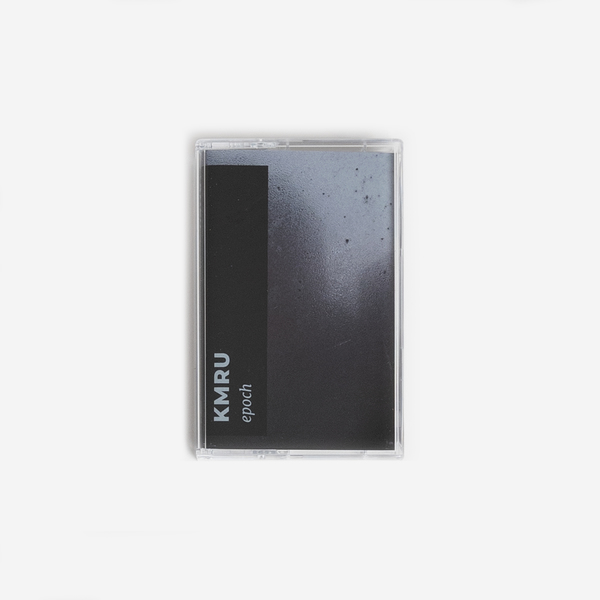
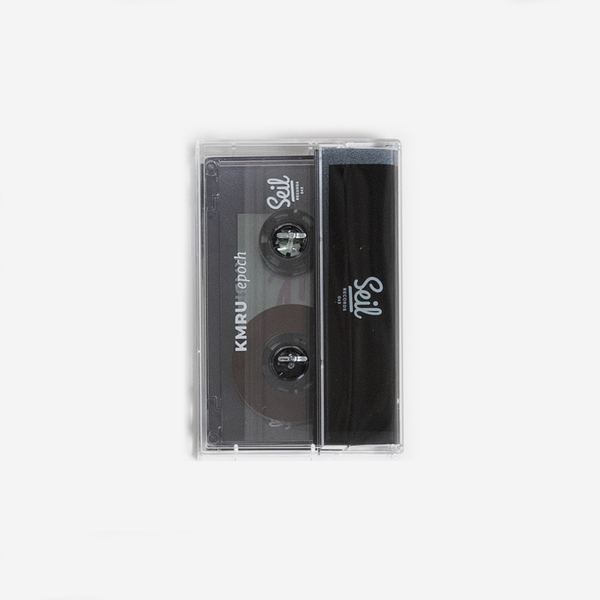
The 50 Best Album Covers of 2022
40. KMRU & Aho Ssan, Limen
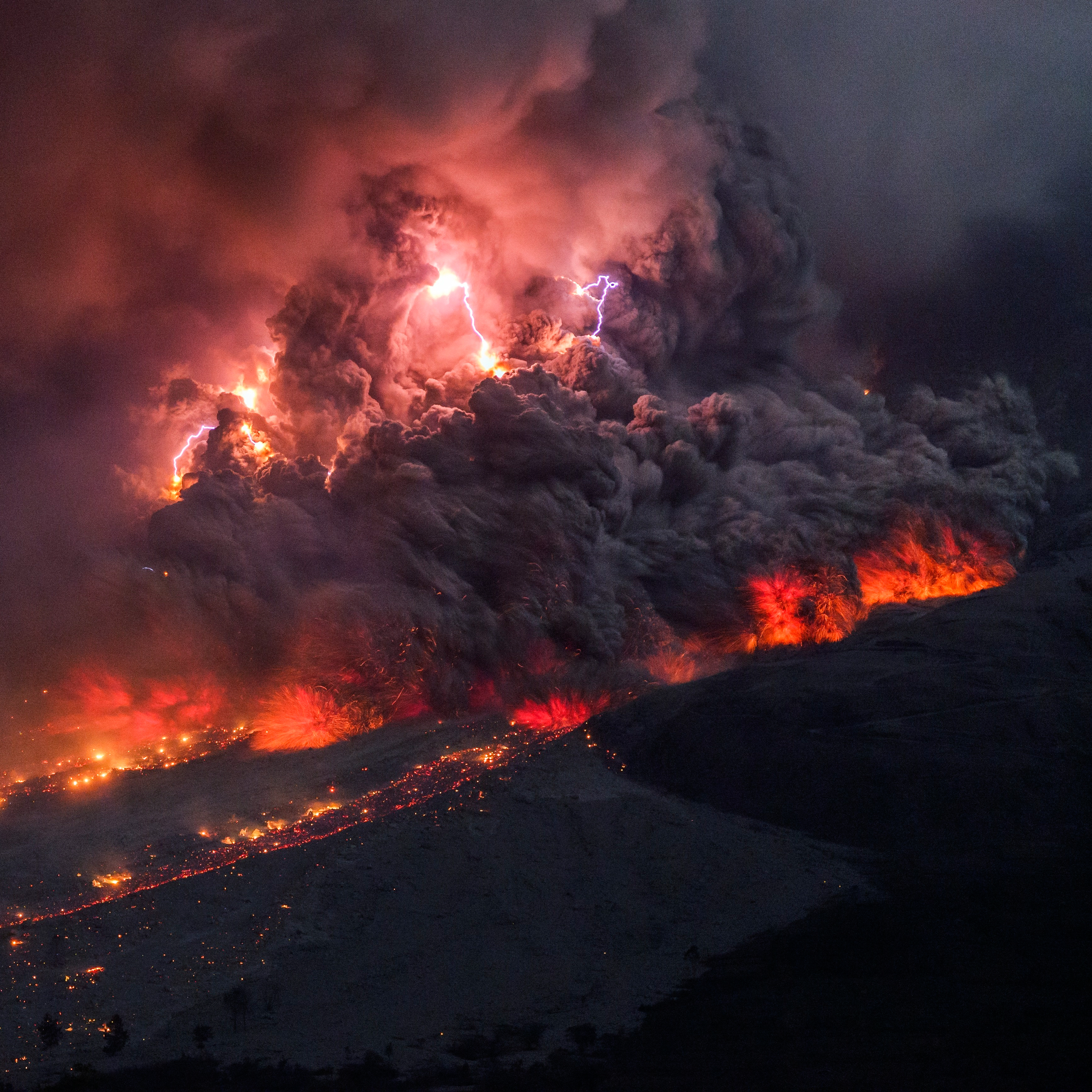
Limen is a fascinating collision of styles. Given Kenyan sound artist KMRU and French electronic musician Aho Ssan’s normally divergent approaches to minimalism – contemplative ambient and chaotically abrasive deconstructed club, respectively – you would expect the duo to try to find an effective middle ground. Yet what they describe as a seamless back-and-forth led the two artists to push themselves to new extremes, and the resulting album reaches the sort of gracefully volcanic intensity that its cover beautifully exudes. “For the cover of Limen we were looking for an image that mirrored and expressed the sense we had of our collaborative working process,” Joseph Kamaru told us. “The image, by Martin Rietze of Sumatra’s Sinabung erupting in 2014, expresses various materials and elements — stone, air, lightning, cloud, and pyroclastic flow — that are driven into synchronization by geologic forces as one dynamic process in which everything becomes a single organic and explosive moment, transcending its constituent elements.”

Kenyan Sound Artist KMRU’s New Album Emerges from a Desire to be Grounded
'epoch' LP is available now.
KMRU - epoch
Seil Records
For his follow-up to 2020's acclaimed Jar, Berlin-based Kenyan sound artist Joseph Kamaru realized he needed to reflect on just how much had changed in two short years. Even aside from the obvious global disruptions, Kamaru's life had changed completely: a move to a new continent, a sequence of fresh creative projects (including work with Paris's Aho Ssan and Manchester's Echium) and tours with Big Thief and Fennesz inspired Kamaru to think a little differently about his creative expression.
Written in Spring 2022, epoch emerged from a desire to be grounded. Constant touring had left Kamaru with a desire to slow things down to sooth some of the emotional intensity of continual movement - something he'd never realized he had the strength to endure. It felt fulfilling for him to be back in Berlin for a while, so he channeled this energy into the technical challenge of getting to know a brand new synthesizer - the Sequential Prophet REV2 - that's responsible for the majority of the sounds on the album. Secluded in his home studio, Kamaru dubbed synth sounds on the fly using pedals, looping and layering, then filling out the tracks with field recordings captured while on tour in the USA.
It was effortless, he explains. The album finished itself. Kamaru had been listening obsessively to iconic American synth trio Emeralds which motivated him to explore pure synthesis: to build sounds from scratch and form his music in a more holistic, emotionally connected way. Grateful for the experiences he'd managed to have while traveling and meeting new people, epoch his way of unravelling these feelings in slow-motion. From the gently saturated opening notes on 'guise', there's a feeling of tenderness that's impossible to ignore. The faint rustle of human beings in the distance - laughing, talking - reminds us of the world outside, while deep, brassy harmonies sooth the soul.
Unlike Kamaru's explosive, noisy collaboration with Aho Ssan -Limen, epoch is an exercise in restraint and control. While he's influenced by the synth music canon, Kamaru uses these colors to paint his own unique landscape, broadcasting a story that's steeped in experience, movement, and careful observation. Tracks bleed into one another like dye in water, and the record takes on a dreamlike quality - explaining it is difficult, but feeling it is profound.
text: john twells
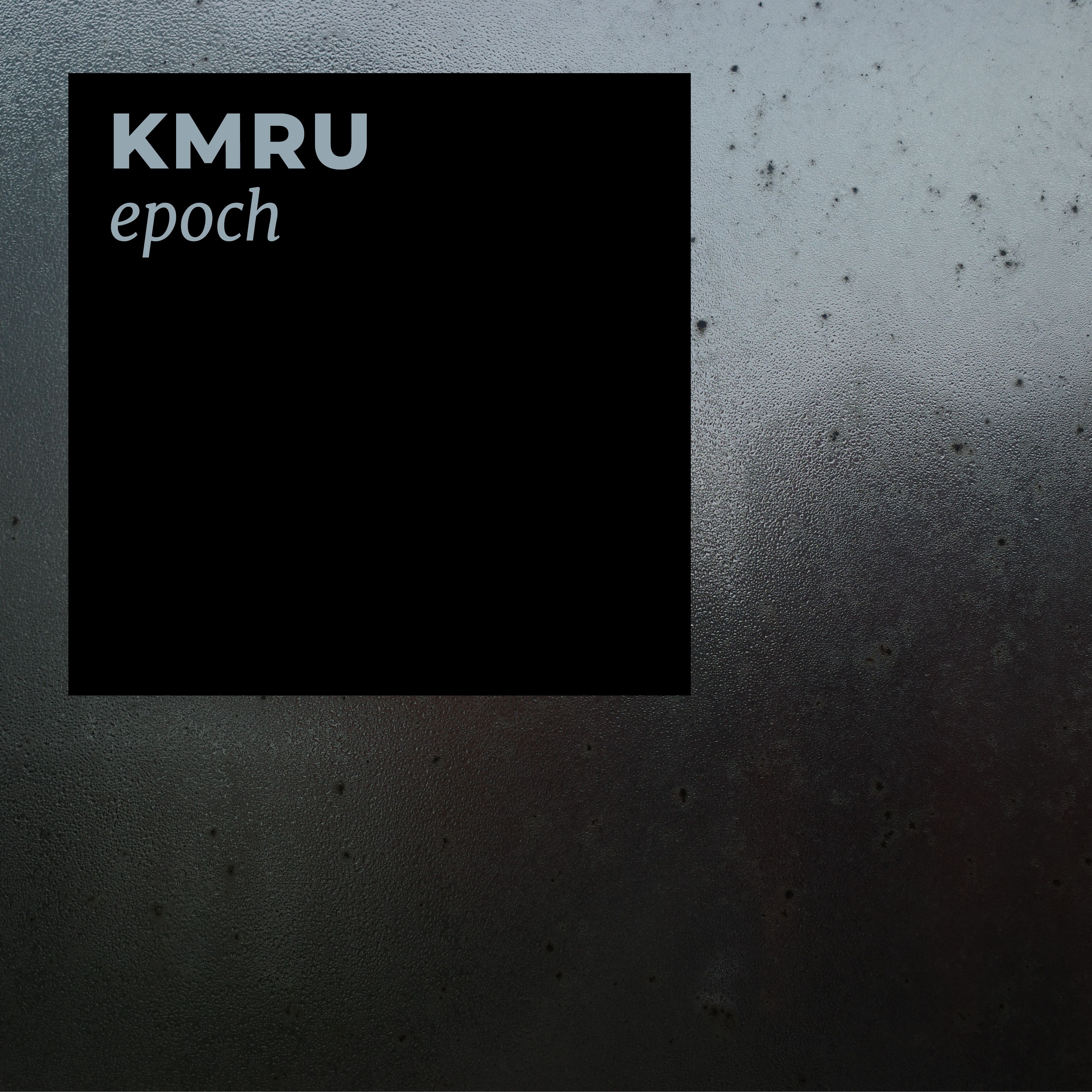
KMRU “mood” (Seil)
Kenyan producer KMRU rarely lets more than a few months go by without sharing new music—most of it excellent—but epoch is his first new solo album in quite some time. (It’s also currently available as a name-your-price download on Bandcamp.) Dealing heavily in gentle drones, soft melodies and elegant field recordings, the record should further solidify his position as one of ambient music’s most thoughtful and talented figures, and hits a particularly high note on “mood,” a song which impressively finds serenity amongst a pulsing tone (that honestly recalls an old-school busy signal) and what sounds like rustling paperclips.
-
Burberry x KMRU
Festive Gifting campaign 2022
sync:
Track: Matching Teal Surfaces
Artist: KMRU



Selections: KMRU

In this series, Selections, we invite DJs, producers and label heads to dig into their digital crates and share the contents of their collections. This week, KMRU spotlights blissful synths, tactile guitars, streetscape sound design, indie rock and more.

RA unveils full details of limited-edition birthday book, Sacred Spaces
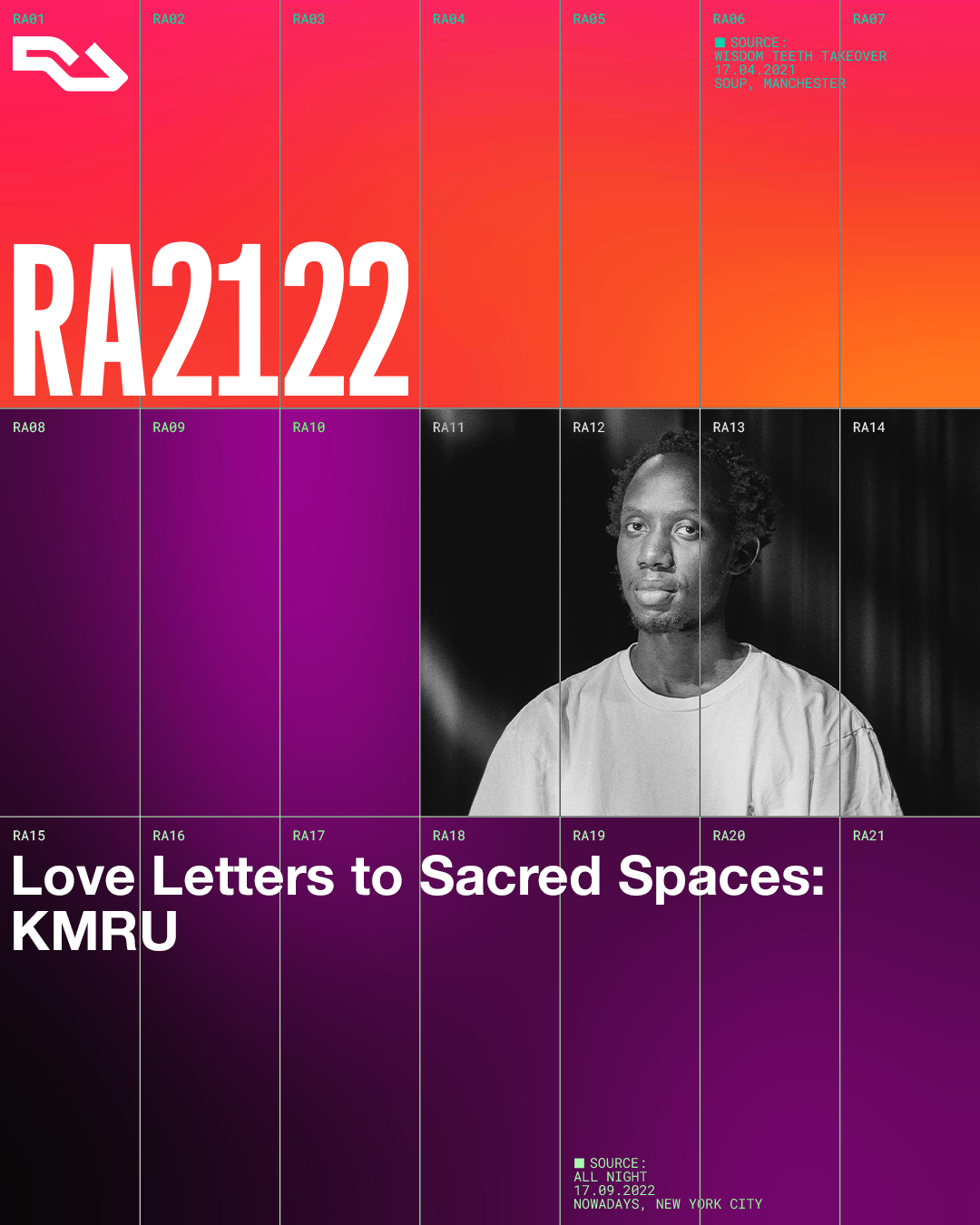

Bandcamp Navigator, November 2022
KMRU
Temporary Stored
The second track of Kenyan ambient artist KMRU’s latest album “MR1” starts off in a way that is similar to The Orb’s “Into the Fourth Dimension,” one of the more abstract pieces on The Orb’s Adventures Beyond the Ultraworld. The elements are all there—looped samples of people speaking, field recordings, a mix that rushes from left to right in a way that is almost dizzying if you’re listening in headphones—but KMRU’s work slowly, subtly, begins to change this formula. Instead of staying low-key, floaty, and mesmerizing, it slowly adds more, louder sounds to the mix, causing one’s mind to have to do a little work to keep up. It’s, frankly, exhilarating in a way that ambient music, usually by intent, rarely achieves. That’s the theme for all of the tracks on this spectacular album. The elements of these songs—chants, rumbling synths, news reports, the occasional kalimba—all vie for center stage. Somehow, it’s never chaotic. KMRU is adept enough at his craft to ensure that the components of his work are never fighting each other for attention. Rather, they’re all boldly asserting themselves and working together to create a result greater than its parts—an album that is fresh, mysterious, and infinitely compelling.

BERLIN ATONAL X CYPRIEN GAILLARD PRESENT: A GREAT FALL, Palais de Tokyo.
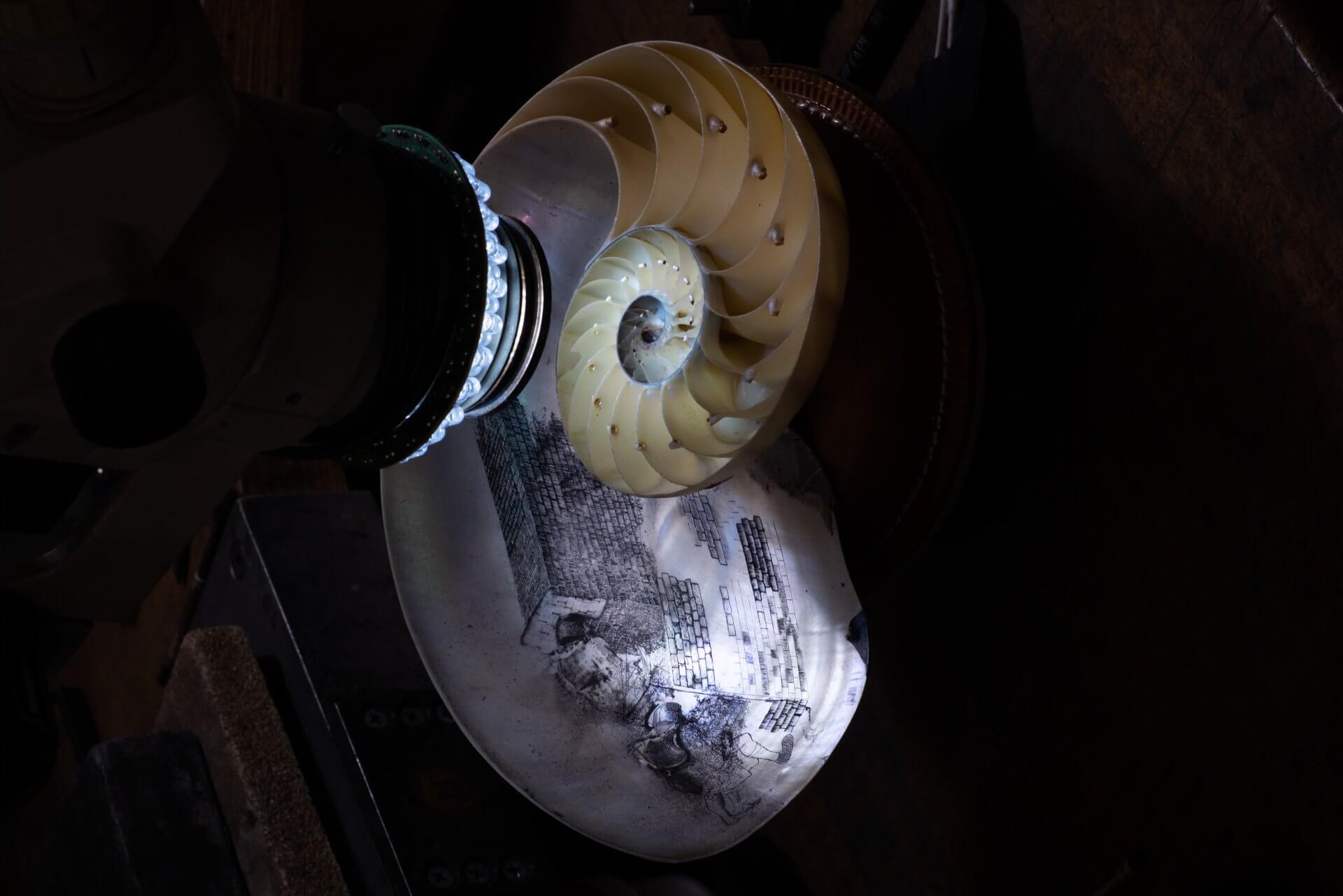
For the exhibition HUMPTY DUMPTY, Cyprien Gaillard and Berlin Atonal make a new collaboration. Together they have invited a lineup of special artists to use the medium of the dub soundsystem as a way of transforming the entire museum space into a new kind of echo chamber for one night. The heterogeneous line-up brings together legendary experimental drum and bass pioneer Krust and Kenyan soundscape experimentalist KMRU, Rhythmic sorcerer Nkisi and Mellowdramatics from the London-based Black Obsidian Sound System.

KMRU - don't linger they might see you
An unsettling homage to the mysterious nature of dreams from the Berlin ambient music star.
]
As KMRU, the Nairobi born, Berlin-based producer Joseph Kamaru has experimented with many different strains of ambient music. He's currently pursuing a masters degree in Sound Studies and Sonic Art, and it's not hard to pinpoint the impact that this academic approach to contemporary composition has on his work. Where the July LP Temporary Stored used field recordings to grapple with themes of colonialism, his new single, "don't linger they might see you," is more eerie and esoteric. Contrasting found sound samples with periods of quietude, it's inspired by the surreal realms we visit in our slumber. Over the course of 32 minutes, staticky field recordings underline subdued synth tones that morph from bassy drones to metallic, trebly pads. The sprawling piece evokes absorbing a scene in a horror movie without ever turning towards the screen.
Courtesy “Night Journeys III (KMRU Remix)” (Kulør)
DJs will undoubtedly reach for the high-octane reworks that populate much of Courtesy’s new Night Journeys Remixes EP. Those unconcerned with revving up the dancefloor, however, can luxuriate in KMRU’s spacious take on “Night Journeys III,” in which the Kenyan ambient specialist stretches the song’s reverberant guitar tones across a moonlit night sky, ultimately sounding something like a ’90s slowcore band playing on the surface of the moon.
-
Visiting Artist KMRU at Un-Writing Nature
Center for Arts, Design, and Social Research
The Center for Arts, Design, and Social Research (CAD+SR) is delighted to announce that Joseph Kamaru, aka KMRU, will be a Visiting Artist at Un-Writing Nature II, an intensive research residency and workshop to be held at the historic Villa Pianciani, Spoleto, Italy, September 27 - October 4, 2022.
-

MOS DEF, KMRU, MAKAYA MCCRAVEN, MORE FEATURE ON SOUNDTRACK FOR NEW NETFLIX DOCUMENTARY, CIVIL
Netflix has unveiled the soundtrack credits for its new documentary, 'Civil: Ben Crump'.
Among the artists whose music features on the film are Mos Def, KMRU – with two tracks from his 2020 album 'Jar' – Makaya McCraven, K-Ci & JoJo, and Bobby Womack.
The documentary itself focuses on the life and legacy of American civil right attorney Ben Crump, who has represented the families of George Floyd and Breonna Taylor, Black victims of police brutality in the US.
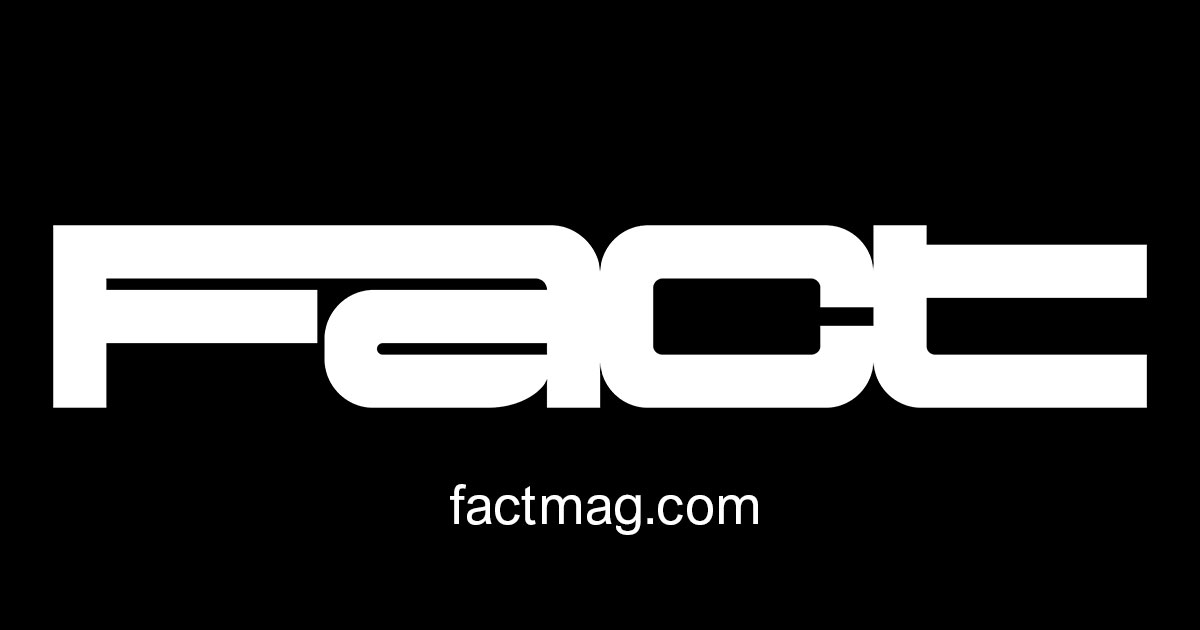
KMRU & Aho Ssan erupt in post-apocalyptic extremity with ‘Resurgence’
An explosive edit from Limen, the first collaborative project from Kenyan sound artist Joseph Kamaru and French electronic composer and producer Niamké Désiré.
A tale of two Kamarus
Two musicians bore the name, Joseph Kamaru, a grandfather lost to time and a grandson in the midst of his destiny. Here’s the story of the Kenyan folk titan and his ambient composer grandson, what they share and the weight of legacy. Interview.

__
Acid Test: April 2022
KMRU & Aho Ssan
Limen
Listening to Limen, the cataclysmic debut album from KMRU and Aho Ssan, is like watching something beautiful burn to the ground. Over recent years, both of these sound artists have released defining work while taking very different approaches. The Berlin-based Joseph “KMRU” Kamaru’s gorgeous ambient pieces typically begin as field recordings, often taken from his home in Kenya or around other regions of East Africa. Meanwhile, the Paris-based Aho Ssan (aka Niamké Désiré) is best known for building virtual instruments and dense Max/MSP constructions like 2020’s Simulacrum. On Limen, their approaches connect like a spark hitting dry brush, leaving hellfire in its wake.
The pair draw influence from the anime Akira (1988), and just as that classic film sets deep character dynamics against the sprawling backdrop of a global apocalypse, Limen’s three tracks maintain an intimate focus amidst an epic scale. Through body-shaking blasts of sub-bass, surges of electronic noise, and ghostly slivers of melody, opener “Resurgence” creates a storm of disorienting sound without ever letting you lose sight of its tragic, emotional pull. The brief, cathartic centerpiece “Rebirth” burns at the album’s core before setting up “Ruined Abstraction,” a sprawling 21-minute closer whose gentler sonics offer no respite—only images of embers, ruins, and ashes. An operatic voice appears in the final moments, but it’s hard to tell whether it’s there to offer a glimpse of hope, or simply an elegy. That answer may be left up to the listener, but the path Limen takes to even reach that question is a journey worth experiencing. It is one of the year’s most powerful albums.

KMRU and Aho Ssan Announce New Album Limen
Sound artists KMRU and Aho Ssan have announced the collaborative album Limen. The record is out April 29 via Subtext. Below, listen to a preview of the album’s first song “Resurgence.”

KMRU AND AHO SSAN COLLABORATE ON NEW ALBUM, 'LIMEN'
Titled 'Limen', the album takes in three tracks, one of which totals 21 minutes. It's the first studio collaboration from the two artists, following a previous live link-up at Berlin Atonal. KMRU has also remixed Ssan's tracks 'Outro'.
The album is said to be inspired by various global changes that occurred amid the COVID-19 pandemic, and is on the noisier side compared to the respective artists' usual solo material. Ssan is quoted in the press materials as saying he's "never made something so extreme" as the 21-minute cut 'Ruined Abstractions'.
You can check out an excerpt of 'Resurgence', one of the album's three cuts, below. It will be released through James Ginzburg's Subtext label on 29th April.
-

The LP is out April 29th via James Ginzburg's label, Subtext Recordings.
KMRU and Aho Ssan have linked up for an album on Subtext.Spanning three tracks, one of which clocks in at 21 minutes, Limen is the first studio collaboration from the two artists, following a performance at Berlin Atonal and a KMRU remix of Ssan's track "Outro." James Ginzburg's label will release the LP on April 29th.Inspired by global shifts during the pandemic, Limen is noisier and more intense than either artist's solo work, particularly KMRU's minimalist ambient. According to Ssan, he has "never made something so extreme" as the extended album cut "Ruined Abstractions."
-
Limen : KMRU & Aho Ssan
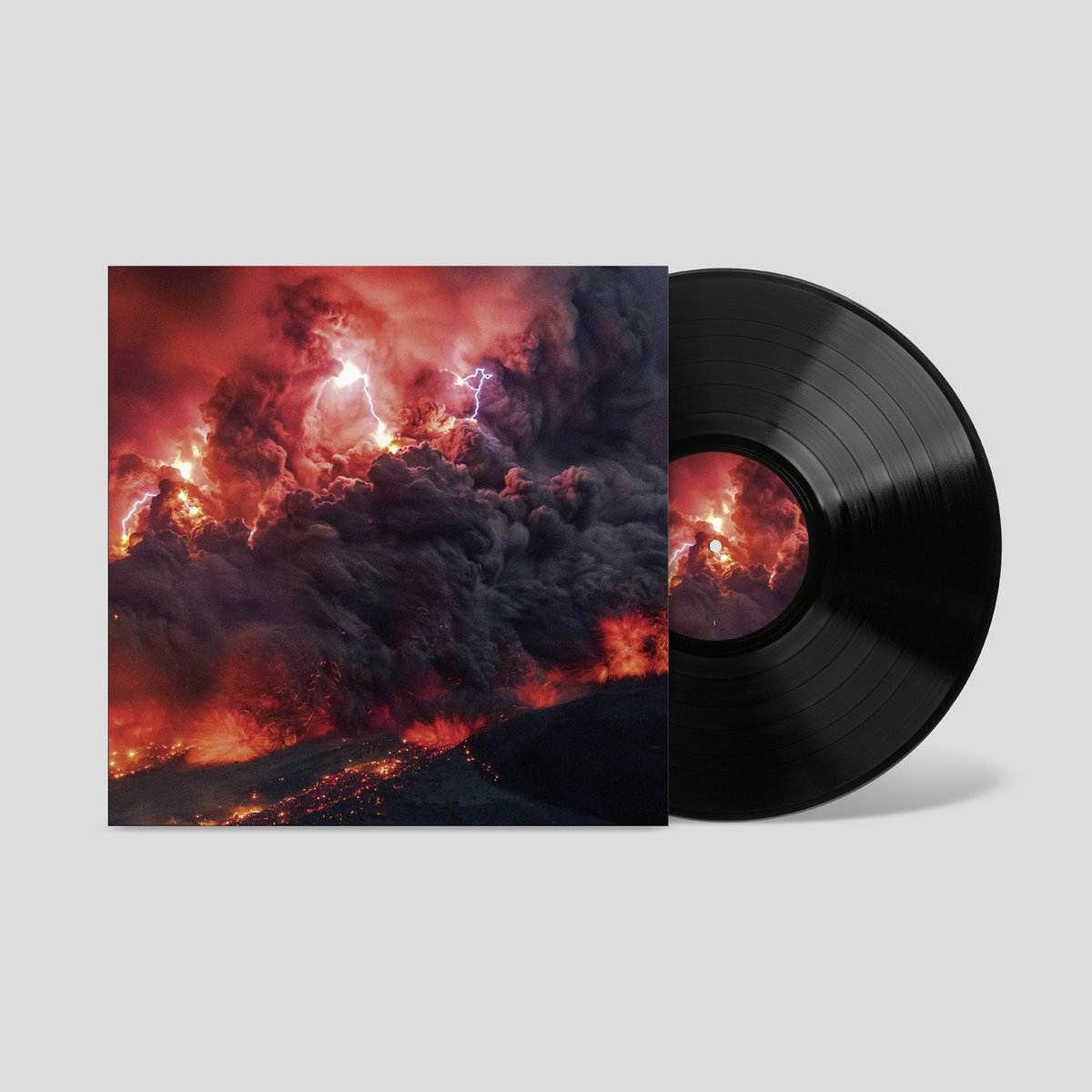
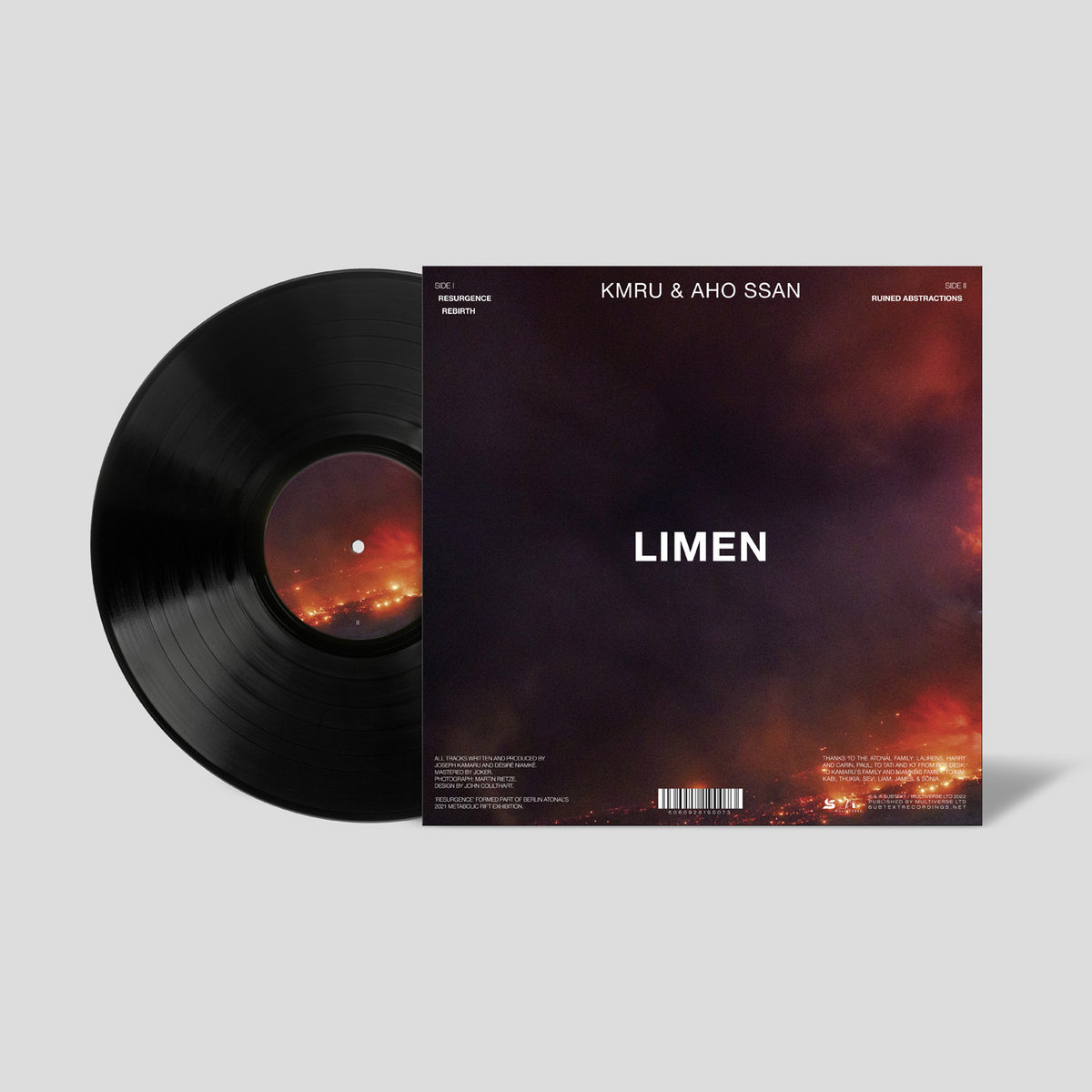
-
THE BEST DJ MIXES OF THE YEAR 2022 SO FAR
KMRU - DEKMANTEL PODCAST 378’
When your brain needs a break from the relentless chaos of the world, KMRU is a go-to artist for sounds that soothe and relax. The Kenyan artist’s mix for Dekmantel’s podcast series is a remarkably beautiful hour of music, cocooning you in a blissed-out haze of ambient textures.
Experimental sound artist KMRU is a master of quietness. His music is as much about empty space as it is the delicate field recordings that fill it in.
The Kenyan has been perfecting this balancing act from his base in Berlin, most notably on 2020 full-length Peel. It's a record of slowly unfolding synth beauty and drawn-out drone mindfulness. Soft focus chords bleed and blend into one another like different shades of watercolour paint and the environmental nature of the sound sources lends it a gorgeously natural atmosphere.
For this week's most meditative mix, KMRU puts together an hour of soothing sound in a painterly fashion. It is unhurried but always going somewhere thanks to a gentle underlapping rhythm, expansive synth arc or little hiss of static. What sounds like distant vocal calls drift in and out of the mix which at times is like a recording from the furthest recess of the cosmos, at others the pleasant ambiance you might hear out of a Berlin window on a sunny afternoon.
50 Years of Music: 2020 – KMRU - “Degree of Change”
SHAPE Platform is taking over crackaud.io this week
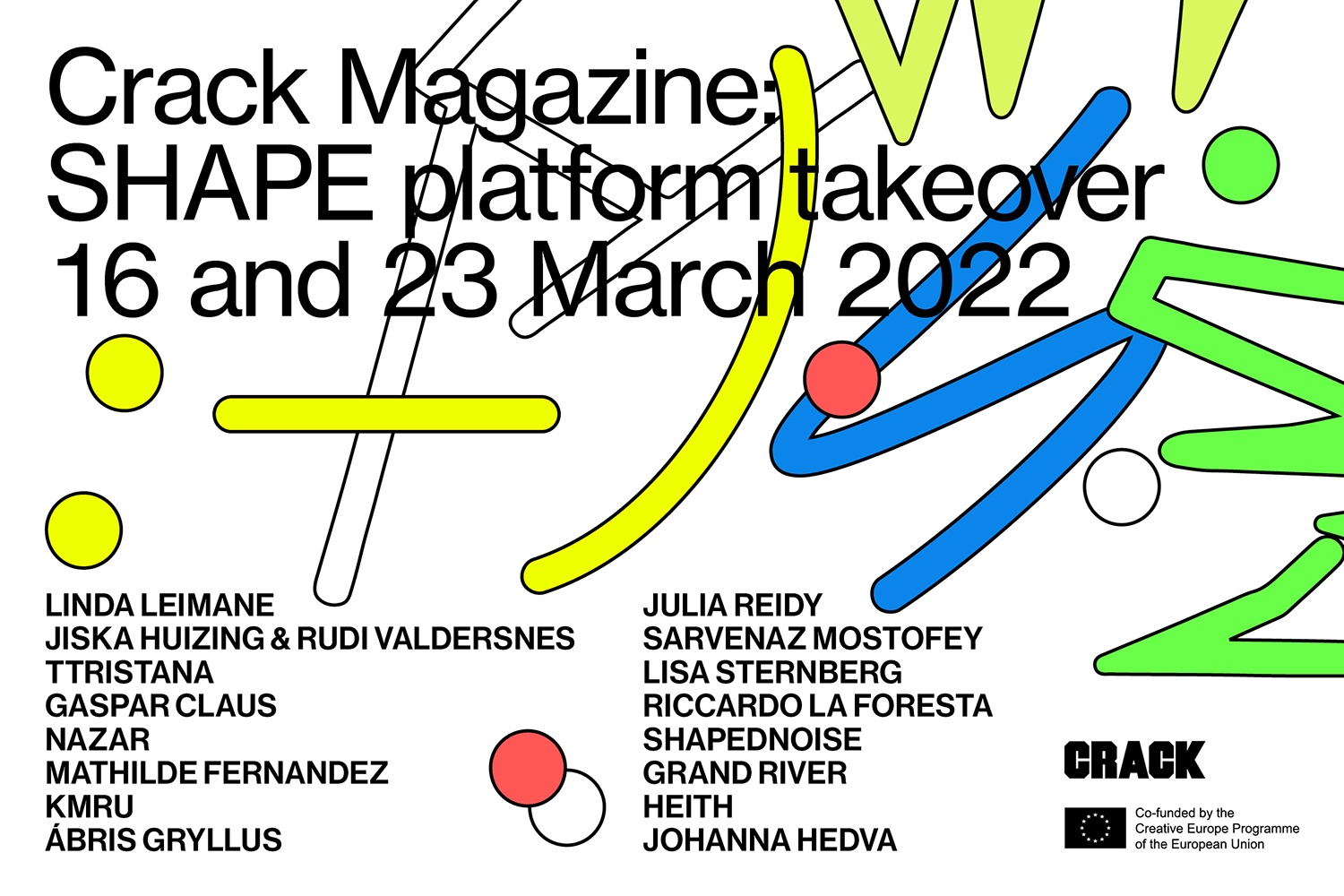
KMRU with Markus Heckmann
Presented by Musikprotokoll, Graz
KMRU’s absorbing ambient compositions have the capacity to make time stand still. Always attuned to the sounds of his surroundings, Joseph Kamaru – aka KMRU – transforms environmental field recordings into mesmerising sound art, as evidenced on the graceful Peel or his 2021 release Logue.
For this transcendent new audiovisual work for the SHAPE Platform takeover, KMRU has teamed up with visual artist Markus Heckmann. Speaking on the piece, entitled By Absence, the pair state: “Considering an emancipatory approach to composition, By Absence juxtaposes on one sound that goes throughout the piece with its relation to the other sounds reconfigured from the same sound.”
Continuing, they add: “This long durational piece changes subtly, although still recounting to the main sound; an antiphonal unrestrained structure that provokes a sense of stillness from noisiness of happenings to phygital [physical plus digital] worlds.”
AIAIAI
FREEDOM
TO CREATE
EP 01: KMRU
SHAPE Mix Series X CTM
Conversation with borshch magazine
London Contemporary Orchestra:
24 Sat 15—Sun 16 Jan 2022,Barbican Hall
The endlessly inventive London Contemporary Orchestra perform one of their biggest live undertakings to date: a continuous 24 hour concert.
But this is by no means taxing, for the audience at least. Relax into an ambient, meditative experience as visuals by projection artist László Zsolt Bordos kaleidoscopically draw you in to a state of deep reflection.
Featuring iconic durational works by composers such as Morton Feldman’s six-hour piece String Quartet No 2 taking the audience through the depths of the night as well as new pieces performed by electronic musicians Actress, Powell and KMRU, plus works by John Cage, Éliane Radigue, Mica Levi, Alvin Lucier, Morton Feldman, Michael Gordon and James Tenney.
Audience members are encouraged to come and go as they please during the 24 hour period, stay for one, two or 24 hours...
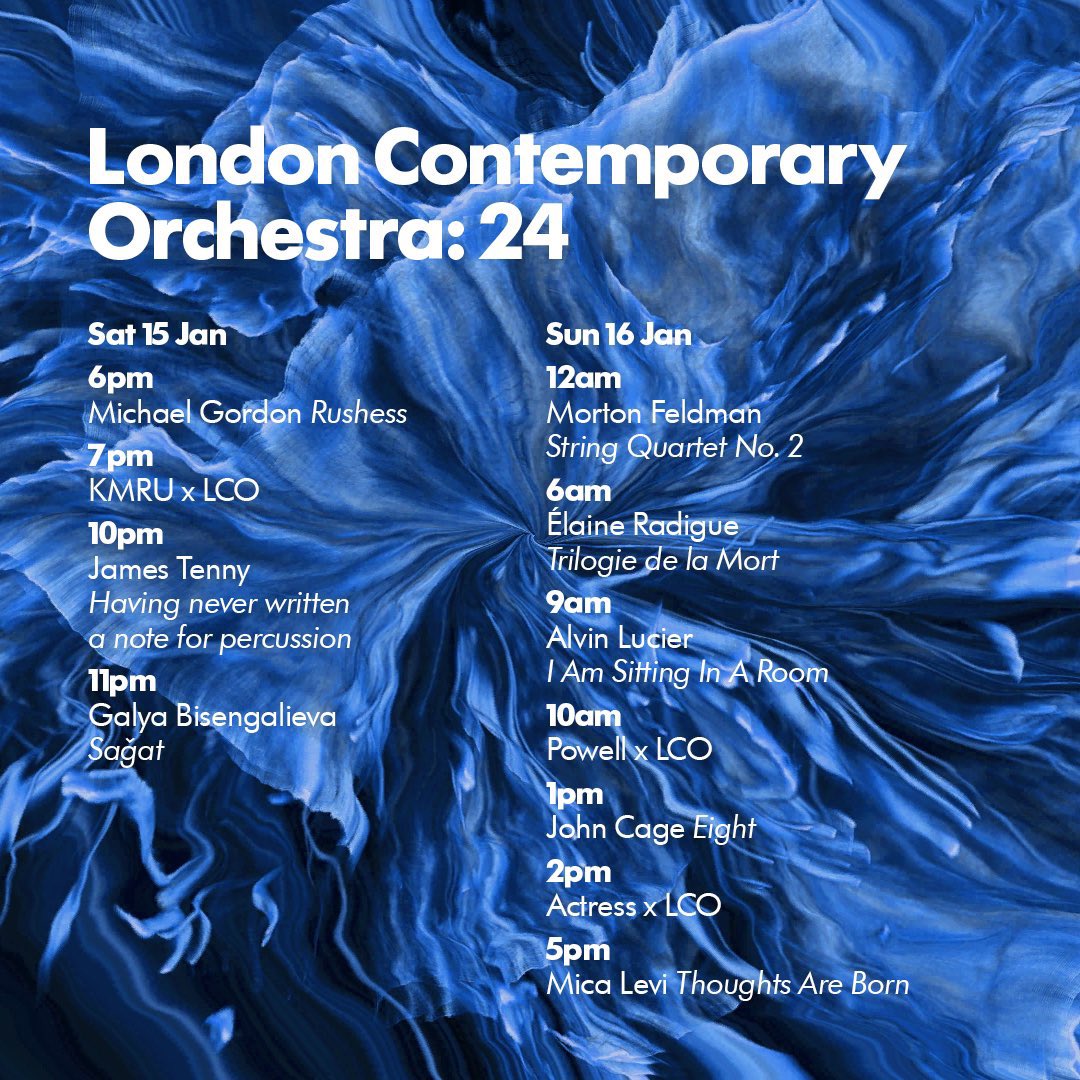
London Contemporary Orchestra: 24, Barbican, stage review: ‘Marathon concert offers an eye-opening view of music and humanity’
Ableton:
Big Ideas and Brilliant Sounds: Eight Standout Features and Videos from 2021

KMRU/ Spaces
Travelling from his childhood roots to where he lives now, Nairobi-born, Berlin-based artist KMRU took us through his approach to location-based field recording in the short film Spaces, which premiered during the Loop Create event in June.
Watch the film >

Laraaji, KMRU, Wata Igarashi feature on Figure's second ambient compilation, Open Space Vol. 2

The 10 best contemporary albums of 2021
7. KMRU – Logue

The Bandcamp page of KMRU – a sound artist based between Berlin and Nairobi, AKA Joseph Kamaru – is always worth checking out for ambient textures. Logue, the third of five mini-albums he released this year, is an addictive mix of meditative electronica, slow-motion synth-pop and bucolic field recordings from east Africa.
KMRU US/ CA Tour 2022
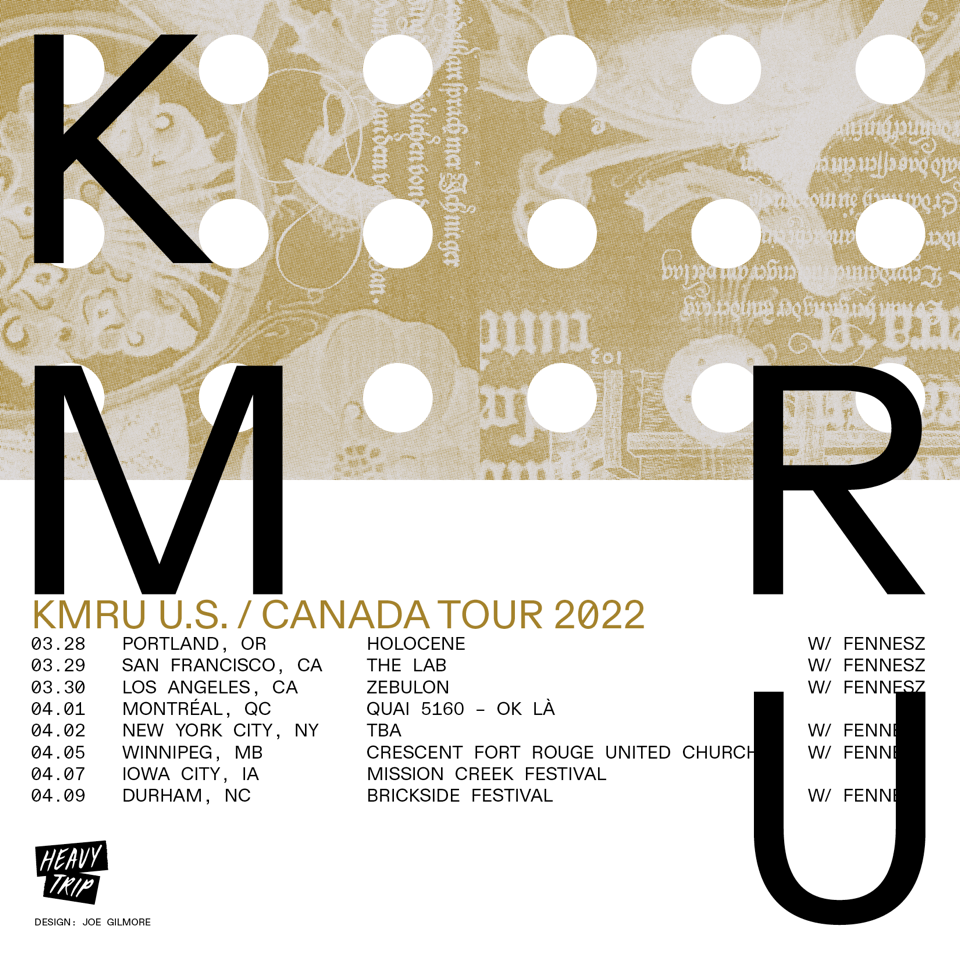
Big Thief Europe Tour w/ KMRU
![]()
KMRU mixes music from Seefeel's Warp retrospective for cassette and zine
Rapture To Rupt is out now.KMRU has mixed 60 minutes of music from Seefeel's recent retrospective compilation on Warp.Put together on a train from Berlin to Warsaw, the mix selects music from the UK experimental band's comprehensive reissue box set, which came out in May. Out now, the mix is available digitally and as a limited-edition tape, which includes a zine featuring an interview between the band and dance music journalist and author Simon Reynolds.Listen to KMRU's Rapture To Rupt, and revisit our recent RA Exchange with Seefeel's Mark Clifford.
KMRU X Seefeel : Rapture to Rupt
The London-based experimental band Seefeel were cutting-edge polymaths from the start. Pulling in influences from the indie and electronic undergrounds, they were positioned as something like a fulcrum between shoegaze and dub techno. In conjunction with the release of their Rupt and Flex (1994-96) compilation on Warp, Seefeel has teamed up with sound artist and experimental ambient musician KMRU, raised in Nairobi, Kenya and currently based in Berlin where he is a Master’s student in Sound Studies and Sonic Arts at the Universität der Künste. It's an incredibly immersive hour-long reworking of tracks from that fertile period, released on cassette as one track. Rapture To Rupt finds KMRU pulling apart the band’s innovative work into a series of expansive and hypnotic drones. The tape is housed in a glassine envelope along with a sixteen page zine that includes an interview with famed music journalist Simon Reynolds.
All music by Seefeel, original versions can be found on Rupt & Flex 1994 - 96
Mix by KMRU. Made on the train between Berlin and Warsaw
Design by Joseph Durnan
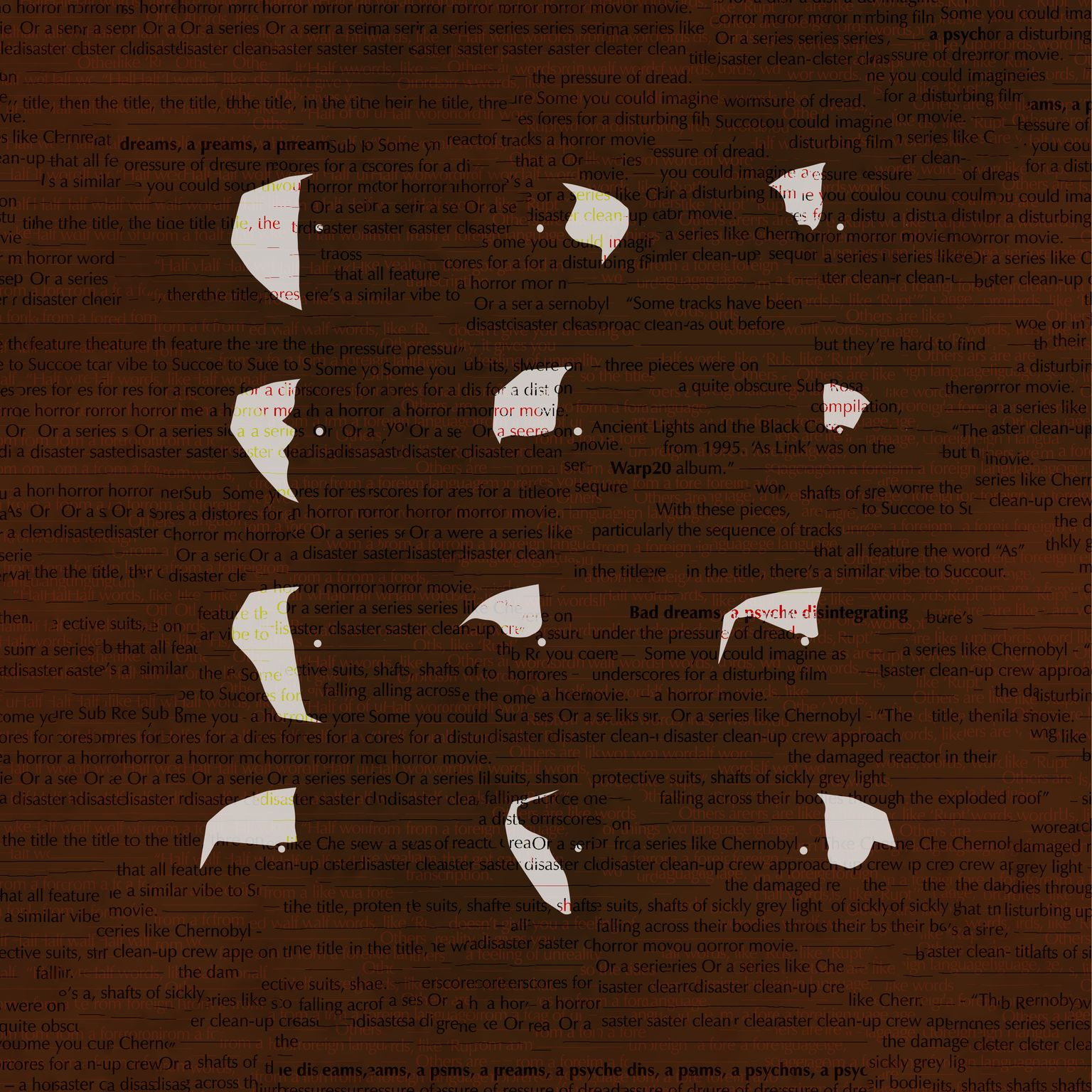
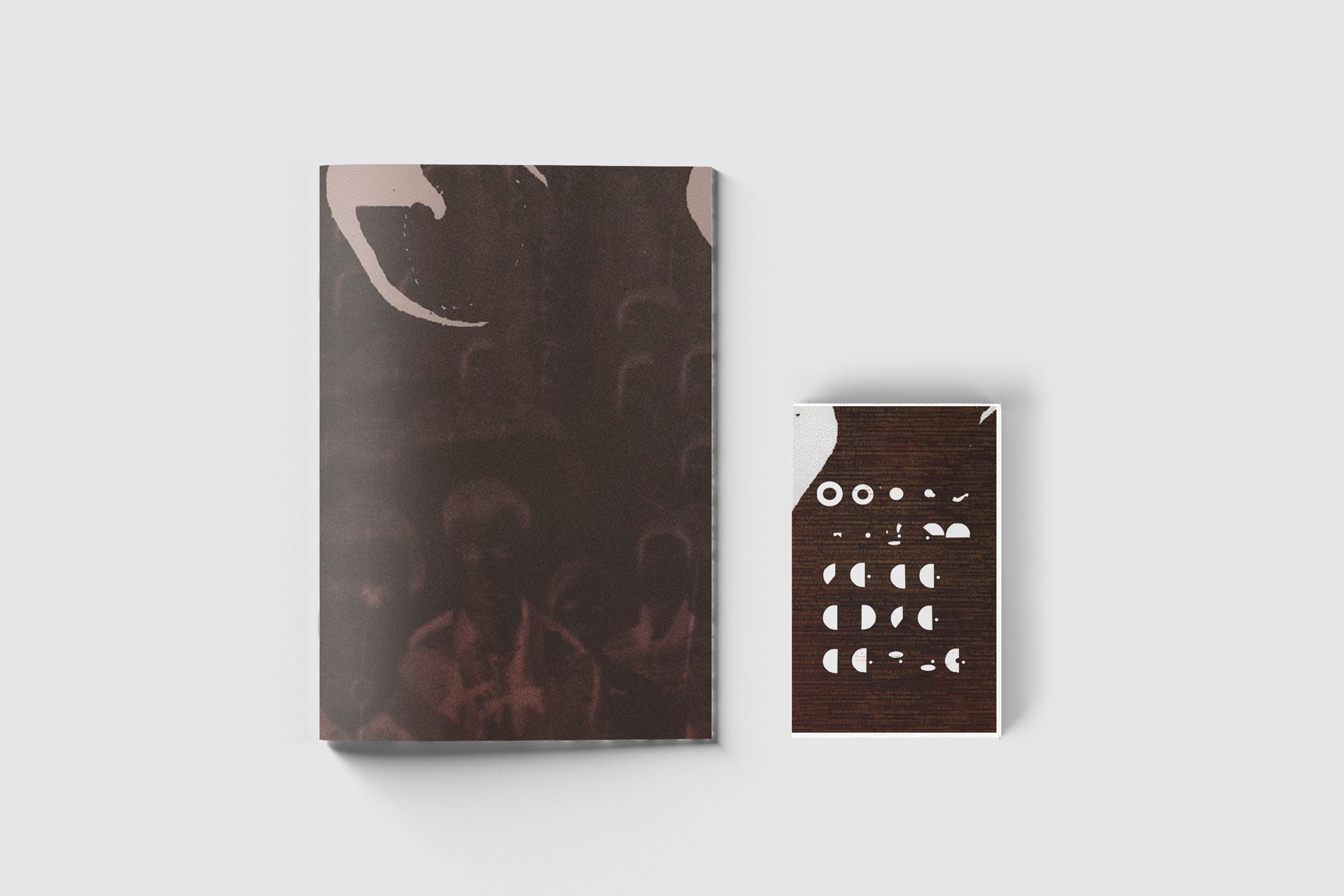
KMRU: Spaces
Is the music we make necessarily informed by where we’re born and raised? Or is it largely determined by where we go from there? Or maybe where we are right now is the only place that matters? These and related questions are at the heart of our new artist documentary movie; KMRU: Spaces.
The movie, first streamed as part of the online event Loop Create, follows KMRU’s path from his childhood in Nairobi, to his family’s move to the outskirts of the city, and finally to Berlin - his current home. Along the way we see footage of the artist in some of the places and spaces that have inspired him in his work and hear how his changing surroundings impacted his way of hearing, recording and crucially, composing his music.

The 10 Top Live Acts Of The Year 2021
KMRU
After his family moved from an inner city Nairobi neighbourhood to Rongai on the edge of one of Kenya’s vast national parks, Joseph Kamaru became obsessed with nature and the sounds it produces. He weaves field recordings taken from his surroundings into his transfixing live sets, which also explore live jamming, stuttering distortion and eerie ambience to hypnotic effect. A recent collab with motion designer MinimalicQuantum added a dazzling visual dimension to this naturalistic exploration. Having been based in Berlin all year, studying a Sound Studies and Sonic Arts degree, KMRU has found a new world to record and aurally explore. He’s since emerged as favourite on the European experimental scene, with sets he’s played this year including a live stream inside Berghain with Luke Slater and Speedy J, and festivals across France, Spain, Poland, Germany and Austria.]
![]()
Our 50 favourite albums of 2021
6. KMRU
Logue
(Injazero Records)
Buy
The 2020 discovery of glittering Kenyan producer and composer thanks to his album Peel brought a much needed luminescence to otherwise dark days last year. Peel swiftly became a portal into his prolific output, spanning compositions released on Bandcamp, as well as digital and physical LPs too. Ever-growing infatuation with the wonders of his cinematic sound design and ambient compositions was furthered thanks in large part to Logue. Taking its moniker from a catalogue, or Logue, of his music, the tracks are collected between 2017-2019, yet each one gives way perfectly to the next. Amidst instrumentals and his field recordings from Africa, KMRU leads you by the hand on a journey through his captivating universe – one that simultaneously feels otherworldly and real. Birds chirping break the day, rushing water falls flow anew, wind rushes across your limbs, a mediation of listening. – GH
Quietus Charts
The Quietus Albums Of The Year So Far Chart 2021
60. KMRU –Logue(Injazero)
Logue takes in rippling ambient/drone lushness from a well-travelled Kenyan, Joseph Kamaru, who is now resident in Berlin. Recorded between 2017 and 2019, it's built equally of nu-new age synth melodies (with outbreaks of what seems to be live instrumentation) and field recordings which, inscrutable in their origins, transport KMRU’s music to somewhere more sinister than blissful.Noel Gardner

Watch a documentary about field recording with experimental producer KMRU
The Nairobi-via-Berlin artist has also shared a free pack of field recordings from Kenya, Uganda, Canada, Germany and France.
KMRU is the focus of a new documentary by Ableton. The 11-minute film, entitled KMRU: Spaces, delves into the ways in which the producer and sound artist draws inspiration from his surroundings, and uses sound to explore the world around him.
The documentary zooms in several defining moments from KMRU’s (real name Joseph Kamaru’s) life so far, and explores how these experiences influence his work, and his approach to music-making and field recording. Kamaru reflects on a childhood spent in Nairobi’s loud and bustling city centre, as well as a period spent on the outskirts of the city, on the border of a national park. In the film, Kamaru compares the two locations and their varying soundscapes.
Last year, Kamaru relocated from Nairobi to Berlin to pursue a Master’s in Sound Studies and Sonic Arts. He discusses the move in the film, and reflects on how his work has shifted in response to his new environment. He also walks viewers through some of his studio and production processes.
Watch the new film in the player above and download KMRU’s free field recordings here. You can also revisit our feature on the experimental artist, taken from Issue 120.

KMRU: IMPERCEPTIBLE , PERCEPTIBLE
For this streamed commission, KMRU presents imperceptible , perceptible. Constructing remembered sonic thoughts of decayed time, the piece explores lived experiences of sound, gradually returning us, we, them to the present or past. Exploring field recordings, noise and drone, imperceptible , perceptible probes to impetus the knowing. Subtle durational changes of sounds, and moving images create phantasms as reflection of the present.
Thu 18 Nov, 2021, 8pm
Streaming on this webpage and Vimeo

A haunting ambient blur that makes for a good, if melancholy, Halloween soundtrack
KMRU's new Bleep mix is a gorgeous impressionist array of vague shapes and blurred figures, occasionally coalescing into melodies or discrete sounds. It's pretty, unpredictable and occasionally, of course, spooky.
Bleep Mix #211 - KMRU
To celebrate the release of the Tresor 30 box set we have a special mix from KMRU. Enjoy.
A contemplative dive into the sonic remembering, the mix to me evokes the sense or remembrance or trying to remember, featuring artists and musics that I've been listening and remembering in the past months.
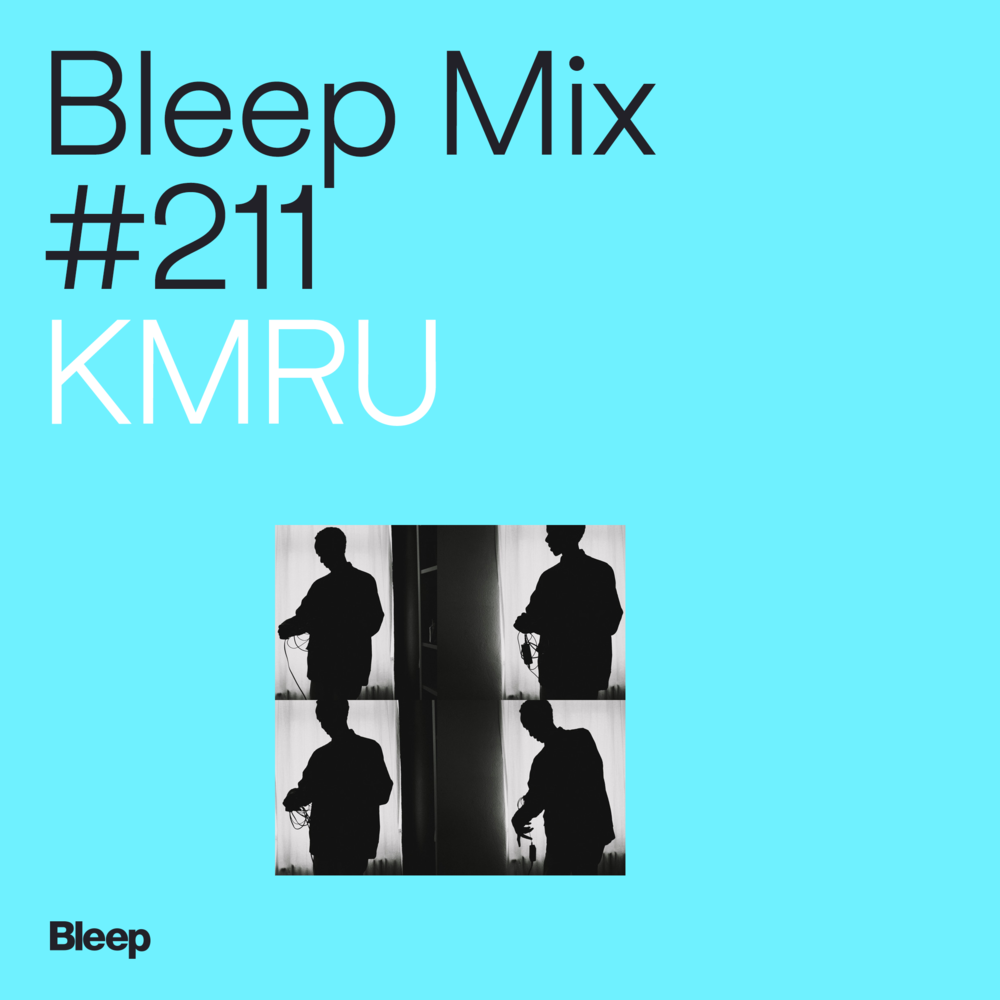

For some musicians, the pandemic seems to have had positive effects on the cultural scene despite the devastating damage it caused to the fields. The producer Joseph Kamaru alias KMRU was one of the discoveries in electronic music last year. It helped that the Kenyan-born and Berlin-based ambient musician landed with Editions Mego with his album Peel . It shouldn't be the last of his releases in 2020. After five albums in just under two years, he has now teamed up with colleague Echium for an album of sublime serenity.
Rather clear in length, Peripheral wanders from one island of silence to the next in stations lasting three to six minutes. Getting to the heart of the success with Ambient is usually faced with the obstacle that the music likes to evade conceptual access. In the case of KMRU and Echium, the almost static surfaces are initially moved by the usual reverb, then open up visibly through loose sound combinations. Some of the pieces even have a rather dry acoustics, just bring a few milky chords to flow with minimal noise accents. Even without an aesthetic revolution, there is a lot going on here.
The outside is droning: An interview with KMRU
2:36 PM Nairobi
Podcast by Thomas Burkhalter, Daniel Jakob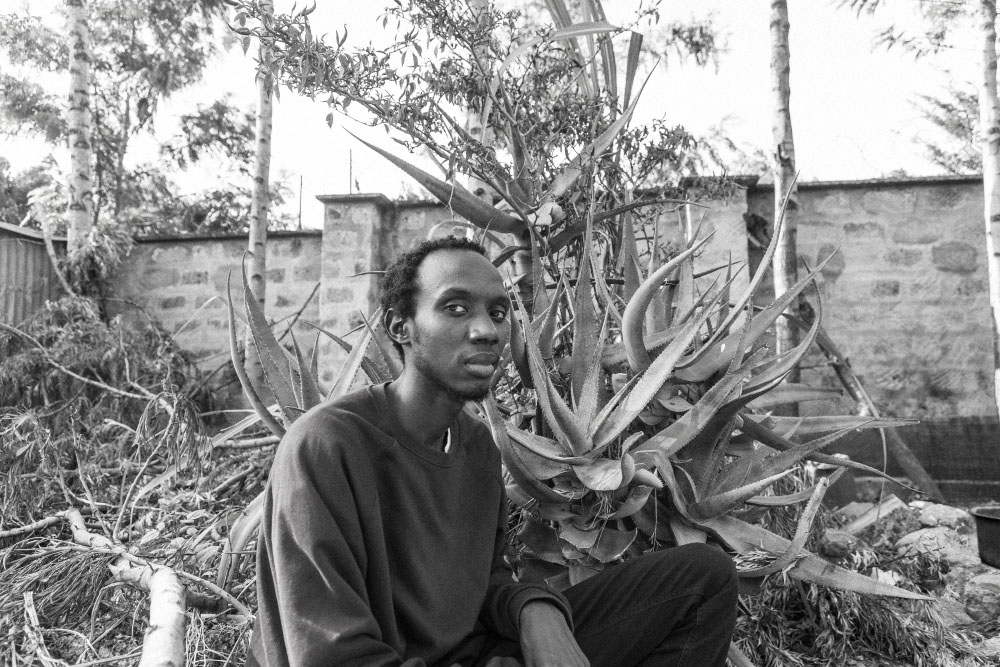

KMRU AND ECHIUM TEAM UP ON ‘PERIPHERAL’ LP: LISTEN
The eight-track album was produced remotely between Nairobi and Manchester
KMRU and Echium have collaborated on a new album, ‘Peripheral’. Check it out below.
The eight-track experimental ambient release was produced between the artist’s respective homes in Nairobi and Manchester, with the artists combining their respective specialisms into what KMRU has described as a “psychic collaboration”.
KMRU, who is now based in Berlin, folds his organic field recording manipulations and textured electronics into Echium’s sparse and frosty dub techno atmospheres. Echium also created the album’s abstract artwork.
As John Twells writes in the album’s accompanying text: “Echium and KMRU make abstract electronic music that sounds as if it's bursting free of the digital world: they ink a utopia that's verdant, fertile and teeming with life.”
listen to, and buy, ‘Peripheral’, via KMRU’s Bandcamp.
Music in space, music in place

KMRU Releases New EP As It Still Is: Listen
A five-song follow-up to the electronic musician’s May album LogueKMRU has released the new EP As It Still Is. KMRU wrote his EP in Berlin during the winter, and Rafael Anton Irisarri mastered the five-song release at Black Knoll Studio in New York. Listen to As It Still Is below.
In a statement, KMRU said his EP is “bringing together fragments of recordings and narratives which were quite nostalgic.” He continued, “Using field recordings mostly from Nairobi, I was trying to reconstruct some past lived experiences in the present longings (at that time), reflecting on nostalgia as a refiguration of past experiences, whether lived or reminisced.” Listen to
KMRU is the moniker of Berlin-based Kenyan electronic musician and sound-artist Joseph Kamaru. He released the full-length Logue in May.
Read the Rising interview “Meet KMRU, the Ambient Musician With His Ear to the World.”
Koki Nakano “Overlay (KMRU Remix)” (No Format)
No excuse is needed to highlight the talents of KMRU, but given the passing of Editions Mego founder Rehberg last week, now seems like a good time to once again highlight one of his label’s biggest recent success stories. Here, the Berlin-based Kenyan transforms Koki Nakano’s “Overlay,” weaving the Japanese pianist’s elegant chords into crackling loops, ultimately landing on something that’s both hazy and comfortably meditative.

10 mixes you need to hear this month
KMRU
Leftfield sounds from Africa and the diaspora
KMRU’s music feels both unique and familiar. His releases (like May’s Logue LP) demonstrate this duality well, with the Kenyan artist flexing his skills within the realms of ambient and leftfield electronic music much to the delight of his ever-increasing fan base. This mix, shared as part of our Specialist Mix series, offers a similar experience. However, instead of honing in on his own sound, KMRU showcases a selection of music from Black artists in Africa and across the diaspora. There are tunes from Slikback, Space Afrika, Nexcyia, Wayne Phoenix, alongside several of his own, sprinkled in for good measure. Plug in, unwind and be sure to check out the full tracklist on crackaud.io.
13 artists on Jon Hassell’s musical legacy

KMRU
I was listening to a lot of Brian Eno’s works and this led me to discover Vernal Equinox. I was really inspired by Jon Hassell’s approach to playing the trumpet, and all the futuristic timbral sounds of his works. His concept of the Fourth World is still relevant today.
Intonal Festival 2021: KMRU
Kenyan producer Joseph Kamaru performs an experimental session as part of the Swedish festival’s 2021 programme.
The second of this week’s performances from the 2021 edition of Malmö’s Intonal Festival comes from Joseph Kamaru aka KMRU, a experimental musician and sound artist from Kenya. Kamaru’s music makes extensive use of field recording techniques to create multi-layered, richly textured ambient compositions. Last year, he released three albums, including the outstanding Peel for Editions Mego.
Kamaru’s performance, which took place on June 18 at Malmö’s beautiful St. John’s Church, sees the artist make use of synth hardware and software on a set that contrasts delicate tones with rough, noisy textures. It makes for a suitable companion to Johanna Knutsson’s Intonal performance, which took place in the same venue.
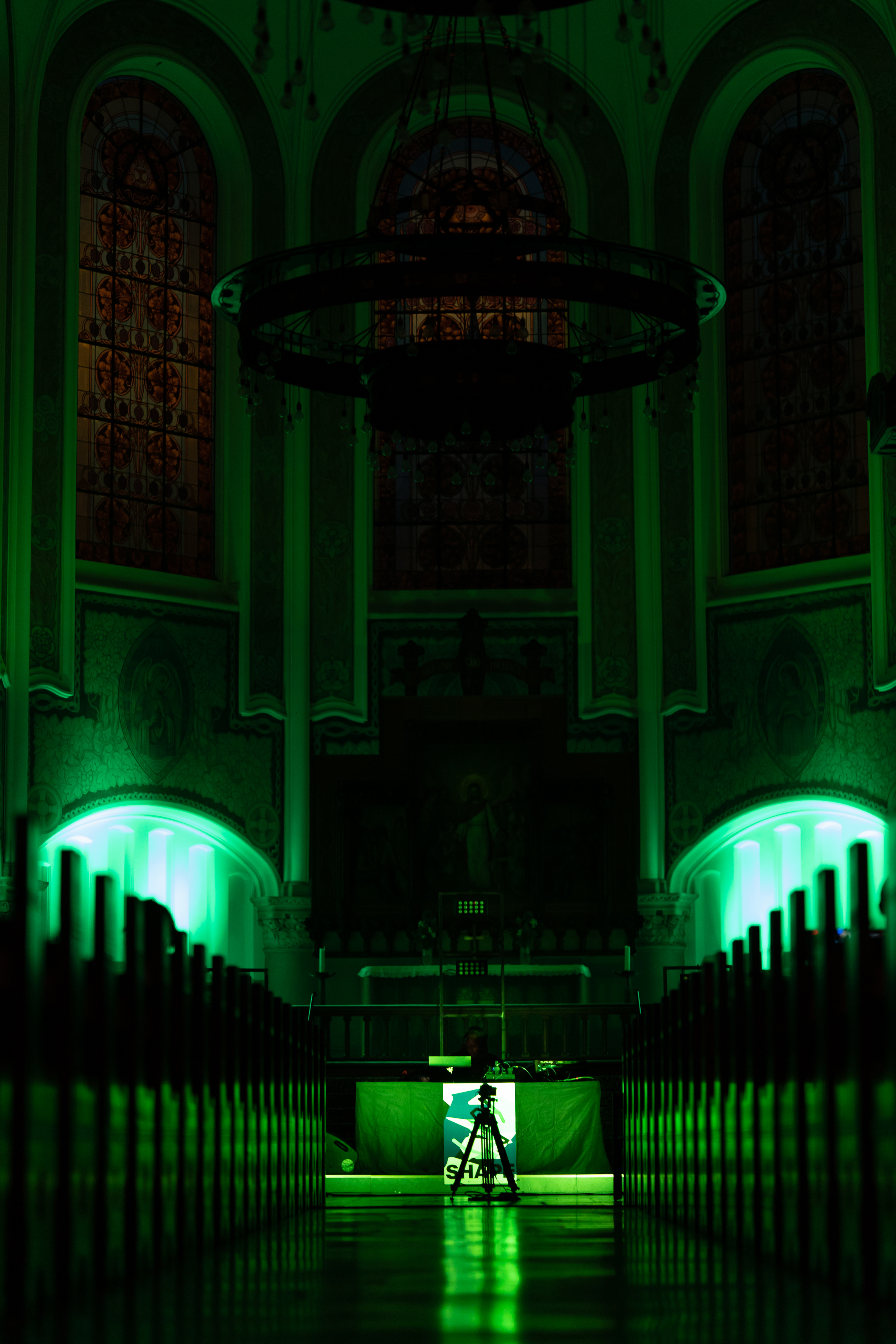
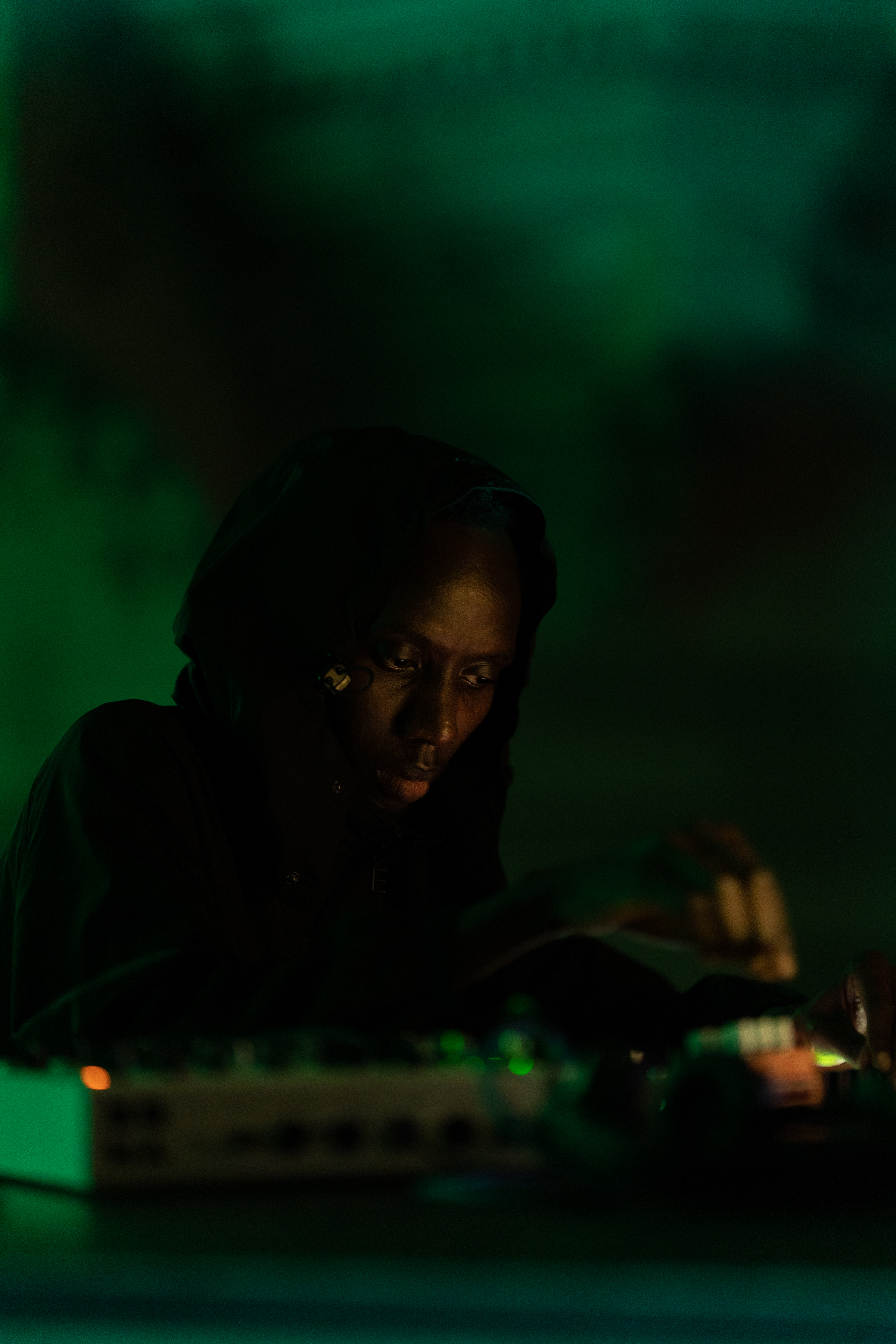

Camera Operators: Amanda Davies, Tony Jageteg & Henrik Hellström
Editor: Henrik Hellström
![]()
InFiné, le Maintenant Festival, le Centquatre et le Groupe de Recherches Musicales de l’INA ont mis en place un dispositif d’accompagnement de carrière artistique inédit.
After discovering him in 2018 and seduced by his artistic approach, these four actors of the cultural sector, defenders of creation and emergence, decided to unite their strength around the music of the Kenyan producer KMRU .
Initially, the INA grm made a studio available to the composer for an artistic residency from June 14 to 27, 2021. This allowed him to experiment and develop his musical practice through instruments and unique infrastructures in France. Like other guests before him - Jim O'Rourke, Matmos, Kali Malone to name a few - KMRU was able to deepen its research around concrete, electroacoustic and experimental music in the best conditions.
This Parisian residency will be followed by a live creation time around a 360 ° "multichannel" device , presented exclusively during the 2021 edition of the Now Festival in Rennes as well as at the anniversary weekend of the fifteen. years of InFiné at the Centquatre next winter.
Finally, this collaboration will be punctuated by a KMRU album released by the InFiné label in 2022.


Luke Slater collaborates with Lady Starlight, KMRU, Surgeon, Speedy J and Tom Moth on A-TON album
Ostgut Ton's experimental sub-label A-TON is releasing a collection of Luke Slater's lockdown collaborations.Out digitally June 25th and on vinyl in August, DIALOGUE features four tracks between 15 and 25 minutes in length. They were each produced remotely during lockdown by Luke Slater and collaborators Anthony Child (AKA Surgeon), Speedy J, KMRU, Lady Starlight and Tom Moth, the harpist in Florence + The Machine."It's not live jamming as such," explains Slater, who conceived the project and proposed it to A-TON. "
A single live, one-take recording of audio and video is passed from person one to person two as a file. Then they, using that as a background, record their performance in the same way. Both performances are then passed to a third performer who does the same. Then I mix it at the end."Slater features on all four tracks, while Surgeon features on three, Moth on two, and Lady Starlight and KMRU once each."
My contribution was at the third stage," Speedy J told Resident Advisor. "The material I got to work with had the layers from Luke and Joseph already done, so I took what was already there and filled in the open spaces. My approach was to enhance the stuff they did, and complete their ideas. They initiated, and I commented."Each of the artists used one machine only, without sync or beat-matching, and built up the process as a domino effect of audio and video stems. "The beauty is always in the unknown and spontaneity in improvisation," said KMRU.
Listen to DIALOGUE.

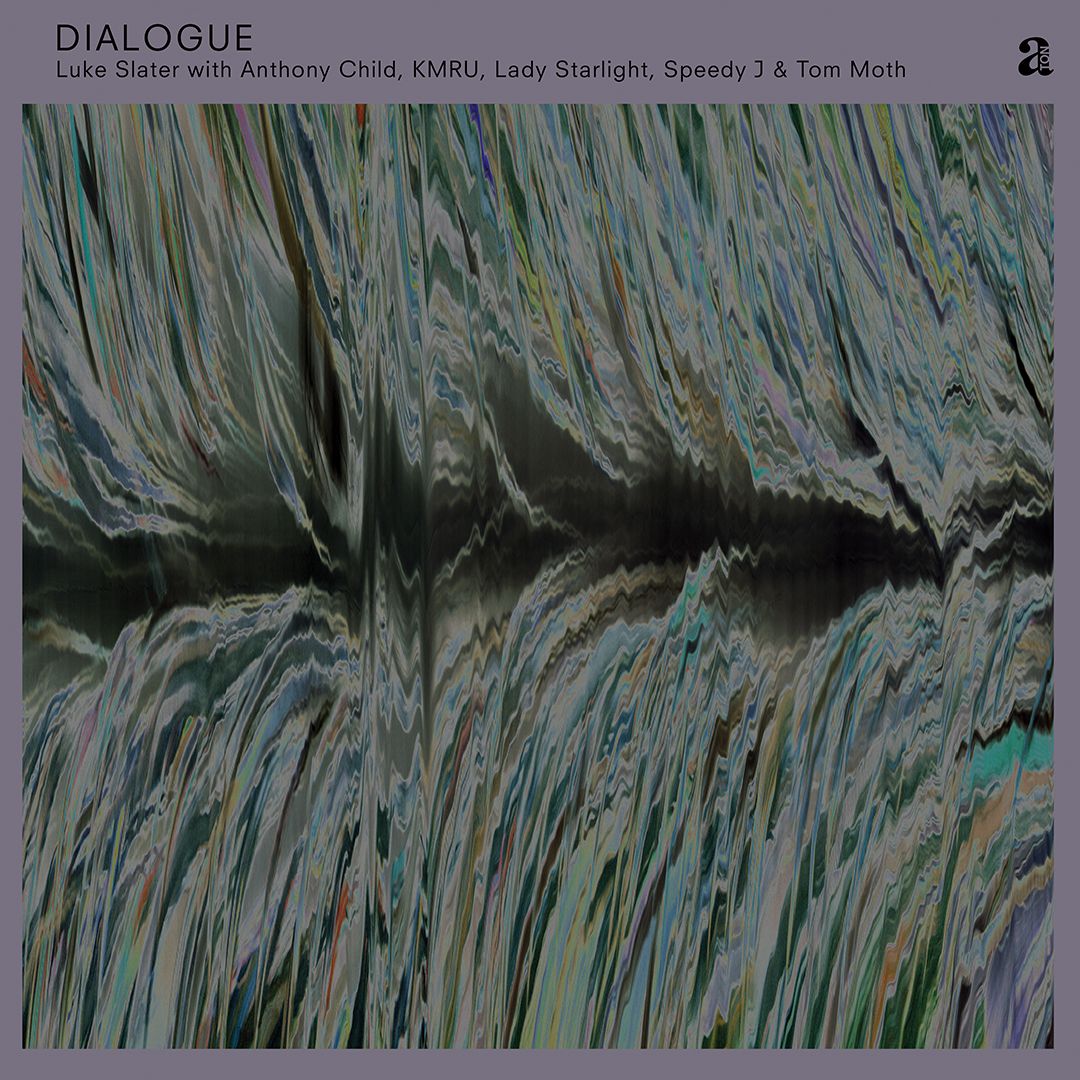

KMRU: Ways of hearing
Leftfield sounds from Africa and the diaspora – Mixed by KMRU


The Kenyan ambient artist – real name Joseph Kamaru – has garnered the attention of music fans worldwide over the last year thanks to his deeply moving output, and drifting, meditative sounds. In 2020, he released three LPs – Peel, Jar and Opaquer – with the former landing via Viennese experimental imprint Editions Mego. All three releases – plus last month’s album, Logue – signal an artist with a clear focus and boundless vision.
Given his compelling approach to composition and arrangements, we thought we’d tap Kamaru for a specialist mix devoted to the sort of leftfield, experimental and ambient sounds he’s been quietly fashioning into something that sounds entirely unique to him. Kamaru’s mix showcases an array of tracks produced by Black artists from Africa, and the diaspora.
Loop Create

Sound out of Place with KMRU
13:45 & 21:45 Amsterdam (UTC+2)
Personal Take | 30 minutes
Music makers have often cited places they’ve been as sources of inspiration. This is certainly true for KMRU – producer, sound artist, and great advocate for listening to our surroundings.KMRU, known for his use of field recordings in emotive, experimental compositions, spent his formative years in Nairobi, where he says the background noise was constant. Upon moving outside the city in his teens, he found that the stillness of his new hometown drastically changed how he heard the sounds around him. This contrast he perceived, and the resulting shift in his creative output, cemented in him just how deeply our sonic environment can influence us.
But there’s more to an artist’s work than their surroundings – personal history, internal feelings and beliefs can all play a part in the creative process. In this session, KMRU will tell the story of the urban and social world that helped form his ideas and artistic personality, and invites us to discuss with him in an extended Q&A: Is the music we make necessarily informed by where we’re from? Can we find ways to appreciate artists’ influences, without minimizing their experiences or reducing their work to just an example of a culture?
KMRU's participation is possible with support from Paris cultural institution INA GRM, where he is currently artist-in-residence and will be streaming from for Loop Create.
LSBU's Sonic Research Group and South Bank Sound Lab
LSBU's Sonic Research Group and South Bank Sound Lab are excited to launch a series of three Listening Sessions with invited guests, who will join us to share recent compositions or works-in-progress, and give us an insight into their creative process.For our second session, we are delighted to host Kaffe Matthews and Joseph Kamaru aka KMRU, two sound artists known for - amongst other things - working with field recordings

-
Shape Artist KMRU beim diesjährigen ORF musikprotokoll
https://oe1.orf.at/programm/20210617/641549/Shape-Artist-KMRU-beim-diesjaehrigen-ORF-musikprotokoll
KMRU im Zeit-Ton Porträt
Diese Woche präsentiert das ORF musikprotokoll im steirischen herbst sein Festivalprogramm 2021 und auch dieses Mal haben wir wieder mehrere Musiker/innen eingeladen, die heuer bei Shape dabei sind. Shape, das ist die Plattform für spannende neue Musik und audiovisuelle Kunst des Festivalnetzwerkes ICAS der International Cities of Advanced Sound, die Ende 2014 vom ORF musikprotokoll und fünfzehn weiteren europäischen Festivals gegründet wurde. Jedes Jahr nominieren wir gemeinsam 48 Künstler/innen bzw. Kunstformationen, auf die dann zwölf Monate lang unsere Scheinwerfer gerichtet sind.
Kennenlernen beim Nyege Nyege Festival 2018
Zu unseren zahlreichen Aktivitäten zählt auch ein jährlicher Shape Showcase bei einem befreundeten Festival außerhalb der Europäischen Union. 2018 führte uns dieser zu unserem ICAS Partner im ugandischen Jinja, zum Nyege Nyege Festival. Dort haben wir KMRU kennengelernt, dessen so feingesponnene Musik uns gleich aufhorchen ließ. Mittlerweile gilt der ursprünglich aus Nairobi stammende Musiker als einer der spannendsten Vertreter der ostafrikanischen Elektronikszene. Vergangenen Juli erschien bei dem renommierten Label Editions Mego sein Album "Peel", seit vergangenem Herbst macht KMRU an der Universität der Künste in Berlin seinen Master im Studienlehrgang "Sound Studies and Sonic Arts".
Musik, so unberechenbar wie das Leben
Als musikalisches Ausgangsmaterial verwendet KMRU vorwiegend Field Recordings, neben Synthesizern und weiteren elektronischen Instrumenten, die er auch Mal so verschaltet, dass sie mit vermeintlich fehlerhaften Klängen überraschen. Nach seiner Kompositionsmethode gefragt, schildert der Künstler, wie gerne er improvisiert; sich von seiner Intuition und der Magie des Moments leiten lässt. Seine Musik solle so unberechenbar wie das Leben selbst sein.
"Es ist wie im Leben, so vieles passiert gleichzeitig und alles befindet sich in einem steten Wandel. Es gibt kein Raster, demzufolge etwa der Krankenwagen genau um 3 Uhr 45 vorbeifahren wird oder dergleichen", führt KMRU aus. "Das Leben ist vielmehr ein ständiges Zusammenspiel von Zufälligkeiten. Deswegen habe ich 2019 aufgehört mit einem Metronom, mit einer fixen Zeitstruktur zu arbeiten. Meine Musik soll sich ganz natürlich entwickeln. Ich versuche, beim Komponieren nicht zu viel über das Ergebnis nachzudenken, um mich von Ideen nicht blockieren zu lassen. Ich möchte so frei wie möglich sein. Ja, meine Musik soll so unberechenbar wie das Leben selbst sein, wie der Wind oder ein Baum.
Im Zwielicht
Im ersten Moment versprüht die Musik von KMRU eine oft heimelig anmutende, mitunter geradezu lieblich verträumte Atmosphäre, in die sich jedoch bald eine untergründig brodelnde Spannung einschleicht, bis man plötzlich meint mitten in einem Zwielicht zu stehen oder in einem Nebel, in dem sich alles in nichts aufzulösen scheint.
"In der Regel versuche ich einen Zustand herzustellen, in dem man nicht so genau weiß, was man fühlen soll und ob man diesen Sound gerade wirklich gehört hat", so der Künstler. "Bei "Peel" ist mir das am besten gelungen. Auch ich entdecke bei jedem Hören neue Details. Ja, man soll sich beim Hören meiner Musik in einem Zwischenraum wiederfinden."
Engagierter Netzwerker
Neben seiner eigenen künstlerischen Tätigkeit engagiert sich KMRU auch sehr für seine Kolleg/innen, stellt ihre Musik in Radiosendungen vor oder gibt sein Wissen im Rahmen von Workshops weiter. So hat er etwa in Nairobi eine Ableton User Group gegründet und war am Aufbau von Black Artist Database (ehemals "Black Bandcamp") beteiligt, - mehr darüber gibt es dann am kommenden Sonntag in Zeit-Ton extended zu hören.
(Shape wird durch das Programm "Kreatives Europa" der Europäischen Union gefördert.)
Gestaltung: Susanna Niedermayr
-
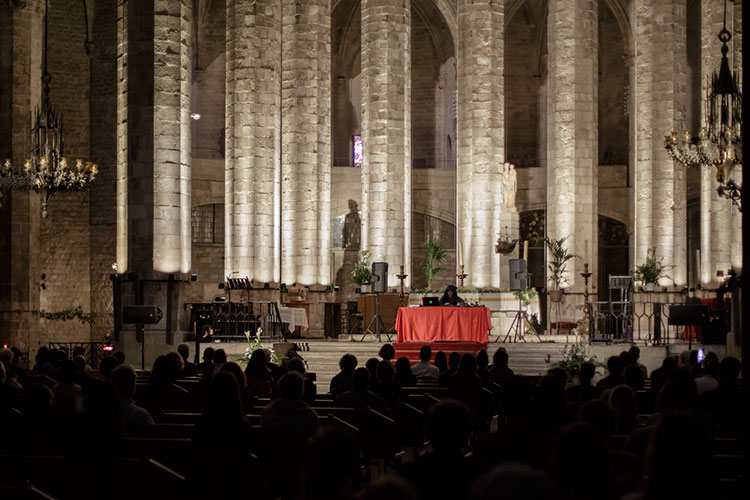
Concerts / Etnoscòpic

El keniata KMRU inauguró en la basílica de Santa María del Mar el festival multidisciplinar Etnoscòpic
El artista desplegó su música ‘ambient’ en una hermosa velada de espiritualidad laica
Concierto de KMRU en la basílica de Santa Maria del Mar.Albert Garcia / EL PAÍS

Best Mixes
May 2021
KMRU
Groove Podcast 297
KMRU said his goal with his new Groove mix was "to offer a transcendental experience," and he gets pretty darn close with this hour-long session.

Kenyan Sound Artist KMRU Charts First Explorations Outside of Homeland on New Album
Berlin-based ambient artist KMRU has signed to Injazero Records for the release of a new album, Logue.
Compiled of previously self-released works produced between 2017-2019, Logue charts KMRU’s path from his roots in Nairobi, Kenya to his first explorations outside of his home-city. Some of the earliest compositions on the album—2017’s “Jinja Encounters”, for example—represent KMRU’s first trips outside his homeland and the experience of new sights and new climates. The album is “intensely personal” with “powerfully intuitive expression,” we’re told, “crossing continental divides with a singular elegance.”
KMRU, real name Joseph Kamaru, released his Peel LP with Editions Mego in the summer of 2020. He followed that up with the albums Opaquer (Dagoretti) and Jar (Seil Records) that same year. His work is uniquely positioned between the cultures of ambient and African musics, entwining his compositions with field recordings from his native Kenya and the surrounding countries.
First Floor #82
KMRU “Argon” (Injazero)
KMRU “OT” (Injazero)
KMRU “Jinja Encounters” (Injazero)
Without question, KMRU is one of electronic music’s biggest lockdown success stories, but after hearing the Logue album, which compiles tracks he made between 2017 and 2019, it quickly becomes clear that the world should have been paying attention to this Kenyan ambient artist (who’s now based in Berlin) years ago.
In comparison to his more recent offerings, which often deal in sparsely populated (albeit undeniably arresting) soundscapes, tracks like “Argon” and “OT” are comparatively lush, evoking a sort of cosmic sensibility with their loosely sci-fi synth melodies and cinematically expansive approach. In truth, they’re not far off from Cliff Martinez’s Solaris score (for the film’s 2002 remake) that Kevin Richard Martin mentioned in this week’s First Floor interview.
“Jinja Encounters” takes a different approach, leaning heavily into field recordings and constructing an almost idyllic scene—complete with birdsong and the sound of a babbling brook—before the song blossoms into something more propulsive. It’s a more grounded effort overall—some of the percussion literally sounds like samples of silverware clanking against a plate—but the humility of the song’s component parts ultimately only enhance its invitingly tranquil spirit.
KMRU “Logue”
May 18, 2021 Brad RoseAcross long stretches of KMRU’s brilliant Logue, electronic sounds become tangible landscapes bathed in prismatic light. Synesthesia flickers through vivid colors teeming with organic aural ecosystems as KMRU explores unexpected sonic combinations spread across nine memorable tracks. For one of the planet’s most compelling ambient musicians, Logue pushes into fresh directions as he explores new pathways to bring this intensely personal expression to life.
I love how KMRU seamlessly weaves field recordings from Kenya and East Africa into his synthetic sound worlds. Of course these natural sounds aren’t new to ambient music, but he does it in surprising ways. With the stunning “A Meditation of Listening,” birds and insects dance with bubbling arpeggios, blurring lines between the artificial and the real. It doesn’t matter where one begins and the other ends as it’s all part of the same system. Repetitive chords outline buried memories, obscured behind painful experiences that are trying to surface. As minimal rhythms gradually roll into view, the bass gets louder, letting you know this isn’t something that can be ignored any longer. The field recordings shift, a door creaks and closes, and the tension lifts. You’ve made it through. Soft, sweet synth notes open up and let the light stream in.
Morning approaches after a long night on “Argon.” Huge synth swells drift away, burned off like fog, so ringing sequences can rise up and give into the growing anxiety. KMRU’s music often lives on this knife edge between catharsis and paralyzation. Pieces like “11” have a lightness and freedom to them, bobbing along like clouds catching rays, where “OT” is apprehensive. The latter’s pulsing layers remind me of Ricardo Donoso’s earlier work, but the underlying strings and African street sounds add a new, unexpected layer.
Throughout Logue, KMRU pulls the reins tight. His songs are dialed in and precise, only showing as much as necessary so the audience gets to where he wants them to go. When the kosmische-tinged arpeggios of the title track repeat into infinity, a calm control emerges. Yes, this world is full of terrible things, but small moments of levity and kindness make all the difference; a belly laugh on “OT” or the soothing water sounds of “Und” bring us back to center, ready to face down the darkness again. Logue is an incredible record from one of the best.

Album Review: KMRU - Logue
KMRU collating self-released tracks from 2017 to 2019 into this wonderful listen.Kenyan born and Berlin-based ambient artist Joseph Kamaru, aka KMRU, has released a new album Logue, collating self-released tracks from 2017 to 2019. The tracks were originally released as part of shorter projects or loose singles, but now fit into this larger project.
Given new context, the album flows effortlessly from start to finish, showing that his tunes not only work well together even when produced without the original intent of an album, but that he is an excellent selector as well.
“Every track reflects an event, space or location,” Kamaru writes. “The pieces are developed from field recordings, improvisation and spontaneity.”
The ambient works collate field recordings that make it feel like you are out amongst chirping birds or a slowing field of grass. This is all done with the guiding hand of gentle analogue synthesis. Some tracks like “A Meditation Of Listening” are a little darker, while others like “Bai Field” are mellow and soft.
It is a wonderful listen from start to finish that makes you grateful he put this together.
i to i

Episode 3
KMRU - “History and Community”

Also out this month
We’ve heard assorted miniatures by the Nairobi-born, Berlin-based electronicist KMRU on his Bandcamp page. Logue is compilation of some standouts: the immersive bleeps of Argon; the fluttering, acoustic D’n’B of 11, the bucolic electronica of Und, the tumbling digital arpeggios of the title track. Immersive and compelling stuff.

Albums to look out for in May
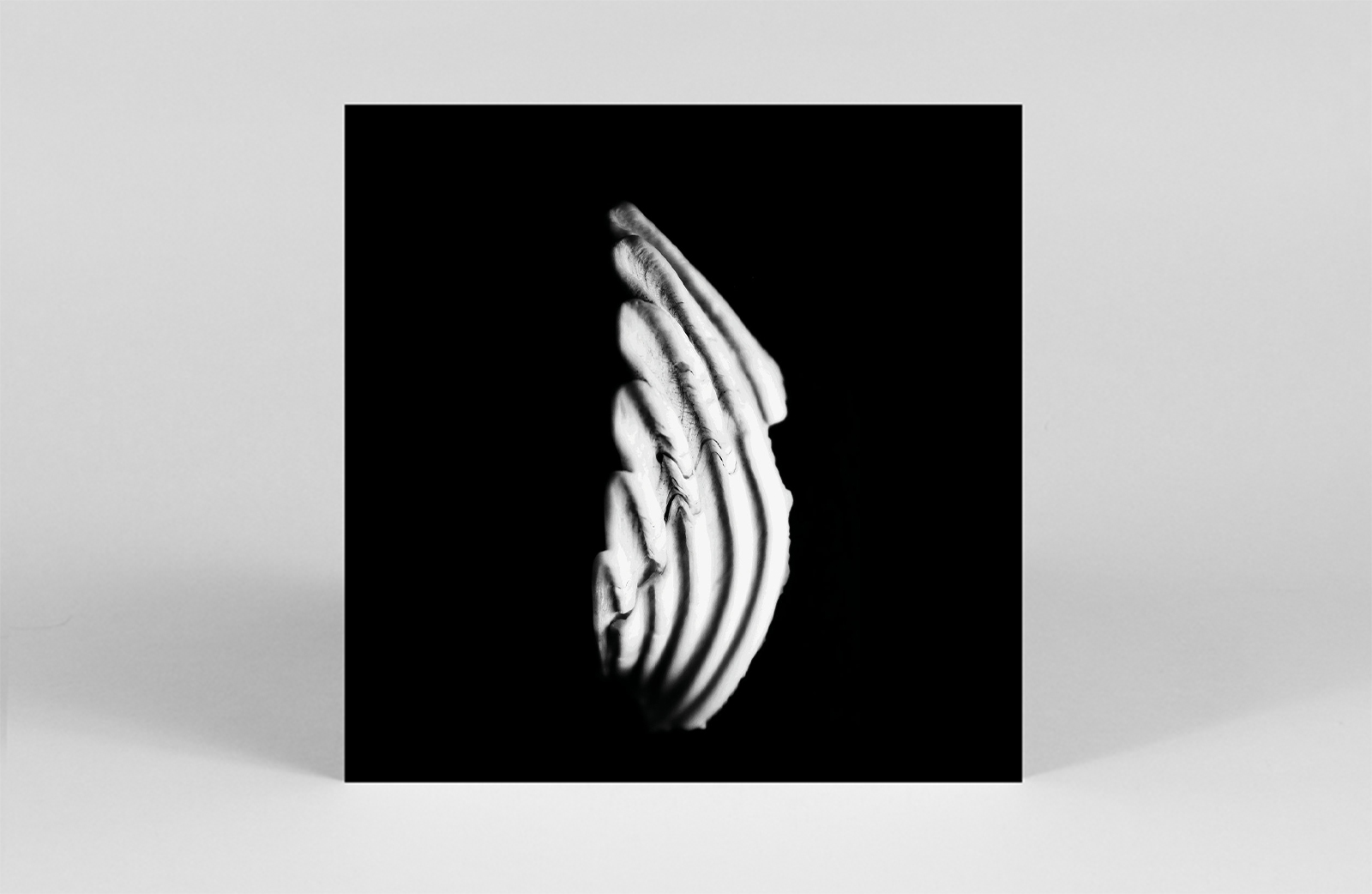
KMRU
Logue
(Injazero Records)
Due: 14th May
It feels strange to describe an ambient musician as a ‘breakout star’, but the past 12 months have proven a quiet whirlwind for Joseph Kamaru. He continues a prolific run with Logue, which comprises works created between 2017 and 2019. Fusing analogue synthesis with field recordings, the results exemplify the tenderness and warmth that have helped KMRU generate such a dedicated following over the last year. – WP
ACL: KMRU ~ Logue
In the parable of the blind men and the elephant, six men feel different parts of the creature ~ tusk, trunk, tail, ear, leg, side ~ and after doing so, draw different conclusions. In like fashion, various reviewers have categorized KMRU as being ambient, electronic, and experimental, while noting his use of field recordings. Each facet represents a different side of the artist.
Last year, Joseph Sannicandro ran an in-depth feature on Nairobi’s Joseph Kamaru, including an enlightening interview. 2020’s Peel made both our year-end ambient list and overall chart. The album represented what some writers called a progression from a more rhythm-based sound to a more ambient-based sound. Logue seems to travel in the opposite direction, until one realizes that the new album is a compendium of “early” self-released work from the artist ~ the quotes used because the artist is still young, and the music was recorded from 2017-19.
All of the aforementioned styles are represented, yet the album flows beautifully from start to finish, a function of wise sequencing ~ something hard to do when tracks were not originally recorded as part of a set. Logue has a freshness of spirit that reflects the joy of the artist as he begins to set ideas to tape. And now we arrive at a reviewer’s conundrum: I like KMRU’s latest album more than his last, although it was recorded earlier. Will the artist receive this as a compliment?
I spent eight days in Kenya in the 90s, including two in Nairobi, and was quickly adopted as a friendly mzungu. The experience was life-changing. During that short period, I came to realize that the people there had a lower standard of living that I, but as a whole were happier than the average people in my home country. The difference was due to community and a sense of pulling together. While this is an oversimplification, in the United States, people expect everything to go right all the time, so when it doesn’t, they get grumpy. In the tiny town where I stayed, people expected things to go wrong all the time, so when they didn’t, they rejoiced. This is the spirit of Logue.
The album feels like the country, although it includes tracks inspired by journeys to neighboring nations. At the same time as Kamaru is exploring new territories, he’s also exploring new avenues of sound. “Argon” may begin as an ambient piece, but soon the electronic textures begin to bubble to the surface like camouflaged creatures in the rain forest. In “Jinja Encounters,” field recordings begin to flow: running water, local birds, creaks and conversation. Harp sounds join the picture, offering an air of modern composition; and soon, even a post-rock tinge. This means Kamaru has touched on six out of seven of our genre tags, the only exception being drone. The combination of African rhythms and instruments with electronic timbres creates a mesmerizing cross-blend. “OT” sounds like early Aphex Twin, another artist whose spots changed over time. This time, the field recordings are joined by tribal chants, a reminder that such elements sound more authentic when coming from an artist who lives in a tribal nation rather than a Western-based, urban-dwelling musician with a sampler. The sound design and stereo effects are exquisite, most dynamic in “Und” although the title “A Meditation of Listening” says it all.
In another context, “11” might be an invitation to the dance floor. In this context, it’s a reminder that in most of Africa, people are not waiting for clubs to open in order to dance. Dancing, singing and music-making are integral parts of life, a reflection of nature’s rhythms, caught by KMRU like rain in a basin. For me, the album is a happy reminder of a realigned mindset. For the rest of the world, it may arrive as a soft revelation. (Richard Allen)


Meet KMRU, the Ambient Musician With His Ear to the World

Listening to the Anthropocene
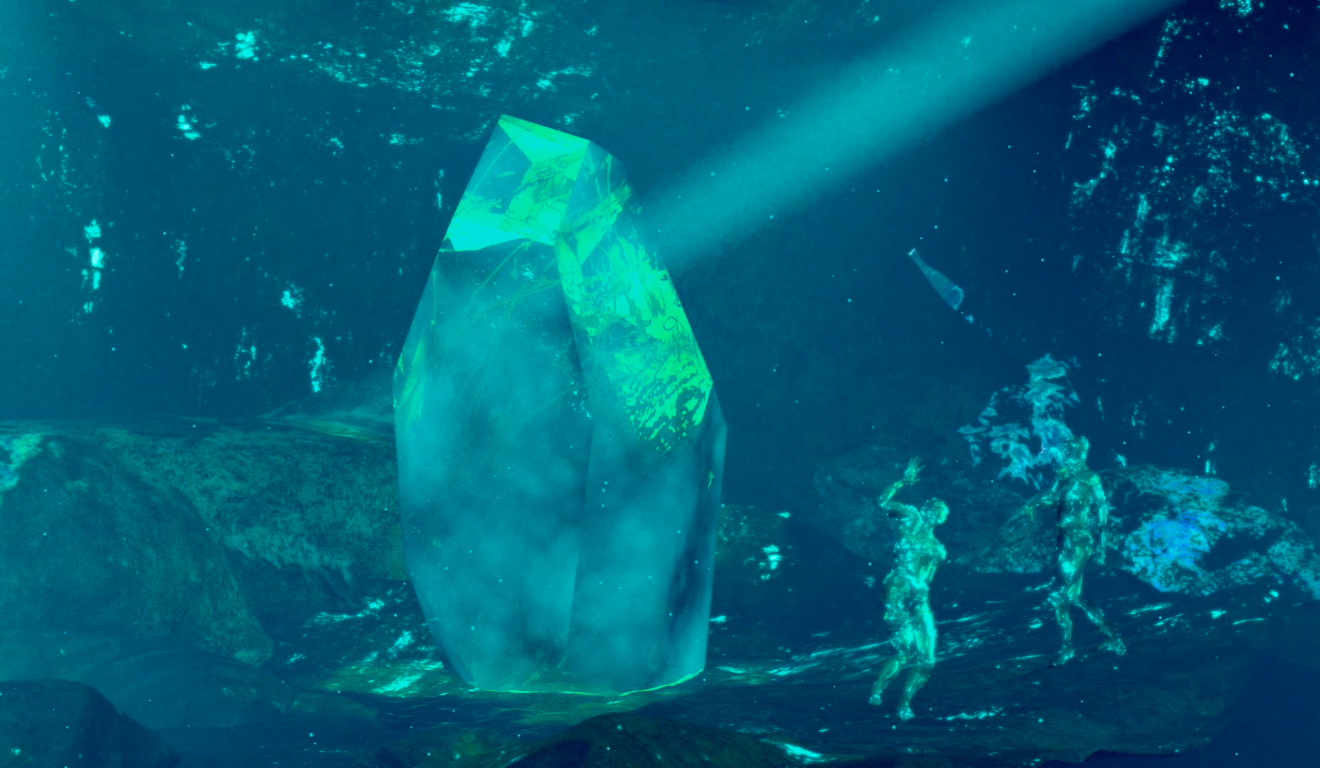
Ben Rivers, Look Then Below, 2019. Courtesy of Ben Rivers and LUX, London.
Presented as a part of the third Coventry Biennial, Listening to the Anthropocene at Coventry Cathedral is a major new exhibition of sound and moving image artworks that explores the ways that field recording and sonic research can help attune us to the shifting state of our planet, at a range of scales.
Newly commissioned and specifically adapted artworks form an immersive sound installation in the Nave of the iconic Coventry Cathedral throughout the duration of HYPER-POSSIBLE.
International artists with relationships to locations that have been affected by climate change present artworks along all six of the Biennial’s HYPER-PATHS, but as the title of the exhibition suggests, all of the artworks are particularly embedded in the Sensing the Anthropocene HYPER-PATH, creating an exhibition that explores the idea that we have moved into a new geological epoch – one that is marked by the impact of human activities on the Earth.
Artists include:
Sarah Badr, Department of Energy, Lamin Fofana, AM Kanngieser, KMRU, Rie Nakajima, Ben Rivers, Simon Scott, Jana Winderen
Notes:
A limited edition 12” vinyl record of the newly commissioned sound artworks from this exhibition will be available from October 2021 via our online shop.
KMRU feature on 52-track Tresor anniversary compilation

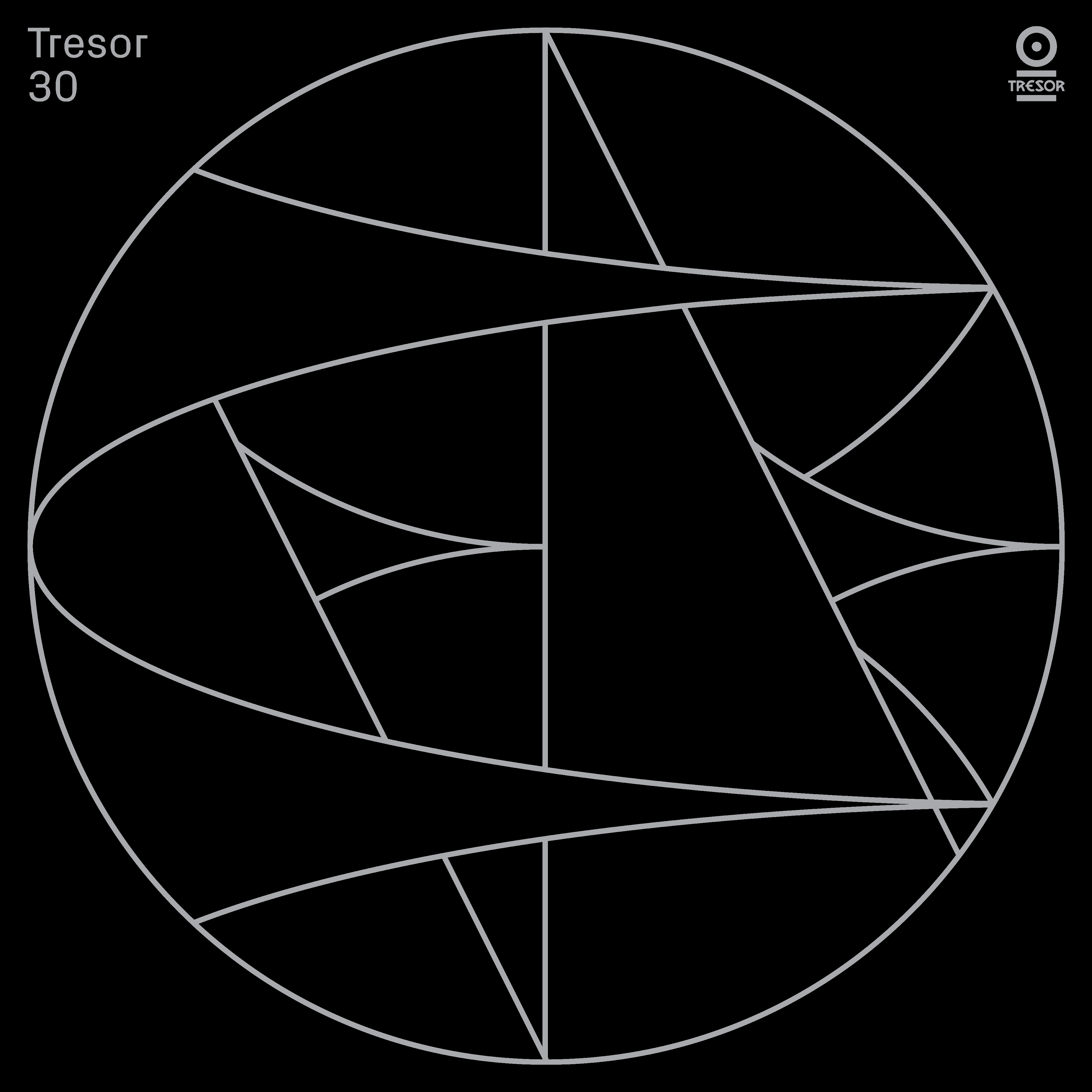
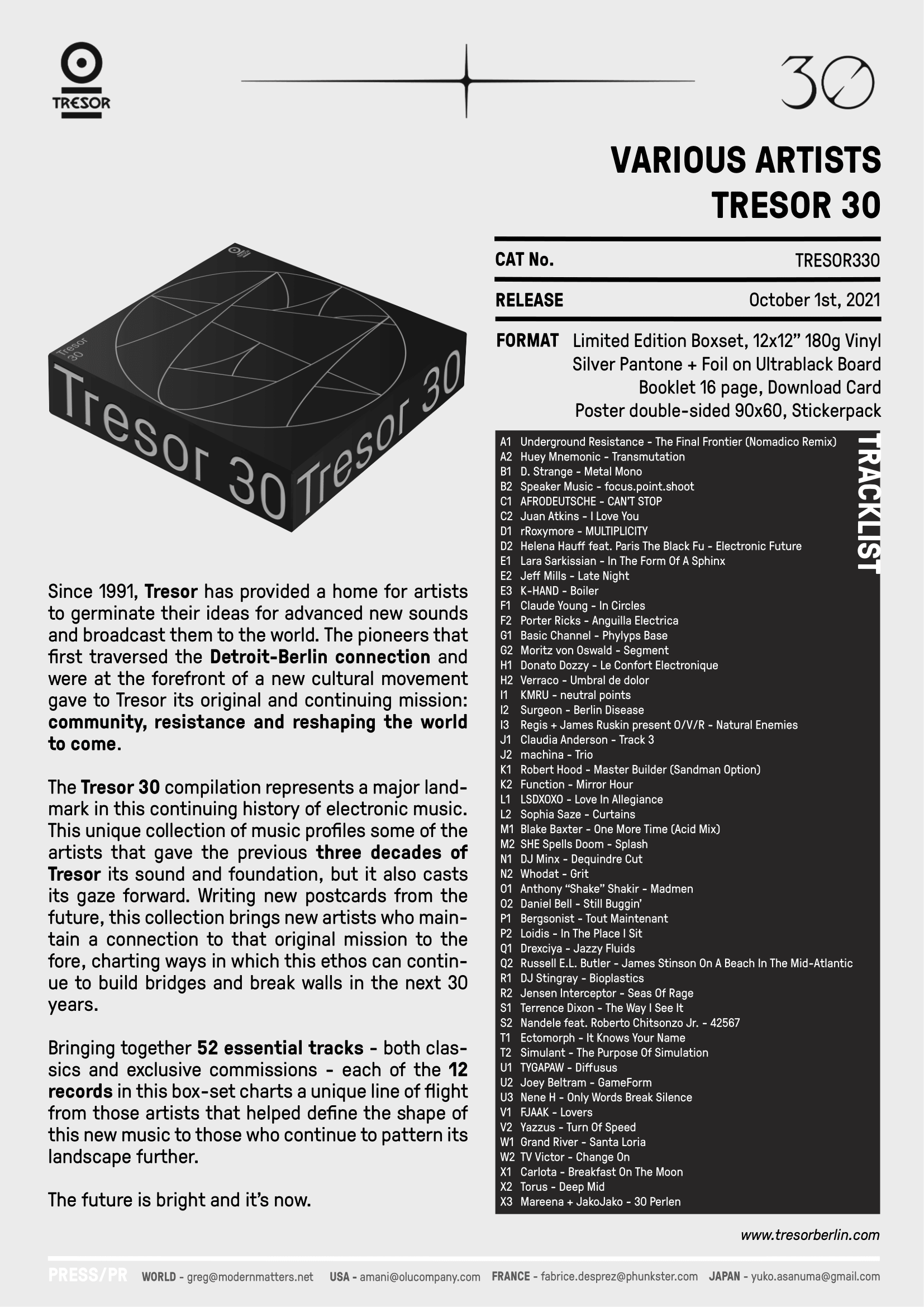
Second round of artists revealed for Rewire 2021

Kenyan sound artist & musician KMRU’s works are made up of disorienting drones, evocative field recordings, noise and improvisation. At Rewire 2021 he collaborates with Dutch filmmaker and video artist Donna Verheijden to create a new audiovisual work responding to one another’s artistic practice. As a contemporary image maker, Donna sees it as a responsibility to analyse and criticise today’s imagescapes.
ELECTRONIC SOUND
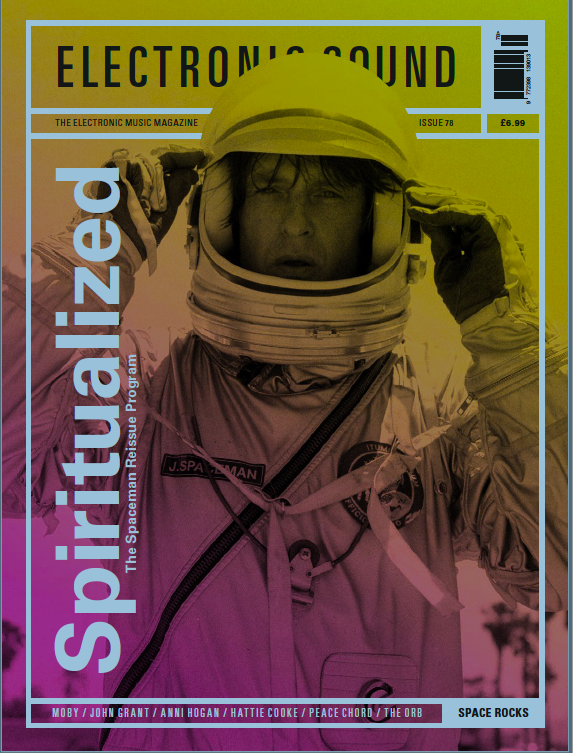

THE WIRE : ISSUE 447
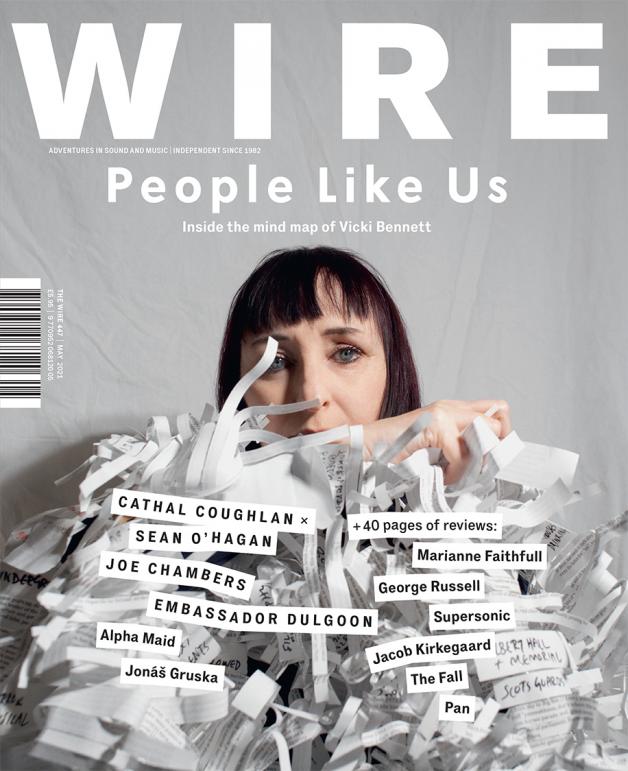

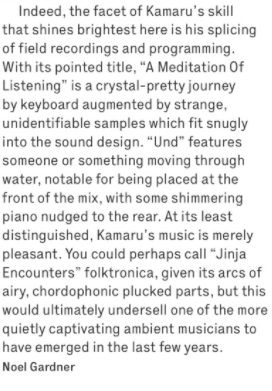

10 under-the-radar releases you may have missed in the last three months
KMRU, FALLING DREAMS
WHO: The Kenyan sound artist captivating listeners from Nairobi to Berlin.
WHY YOU SHOULD BE LISTENING: Over the last year, Joseph Kamaru, aka KMRU, has nonchalantly secured his spot as one of the new decade’s most important ambient artists. His breakout double album, 2020’s Peel, recalled the atomised sonics and textural decay of William Basinski at his finest. Eight months on falling dreams, a recent eighteen-minute opus, captures the endless present of the pandemic with haunting clarity. Across it’s sprawling soundworld, Kamaru’s drone textures undulate like waves lapping gently against the shore. falling dreams is soothing, but what menace lies beneath the waters?

KMRU ANNOUNCES NEW ALBUM, ‘LOGUE’
-The compendium of previously released tracks will be released in May-KMRU will release a new album, ‘Logue’, in May via Injazero Records.
After a breakthrough year in 2020, which saw the Kenyan sound artist releasing three albums – ‘Peel’on Editions Mego, ‘Jar’ on Seil Records, and ‘Opaquer’ on Dagoretti Records – KMRU’s first official release of 2021 is a compendium of self-released tracks, which were previously available through his prolific Bandcamp page.
You can hear, ‘OT’, taken from ‘Logue’ below.
Speaking about the album, KMRU says: “Every track reflects an event, space or location. The pieces are developed from field recordings, improvisation and spontaneity.”
Read our recent interview with the Berlin-based artist, and listen to his captivating Fresh Kicks mix here.
TIMEPIECE
A Living Time Announcement
MaerzMusik – Festival for Time Questions 2021 ends with a 27-hour, lively time announcement, performed live by Berliners on the Grand Stage of the Haus der Berliner Festspiele and accompanied musically by compositions from all over the world – an artistic monument in Corona times, a joint project and a show of solidarity.

MUTEK.ES+AR
HybridEdition
Barcelona+BuenosAires
03_09.05.21
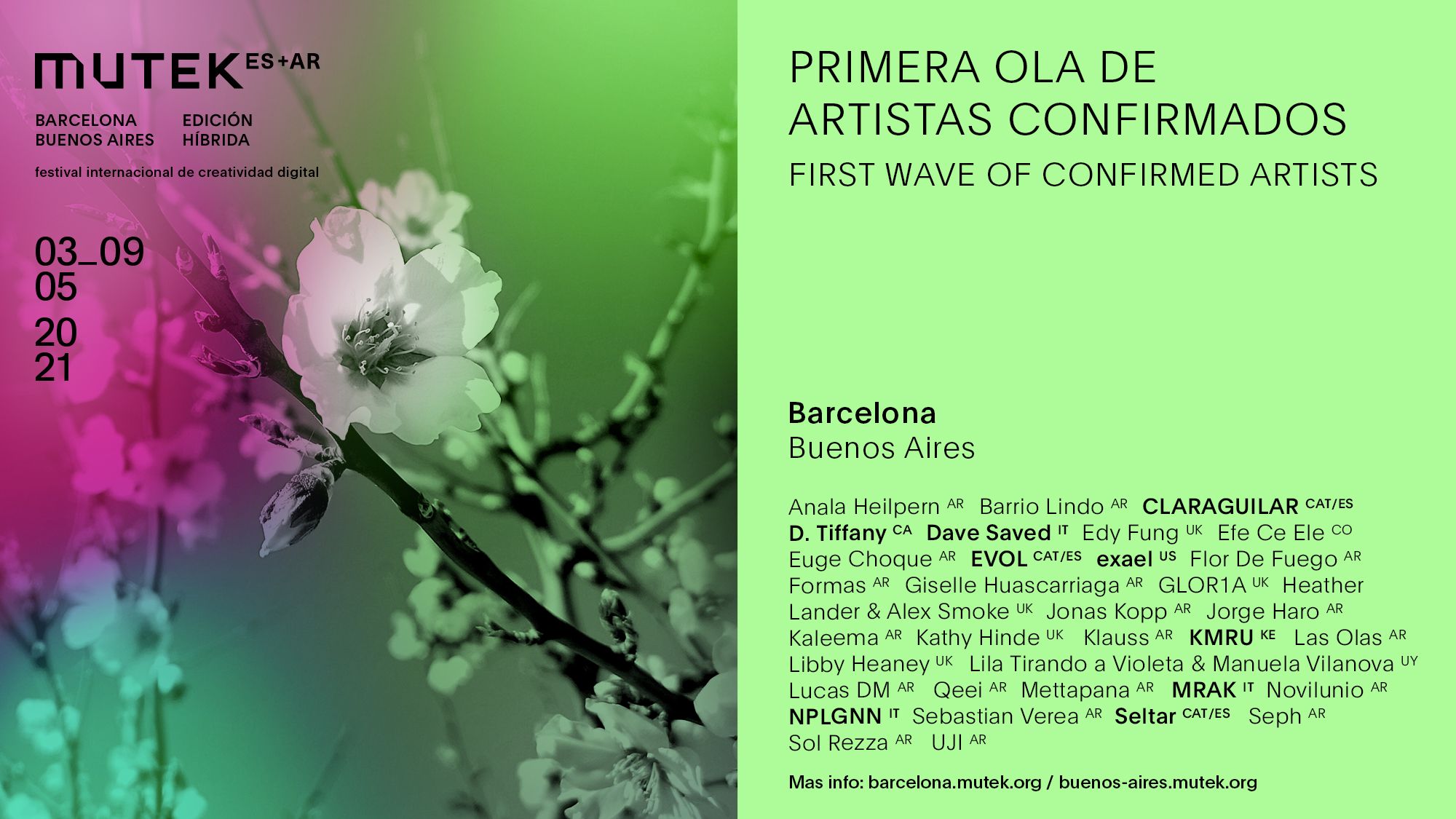

KMRU announces new album of early works
KMRU has an album coming on Injazero Records.Logue compiles the breakthrough ambient artist's self-released material from 2017 to 2019. Its nine tracks are the result of improvisation, spontaneity and field recording in Kenya and abroad. The LP will be released on May 14th, following Peel, Opaquer and Jar as KMRU's fourth album in the past year.The new, compendium album is KMRU's first appearance on Injazero, a London label run by music producer and journalist Siné Buyuka, which has released music by the likes of Heinali and Matt Emery.Listen to "OT," and revisit KMRU's RA Podcast from last year.
![]()
Kenyan sound artist KMRU fuses ambient and field recordings on Logue
Ethereal soundscapes to get lost in.
KMRU is releasing a new album, titled Logue, via Injazero Records this May.
Read more: The haunting beauty of plunderphonics, field recordings and sonic art
Comprising works created between 2017 and 2019, Logue combines ambient with field recordings and analogue synthesis.
As KMRU, real name Joseph Kamaru, explains, “every track reflects an event, space or location. The pieces are developed from field recordings, improvisation and spontaneity.”
Logue follows his Jar album, released in 2020 on Seil Records.
Pre-order Logue here in advance of its 14th May release, check out the artwork and tracklist below.

Tracklist:
1. Argon
2. Jinja Encounters
3. OT
4. A Meditation of Listening
5. Und
6. 11
7. Bai Fields
8. Logue
9. Points
Explore the Intimate Discography of Ambient Producer KMRU
By Daniel Dylan Wray · March 10, 2021
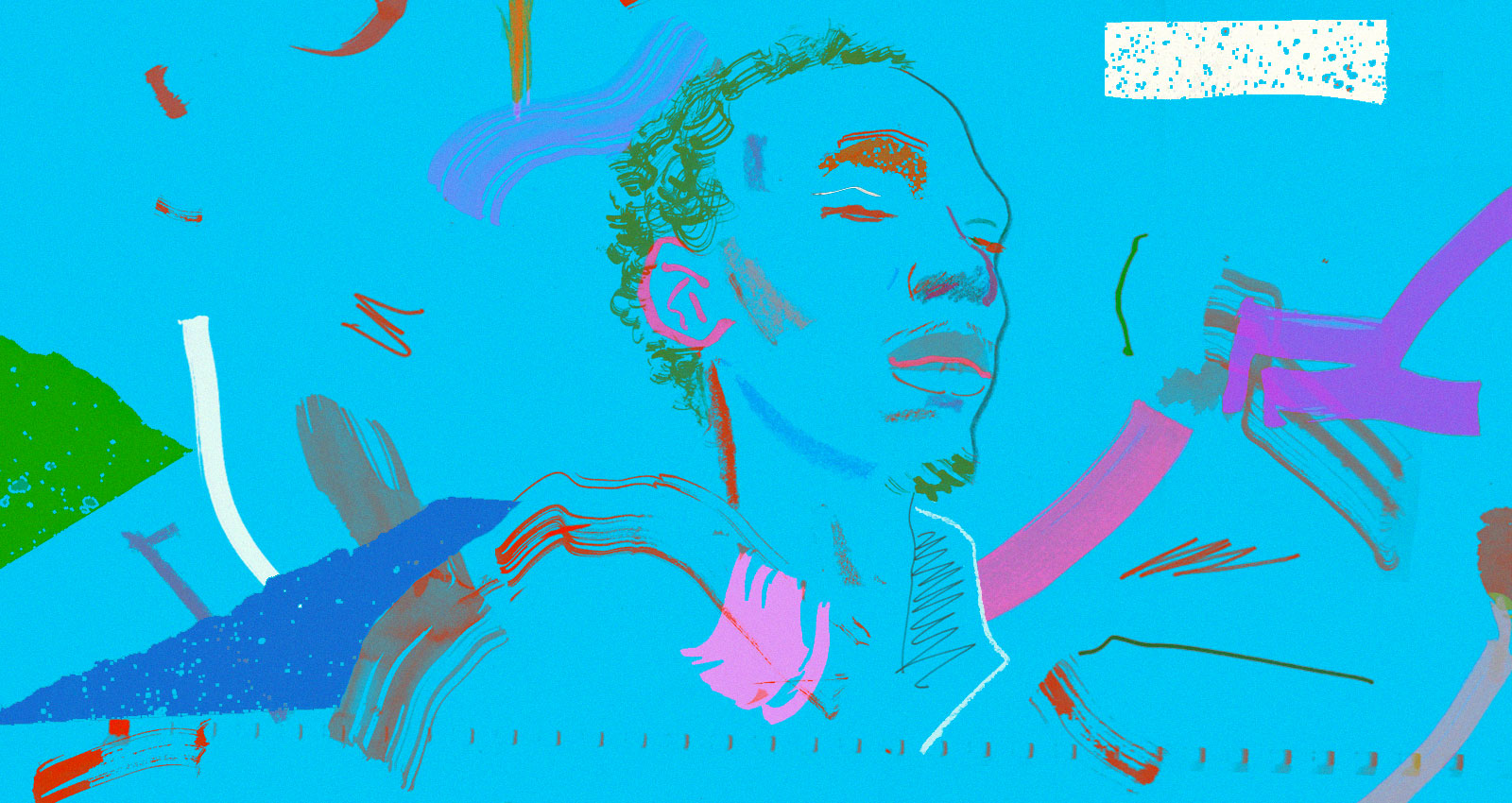
Ambient and drone music, by its nature, takes its time. Rather than charge in with propulsive gusto, it unfurls slowly—emphasizing texture, prolonging tone, and amplifying silence. So it’s slightly ironic that Joseph Kamaru, who records as KMRU, is releasing this meditative music at a blinding rate—he’s logged nearly 20 Bandcamp releases over the last four years. He’s also making it quickly, and via experiments with spontaneity and improvisation. (His 2020 double album Peel was constructed in just 48 hours.)
Originally from Nairobi, Kenya and now living in Berlin, Kamaru comes from a long line of prolific musicians. His grandfather, also named Joseph Kamaru, recorded a staggering number of albums over the course of his lifetime, and after his death in 2018, KMRU worked to introduce a new audience to the elder Kamaru’s music and political activism.
KMRU’s work often feels rooted in a distinct sense of place: In his songs, field recordings from his native Kenya, and the surrounding East African countries are interspersed with billowing drones, deep ambience, and deft electronics. The result is something that is both distinctive and deeply personal, and has established KMRU as one of the most prolific and innovative artists in his field. Here, we present an introductory guide to his work.
SHAPE platform announces 2021 list of artists



Also out this month
The Bandcamp page of KMRU – a sound artist based between Berlin and Nairobi, AKA Joseph Kamaru – is always worth checking out for ambient textures. His latest, Falling Dreams, is like a piece of distorted thrash metal slowed down to a coma pace until it gently pulsates.
First Floor #68 |
After hearing those Broken English Club tracks, you may need something to calm your nerves, and any one of these four tracks should do the trick. KMRU has been featured a lot here during the past several months, and the fast-rising Kenyan delivered another immersive ambient journey last Friday. Clocking in at more than 18 minutes, “Falling Dreams” is more mournful than his past offerings, and while its gloomy palette likely won’t provide much of a pick-me-up, it is undoubtedly beautiful, with wafting tones and mournful strings softly lilting beneath an ominously grey sky.
If-Only Podcast #82: KMRU
Joseph Kamaru, AKA KMRU, enjoyed a meteoric rise to become of one ambient’s most sought after names. The Kenya-born, Berlin-based sound artist has been regular at Uganda’s Nyege Nyege Festival for some time, not to mention being heralded as one of ’15 East African Artists You Need To Hear’ back in 2018, but a Editions Megos debut last year proved to be something of a watershed moment. Serene ambient dream sequencing of the highest order, Peel is Kamaru’s most accomplished work to date.
The Nairobi native’s output has evolved over time. Dealing in field recordings and soft but sonically detailed textures, the emotive electronica of earlier releases has been ditched in favour of delicate, multi-layered soundscapes. These are experiments in repetition and time, compelling, mournful and almost elegiac in tone. That said, KMRU productions often unfurl upon a close listen, revealing layers of brightness that previously went undetected.
Pulling together an hour of ambient and drone, this mix goes some distance towards exhibiting the full breadth and depth of the KMRU sound.

The best DJ mixes of the year 2021 so far
Mixmag's guide to the best DJ mixes of 2021
KMRU 'DJ Mag Fresh Kicks'
KMRU makes ambient music to get lost in and is one of the leading young artists pushing the sound forward. In this Fresh Kicks mix for DJ Mag, he let's a bunch of unreleased music unfurl alongside contemporaries like Malibu, Emily A. Sprague and Jake Muir. The selection acts as a primer to his vision for ambient as well as other artists in the scene making inventive new music. It's also incredibly relaxing, which we're sure you'll appreciate right now.

Best new artists for 2021
Irish drill, jazz violin and supermarket musicals: 30 new artists for 2021From the ferocious hardcore punk of Nicolas Cage Fighter to the ultra-meditative ambient of KMRU, discover new music from right across the pop spectrum

KMRU
The Kenyan musician Joseph Kamaru was little known before 2020, but after a glorious glut of seven full-length releases and various other one-offs arriving on streaming services over the past year, he is now regarded as one of the leading ambient artists working today. Using field recordings of his surroundings alongside software, instrumentation and samples, there are shades of Philip Jeck, William Basinski and Sarah Davachi to his reverberant, richly detailed washes of abstract expressionist sound. BBT
Fresh Kicks 147: KMRU
Kenyan artist KMRU records a deep, transportive mix of ambient electronics, rustling beats and found sounds for the Fresh Kicks series.
Best New Mixes from December 2020
KMRU - Eotrax Mix Series #11
Nairobi-based sound artist and experimental ambient musician, KMRU, had a fantastic year behind him. His brilliant album 'Peel' got recognition from peers, press, and fans around the world. KMRU closes down 2020 with this evocative ambient mix exclusive for the Eotrax record label and its podcast series.
Take in an ultra-chilled live ambient set by Nairobi’s KMRU, and learn technique, too

The 16 Best Ambient Albums of 2020
-Whether offering solace, transport, or simple numbness, these albums perfectly suited a year of lockdown-
By Philip Sherburne
KMRU: Peel
Joseph Kamaru’s Peel appears at first like a series of impenetrable matte surfaces, but the more time you spend with these tracks, the more they soften and open up—like monoliths that, up close, turn out to be made entirely of moss. The Kenyan sound artist put out at least a dozen releases this year, including an hour-long installation piece made of environmental recordings and a gorgeous set of wistful synthesizer etudes, but Peel feels like his most important statement to date. Abstracted field recordings and drawn-out tones pile up in onionskin layers of rustle and drone; seemingly static, monochrome expanses gradually reveal rapid-fire rhythmic movements, as well as slower, steadier cycles. The longer these pieces go on, the more you begin hearing things that you’re not sure are really there, as the sounds of birdsong, moving water, and thunder dissolve into an expansive, all-encompassing shimmer.
Boomkat: KMRU 2020
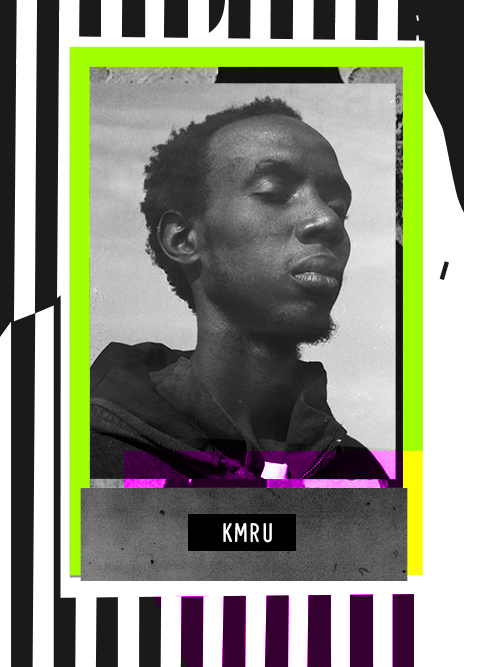

2020's Best Albums
KMRU
Peel + opaquer
Editions Mego + Dagoretti Records
It's fitting that 2020 would produce a breakout star from the realms of ambient and field recording. Kenyan artist Joseph Kamaru, AKA KMRU, had been bubbling up already, but in 2020 he seemed to be everywhere, dropping tracks on his Bandcamp, appearing on the excellent Physically Sick 3, and releasing these two stunning LPs (along with a cassette, Jar) that show the incredible breadth of his sound. Appearing on esteemed avant-garde outlet Editions Mego, Peel is a silky abyss of droning soundscapes and spectral field recordings. Opaquer is its adventurous counterpart, with tracks like "Lost Ones" and "Canthenta" having more in common with bass-heavy experimental music than anything you'd typically call ambient. Together, they introduced many of us to an artist whose music is as powerful as it is subtle.

![]()
Best of 2020: Imagining New Worlds
By Bandcamp Daily Staff ·

KMRU
Peel
Joseph Kamaru, who releases lush compositions as KMRU,
hails from the bustling experimental scene of Nairobi, Kenya, but he
seems more at home in the quietude of its neighboring towns. “I can be
connected and in-touch with my environment, which leads me to listening
more,” he said of his current homebase in Rongai, a dozen kilometers from the city limits. Peel embodies that deep listening. Created in 48 hours,
the record exudes the warm expanse of ambient composers like Daniel
Lanois while incorporating field recordings from nature, building to
dream-like textures. With little notion of traditional meter or pacing, Peel finds cushiony comfort in the slow, liminal solitude that has defined this strange year.-Arielle Gordon
![]()
The Best Ambient Releases of 2020
By Arielle Gordon 
Jar is an album of small differences, or as Joseph Kamaru puts it on the opening track, a “degree of change.” The Kenyan sound designer has had a prolific 2020, releasing Peel in July and Jar only two months later. Kamaru’s KMRU project is one interested in capturing the world through field recordings, and Jar carries that even further beyond Peel’s falling footsteps. “Life at ouri” and “behind there” feature the sounds of children, their faded shouts bridging the gap between playful and peaceful. Elsewhere, Jar feels like a continuation and expansion of the ideas he set into motion on Peel—”space of uncertainty” builds upon his base layer of hiss with chiming, cascading synths, remarkably bright compared to his previous record’s glacial soundscapes. Jar seems to suggest that Kamaru is just as capable of churning out intricate, accelerating melodies as he is at subtly shuffling shifts.

Our 50 favourite albums of 2020
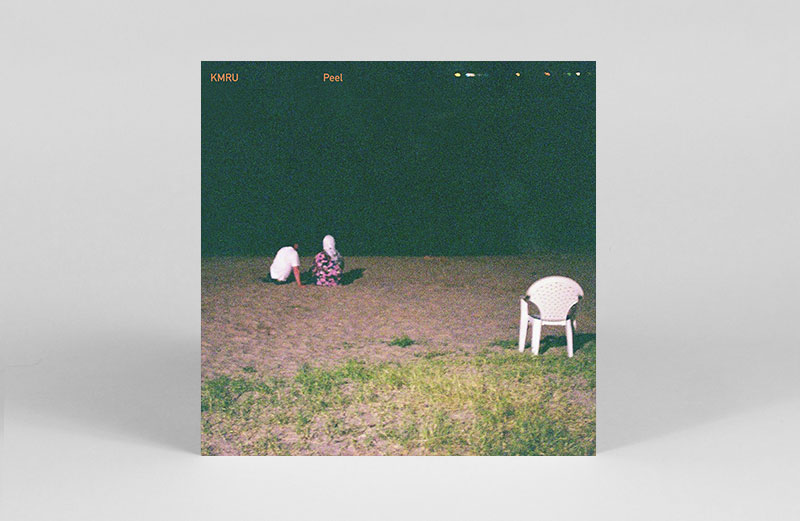
KMRU
Peel
(Editions Mego)
Shrouded in KMRU’s undulating soundscapes lies a beautiful luminescence that radiates throughout. Sometimes the feeling is overwhelming, summoning the kinds of emotions that make you suddenly inhale sharply, catching yourself before it all comes tumbling out. Elsewhere, it conjures a kind of aural stillness equivalent to a misty, desolate lake’s surface at sunrise.
That this depth of work was present across all of KMRU’s releases this year makes Peel all the more impressive still, with ten EPs and digital compositions, in addition to three full length albums, released in the past twelve months alone. (In addition to Peel, his cassette album Jar – “a journey through the dust of time” that includes the breathtaking ‘time of day’ – also deserves special mention.)
Breaking through its own clouds, Peel’s opener, ‘Why Are You Here’ envelops in a delicately lapping synthesizer across 15-sweeping minutes. And from that moment on, you are in a KMRU’s capable hands, inhabiting a delicate world of his creation. Soon, the fugue giving way to waves of piano, to rainfall, to the ebb and flow of sound as it exists in his imagination. In 2020, finding solace through teleportive soundscapes felt as important as ever. Thanks to KMRU, we were able to do so. – GH

2020 Was The Year Of *Trying* To Chill
By NPRPublished
KMRU, Peel
In a year filled with short and painful jolts of information, I found myself reaching for records with a different sense of time. On Peel, Nairobi-based producer Joseph Kamaru, who records as KMRU, creates oscillating ambient music of unhurried change. Individual tracks evoke otherworldly imagery personal to each listener, like faces seen in clouds — a suspended boulder straining against a steel cable as it rocks back and forth, say, or a sleeping cyborg's mechanical respiration. Taken as a 75-minute whole, Peel is an invitation to stretch out, slow down, and experience the present, the only moment we'll ever have. —Mark RichardsonACL 2020 ~ Top Ten Ambient
BONUS: KMRU ~ Peel (Mego)
“Why are you here.” Depending on the context, this could be an innocuous question or an insidious threat. Peel begins with a track of this title, establishing an ambiguity that carries through the entire album. Recorded in one session immediately after returning to Nairobi from Montreal, Peel transforms field-recordings made on that trip, conjuring the traveler’s disorientation and curiosity. Long loops of sub-bass and chirping high frequencies patiently unfold across the double LP, a hint of unease only partially masked by the lull of the droning tones. Peel reaches a fever pitch on “Klang,” about midway through, but it is the culminating eponymous track that is the true climax. Just one of several excellent, and distinct, releases by KMRU this year alone, he is a young artist to watch. (Joseph Sannicandro)
Original Review
ACL 2020 ~ The Top 20 Albums of the Year
12) KMRU ~ Peel (Editions Mego)
Judging from his Bandcamp page, Kenyan musician Joseph Kamaru has had a busy year. However, this full-length record was a leap forward, offering valuable breathing space to his organic ambient productions. The six tracks focus on ebbing loops of sound, with enough approach and retreat to stop from being drones. Initially, KMRU’s sound seems cleanly minimal; but as the long tracks swallow us up, we find hidden textures and details waiting for our senses to attune. Though otherworldly, this music has roots in field recording, and KMRU is inspired by snapshots of the places around him. Clocking in at an hour and a quarter, the album gives him scope to patiently develop his sonic negatives. Though it may refer to a metro station in Montreal, the title also invites the listener to peel back the layers and hear what’s underneath. (Samuel Rogers)
The ambient year

Video Game Water Levels, Drifting Ambient, Dinosaur Music, and More
By Miles Bowe · December 04, 2020
Kenyan sound artist Joseph Kamaru, aka KMRU, has had an incredible and prolific 2020, releasing more than one of the year’s best ambient albums. Many of these are massive—single-track epics stretching nearly an hour; the sprawling soundscapes of his jaw-dropping Editions Mego debut Peel—but he’s just as skilled at composing miniatures like this brief, beguiling EP. Lasting three tracks and barely breaking 10 minutes, drawing water already feels like an essential release in KMRU’s growing discography. Two of these pieces form bookends of dreamy slow-motion synths, with the opening title track merging beautifully with a distant field recording of children playing. Placed between them is the remarkable “matching teal surfaces,” which quickens the pace with a swirling synth-loop that I could listen to for hours. Speaking of which, drawing water is only a short release if you play it once—something that’s proven impossible every time I listen. It’s a release that feels designed for repeat listens, like one of Kamaru’s sound installations, where these perfect 10 minutes can stretch and fill a room for hours
The Best Tracks Of The Year 2020
47 artists from around the world share playlists of their favourite tracks of 2020
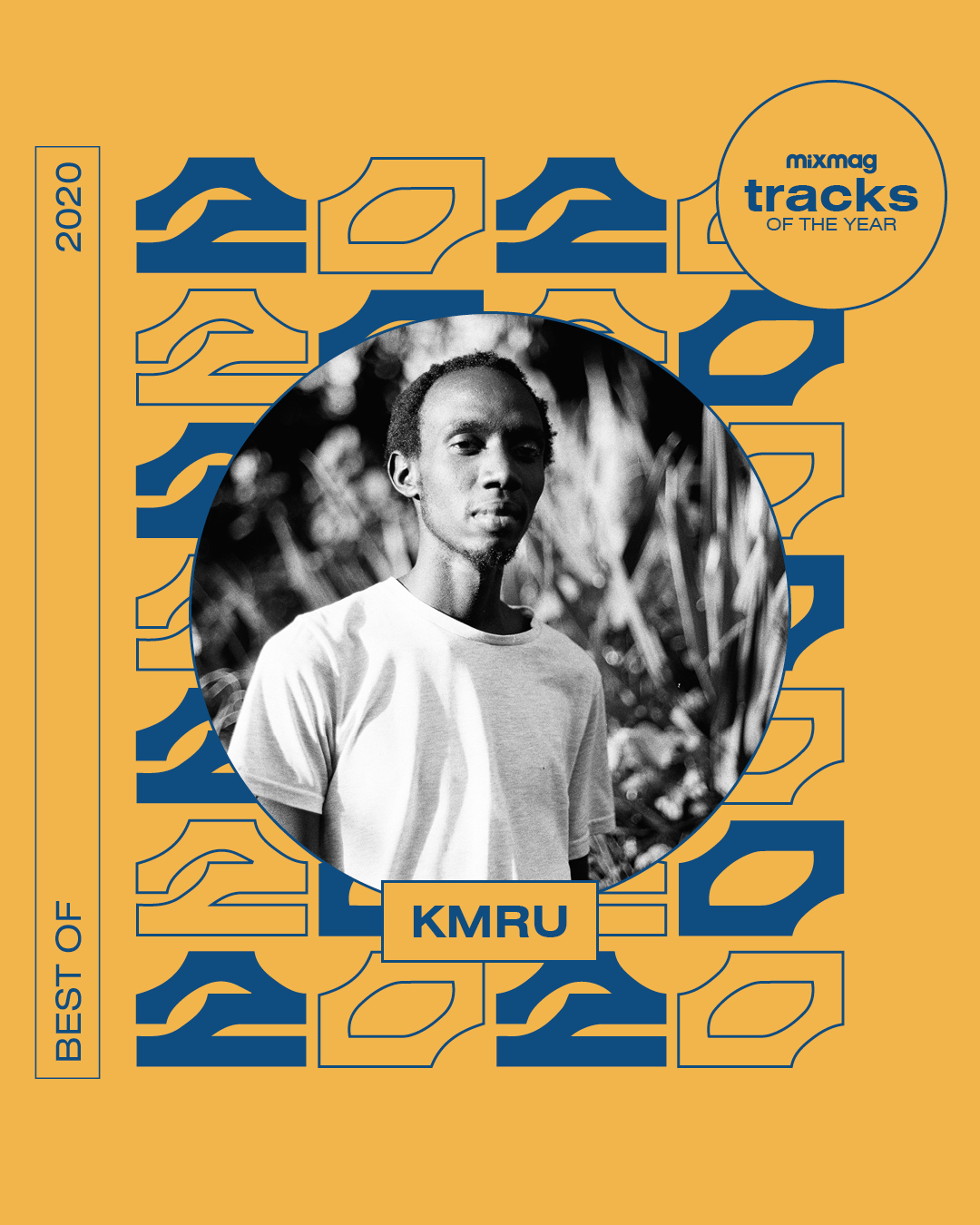
KMRU
2020 has been quite spontaneous and improvised. I wonder how the year would sound in one piece. Nonetheless, these are the 10 tracks/albums/artists that resonated with me this year. All the tracks are a selection from albums that have been important to me, both inspiring and fully expressed records by the artist! There is a deep pour of emotion in every track, a deep feeling that the artists expressed to the world despite these unrest times. I highly recommend to listening to the full records!KMRU is a sound artist from Nairobi. Listen to his music on Bandcamp
https://www.buymusic.club/list/mixmag-kmrus-favourite-tracks-of-2020
The Best Albums Of The Year 2020

KMRU ‘Jar’ (Seil)
It does feel a little nepotistic to choose a KMRU album considering he’s a key member of the Santuri East Africa family, but even with that caveat, it’s definitely been his year. ‘Jar’ was a cassette release on the Frankfurt-based Seil label, and perhaps hasn’t received the same attention as his Editions Mego LP ‘Peel’ - but it deserves just as much recognition. As an ambient/experimental artist from Kenya, KMRU has trodden a singular path, and it’s wonderful to see his unique talent receive international acclaim.

2020: a year in dance music
Instead of our usual end-of-year lists, we’re doing things a bit differently this time. Below, DJ Mag's editorial staff and contributors highlight their favourite musical discoveries of 2020, and reflect on some of the vital topics, personal highlights and key developments of this most extraordinary year

Album: KMRU ‘Peel’ [Editions Mego]
“Every ambient fan’s favourite artist of 2020, KMRU, eased into his stride on this album for the legendary Editions Mego label. The Kenyan artist weaves field recordings and textured electronics into living, breathing audio tapestries. It’s a tonic for the soul.”
Best Albums of 2020
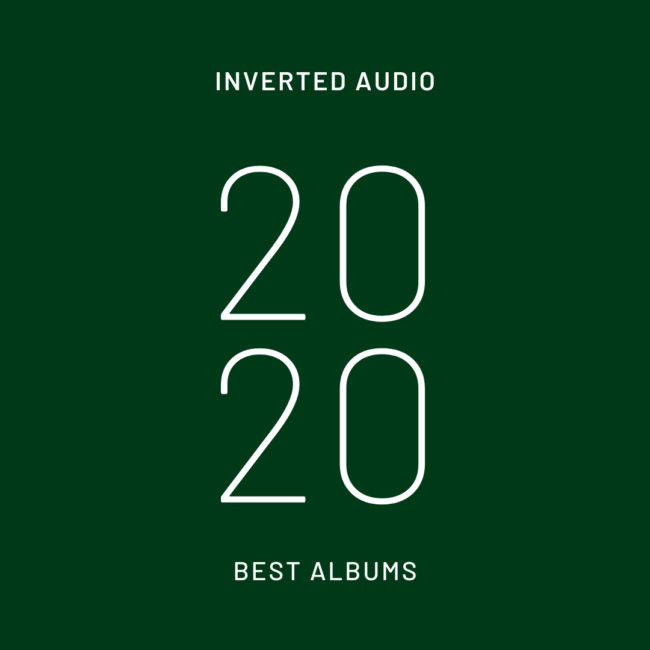
First Floor #58 |
KMRU “Drawing Water” (Self-released)
KMRU “Matching Teal Surfaces” (Self-released)
2020 has been short on breakout success stories (at least in the electronic music realm), but KMRU has undeniably stepped up to claim a spot as one of ambient music’s most promising talents. Only a few months have passed since his album Peel dropped on Editions Mego, and since then, the Kenyan producer and sound artist has unveiled several more releases, including last week’s Drawing Water EP. Bringing together soft melodies and subtle field recordings (“Drawing Water” features the sound of playing children), the music is minimal, but it’s also graceful and inviting, its twinkling melodies and gentle tape hiss coming together to form a sort of lullaby. And while I realize it’s generally not a compliment to say that something puts me to sleep, these KMRU tunes are exactly the sort of thing I’d like to hear when I’m about to drift off into dreamland.
KMRU — ftpim (The Substation)
If you happened to catch Peel, Joseph Kamaru’s wonderful release on Editions Mego in late July, but haven’t paid attention before or since, early December’s half-hour two-tracker ftpim done for (and mastered by) Room40 leader Lawrence English is a Janus-faced example of the Nairobi-based ambient artist’s power. As Ian Forsythe put it in his BOGO review of both Peel and Opaquer, “Something that can define an effective ambient record is an ability to disintegrate the perimeter of the record itself and the outside world,” a line I think about every time I listen to KMRU now. “Figures Emerge” feels more immediately accessible to me as a relatable environment where the gentle, pulsing drone is occasionally greeted by sounds outside the studio, while “From the People I Met” is more difficult terrain, a distorted fog of post-shoegaze harmonic decay — no less interesting, but perhaps more metaphorical in its take on the outside world. (Or not, given how 2020 has gone.)
Patrick Masterson
Stationary Travels
2020 in Review: Ambient & Drone
KMRU is the moniker of Joseph Kamaru, a sound artist, and producer based in Nairobi and a leading exponent of a growing experimental music scene there. Anecdotally speaking, Peel is an album that I observed garnering a great deal of praise not only from listeners but from many fellow artists from around the world and deservedly so. A captivating mix of field recordings and electronics masterfully arranged into hypnotic patterns and subtly shifting moods ranging from short sketches to long form journeys.

The 9 Best DJ Mixes of October 2020
KMRU – KST – 25th October 2020
Joseph Kamaru’s recent Editions Mego album Peel achieves maximum emotion with minimal effort. Very little seems to happen in the Kenyan musician’s swirling ambient tracks, which frequently stretch to 13, 15, or even 23 minutes long, yet they draw you in regardless. Taking in their minutely varied drones can be akin to staring one of Hiroshi Sugimoto’s seascape photographs, where perspective dissolves in a silvery blur. A similar subtlety marks his mixing in this set for the Japan-based DJ KST’s show on Internet Public Radio. Over the course of an hour, Kamaru cycles through 10 tracks so gradually that it’s difficult to say where one begins and another ends. The liquid droplets of experimental harpist Mary Lattimore’s “Til a Mermaid Drags You Under” seem to freeze into the crystalline drones of the Key’s “Of Air (Bethan Kellough),” which in turn give way to the glacial tones of Paperbark’s “Lampshade Dust.” Each successive blend feels like a transformation of matter and energy: a single entity morphing before our eyes and ears.


Field Recording Workshop with KMRU
Field recordings were the very first form of ambient music, before synthesisers even existed, and these days the natural music that they capture is truly global movement. Nairobi artist KMRU will host a workshop on how he builds tracks from sounds from his surroundings in Kenya. Come and take a virtual trip through the rich and redolent sounds of East Africa.
KMRU’s new music for ‘Adidas x Arsenal’ latest spot.
Last month KMRU worked for the latest ‘Adidas x Arsenal’: ‘This is Arsenal’ spot directed by Karim Huu Do and produced by Object & Animal.

Great Records You May Have Missed: Summer 2020
KMRU: Peel
When you’re stuck in the house for months on end, little noises—the whirr of an exhaust fan, the hum of a refrigerator—reveal themselves. Nairobi, Kenya electronic producer Joseph Kamaru’s debut for respected experimental label Editions Mego (Fennesz, Jim O’Rourke) sounds like what would happen if every suddenly conspicuous drone and burble in your apartment conspired to compose a symphony. Throughout the album, the 23-year-old, who has released a string of gorgeous records as KMRU during quarantine, smears treated field recordings and ambient tones to create engulfing sound worlds that are at turns calming, distressing, mysterious. Peel’s title track painstakingly builds up across nearly 23 minutes, accruing power with every repetition. At one point, what could be the trill of an ancient landline seeps into mix. Kamaru lets it ring. – Ryan Dombal

The Best Ambient Music on Bandcamp: September 2020
Nairobi sound artist KMRU crafts sounds that seem infinite; his Peel LP from this past summer layered electronic synthesizers until they reached near-cacophony, but his natural knack for rhythm reign in his compositions just as they threaten to overflow into chaos. Like his grandfather, the politically-inclined musician Joseph Kamaru, KMRU weaves observations about his surrounding world into his work. But whereas his previous releases teemed with towering digital layers, Jar finds KMRU adapting a more human approach to sound design. His swirling synth symphonies still set a peaceful tone, but the low murmur of human voices chattering on “behind there” and the quiet interpolations of children’s playground shouts on “life at ouri” conjure the warm comforts of listening to music in a park or at a backyard gathering. It’s almost as if KMRU, not content with simply designing for vinyl and headphones, set out to sound design the quotidian interactions of life itself.

KMRU shares new album, ‘Jar’, on Seil Records
10% of proceeds from the album's sale will go to non-profit organisation Afrorack
KMRU has released a new album via Frankfurt cassette label Seil Records.
Titled 'Jar', the eight-track release follows on from the sound artist's recent album 'Peel', which came out on Editions Mego in July. As with all of Seil's releases, 10% of the proceeds from sales of 'Jar' will go to its non-profit organization of choice for this quarter, Afrorack.
"'Jar' is a journey through the dust of time," says the Bandcamp description for the album, adding that it merges "found sounds, analog warmth and granular dreams along the way". You can check out the album below and purchase it here.
'Peel', KMRU's album for Editions Mego, featured amongst DJ Mag's round-up of essentials for August's Bandcamp fee-waive day.
A three-track self-released EP from the producer called 'odra' also featured in our round-up of Bandcamp essentials for July.

KMRU releases new album, Jar, on Seil Records
The eight-track full-length is out via the Frankfurt cassette label now.

KMRU's next album is out now on Frankfurt cassette label Seil Records.
"Jar is a journey through the dust of time," the Bandcamp description for the eight-track full-length reads. As with all releases on the label, 10 percent of proceeds will go to its non-profit organization of choice this quarter, Afrorack.
This is the latest in a rush of new music from Joseph Kamaru. He's recently released the RA-recommended album Peel on Editions Mego, another LP inspired by it called Saal, plus full-length opaquer on Dagoretti Records and a collaborative project with Slikback, Karun, FlexFab, Tite, Pier Alfeo and Jinku under the name Extra Muros.
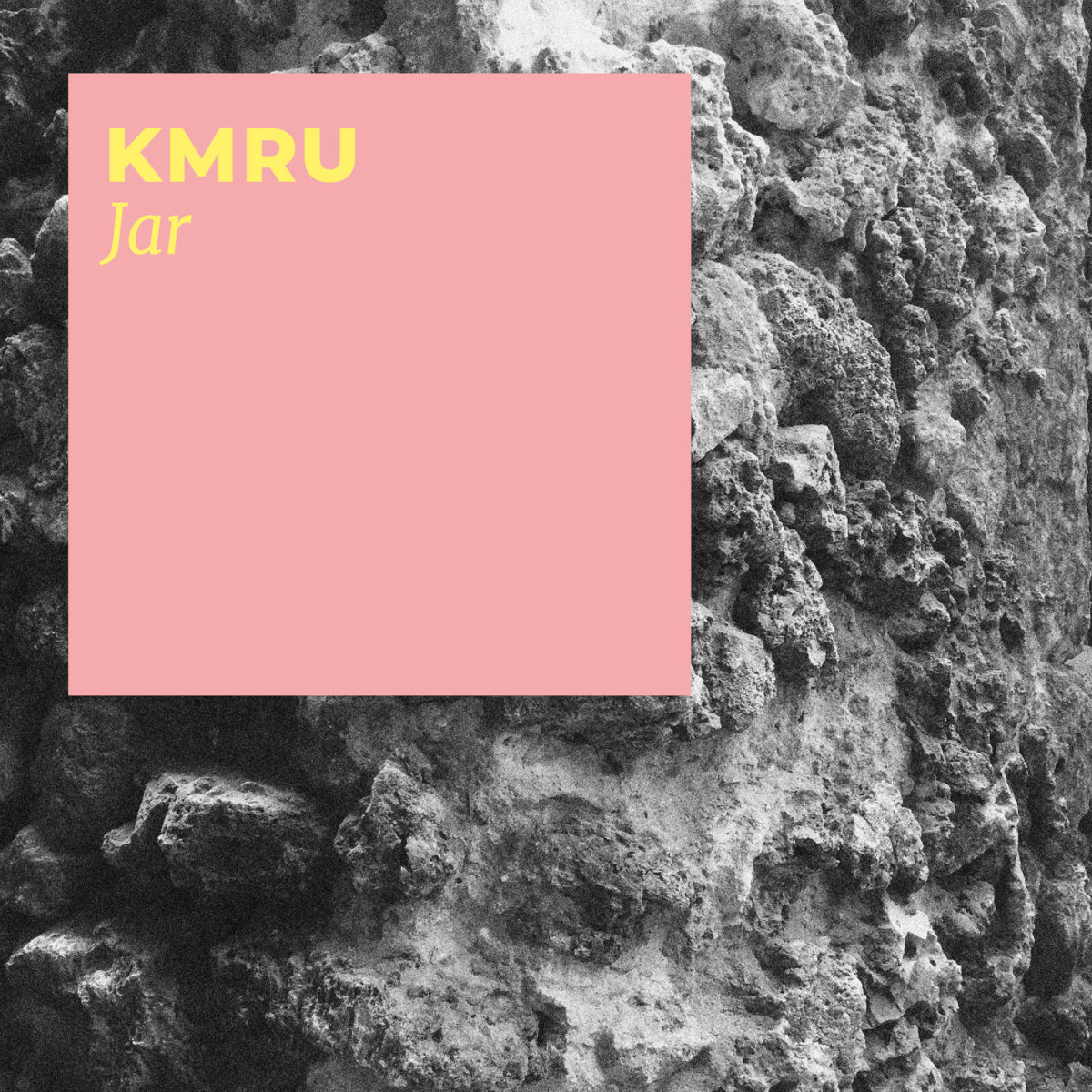
∞ o'clock featuring David OReilly’s Quarantine Dreams
This six hour long experience, repeated four times across twenty-four hours, begins with Quarantine Dreams by the Irish artist and filmmaker David OReilly.
Earlier this year, OReilly set up a voice mailbox to record people's dreams during the pandemic, and used them to create Quarantine Dreams - layering narrated dreams with formless music, and stunning geometric imagery. The result is a mesmerizing, unsettling journey that intertwines individual thoughts and subconscious fears, with each voice exploded through cascades of choreographed objects.
Following Quarantine Dreams is almost 6 hours of music called ∞ o'clock, made by artists from around the world including Los Angeles musician Emily A. Sprague, Berlin-based Columbian musician Lucrecia Dalt, French artist Félicia Atkinson, Poland’s Bartosz Kruczyński, Chicago-based Forest Management and Kenyan artist KMRU. The music is designed to allow one to sleep, listen, or enter a meditative state. Throughout, OReilly will perform abstract animation designed to relax your attention and give your imagination space to explore.
∞ o'clock will run six hours in length, and will be repeated four times across a 24-hour period before disappearing forever.

LISTENING SESSIONS: WHO DOES SOUND BELONG TO? / WITH JOSEPH KAMARU AND SVEN KACIREK
The discourse surrounding postcolonialism and its public understanding is currently strongly biased towards the restitution of material cultural goods. But there are questions concerning the idea of “ownership” even with regard to intangible items of cultural heritage and who is authorised to handle them. It is essential to take a closer look at structures, which are characterised by colonial developments, for instance in the music industry.
In terms of music and sound, what value should we attach to original, copy, amalgam, bricolage, (un)authorised appropriation, mix and sample? Working with a variety of sound objects in a “blindfold” situation with groups of up to 10 people, Joseph Kamaru and Sven Kacirek investigate whether aesthetic dominance can be heard, the role played by “authenticity”, and whether cooperation projects lead to a mutual penetration of art that is genuine and equal.
Kenyan sound artist and producer KMRU “journeys through the dust of time” on Jar
Jar is a journey through the dust of time. Merging found sounds, analog warmth and granular dreams along the way.
Bringing together delicate, celestial ambient with found sounds.
Sound artist and producer KMRU, aka Joseph Kamaru, has released a new album called Jar, via Seil Records.
Read more: Sound Fields: Adventures in Contemporary Field Recordings
Described as a “ journey through the dust of time,” across Jar KMRU merges “found sounds, analogue warmth and granular dreams.”
As with all Seil Records releases, 10% of proceeds will be donated to charity, with profits from Jar going to Afrorack.
Jar follows KMRU’s contribution to Extra Muros / FLEE’s Extra Muros – Kenya compilation – one of our favourite albums in September
033: Our Favorite Albums, July-September 2020
Joseph Kamaru has released so much music in varying styles over the last year that, given his youth and evident ambition, it’s almost tempting to wonder which of his strategies won’t work, and what he’ll learn from that. But that’s a game for a more optimistic time. These past few months, I’ve wanted generous expressions of clarity, and Peel is as redolent of that as any dappled kosmiche LP, any Japanese department store scene-setting, any pre-millennial anonymous collective drone. Its long loops, on headphones, are aural ring-lights. On a bedroom stereo, they are white noise machines without the vaguely sinister psyop echoes or self-care woo-woo—they are weighted blankets of sound. I’m currently masked and rubber gloved and hurtling on a train past the extended sigh of the Hudson River in autumn, the air and water a dozen kinds of gray accessorized with foliage, and the ebb and flow of Peel sounds of all that, too. The gradated crescendo of the title track manages to convey today’s prickles of anxiety, formless (or, actually, discretely formed and easily clocked) dread, the endless whoa of how things just seem to worsen. Its roar, though, starts to glitter, as if suddenly covered in dozens of glints of recognition—you hear this too—or like confetti for a party celebrating the ability to feel at all right now. Peel is just confident, which is rare for work so vague, and it brings comfort, which I at least don’t deserve but will cling onto for dear life this fall. —Jesse Dorris
Purchase Peel at Bandcamp.
First Floor #51
KMRU “Note 43” (Seil)
Amidst all the chaos of 2020, KMRU appears to be having an excellent year. Less than two months after the release of his Peel album for Editions Mego, the Kenyan ambient specialist has returned with a new cassette, Jar, which has been billed as “a journey through the dust of time.” The whole thing is gorgeous, but the slow burn of “Note 43” is uniquely potent, especially as the song’s bubbling synth melodies gradually swell, briefly burn bright and then recede over the course of eight and a half minutes. All the while, KMRU weaves in subtle field recordings—which sound like kids playing in the street—evoking sunny days and happier times, or at least our nostalgia-warmed memories of them. It’s a beautiful trip, and a fantastic salve for the creeping gloom of the real world.

Peel
Editions Mego
Meditative ambience from Kenya
8.5Listening to Nairobi-based artist KMRU’s debut album on Editions Mego, you find yourself in a cocoon of delicate soundscapes that evolve so glacially that time seems to melt away. Tidal wisps of melodies, field recordings and textures ebb and flow; these layers unfurl in new and different ways each time we sit with ‘Peel’. Also ever-changing are the different moods and moments across its six tracks: the ethereal calm of ‘Solace’, the melancholic dissonance of ‘Klang’, and the woozy yearning of the almost 23 minute-long title track. KMRU’S talent lies in how much he’s able to convey emotionally through such minimalist compositions — these intricate collages don’t feel cluttered or fussy. With his star on the rise, and another stunning album due on Dagoretti Records this month, KMRU’s meditative, enveloping tranquility feels like sweet relief in these uneasy times.
ZARA WLADAWSKY Zara Wladawsky

In just 48 hours, KMRU made something more than worthy of Editions Mego's stellar catalogue
In just 48 hours, KMRU made something more than worthy of Editions Mego's stellar catalogue.
Peel, Joseph Kamaru's first release for Editions Mego, was conceived as a time-restricted experiment in texture, influenced by "experiences travelling in Montreal, as well as being back in Nairobi just before lockdown." It comes as the Kenyan artist is deservedly earning widespread recognition for his delicate, ambient works. His Bandcamp page is a goldmine of introverted electronic music, and Peel is one of two albums he released in the last month.
Often the most interesting person in a room is the one who demands the least attention. Void of any dramatic gestures, Peel's tracks are unimposing and create a pillowy, womb-like space to relax in. Some are founded on such pure ideas that they recall the concept of Grand River's aptly-titled label, One Instrument. Peel doesn't sound like KMRU playing any specific instrument though—it's more like a stream of formless and organic sounds that grow and erode as the tracks progress.
The whole record is a remarkably smooth ride where minute field recordings and infinite pad sounds gently undulate as if they are breathing. As you track a certain frequency, the others envelop you while drifting in and out of focus. "Klang" peaks the intensity with resonant synth notes and the wash of distant waves. Just shy of 23 minutes, the title track is an epic, snowballing wall of sound. Both triumphant and saddening, it's a poignant end to the album.
Though the stripped-back ideas and freewheeling arrangements feel very instinctive, it's still astonishing that this record was made in just 48 hours. Kamaru said he is "always happy to have limitations while making music, and Peel is a good example of this." He gives the impression that more time wouldn't have yielded better results.
The second KMRU album, Opaquer, landed three weeks after Peel. If you want to hear the breadth of Kamaru's talents, I'd go for Opaquer. If you want to hear his ability to laser in on a very focused idea and extract from it 75 minutes of special music, choose Peel.
A dream sequence of ambient and drone from the Nairobi DJ and producer.

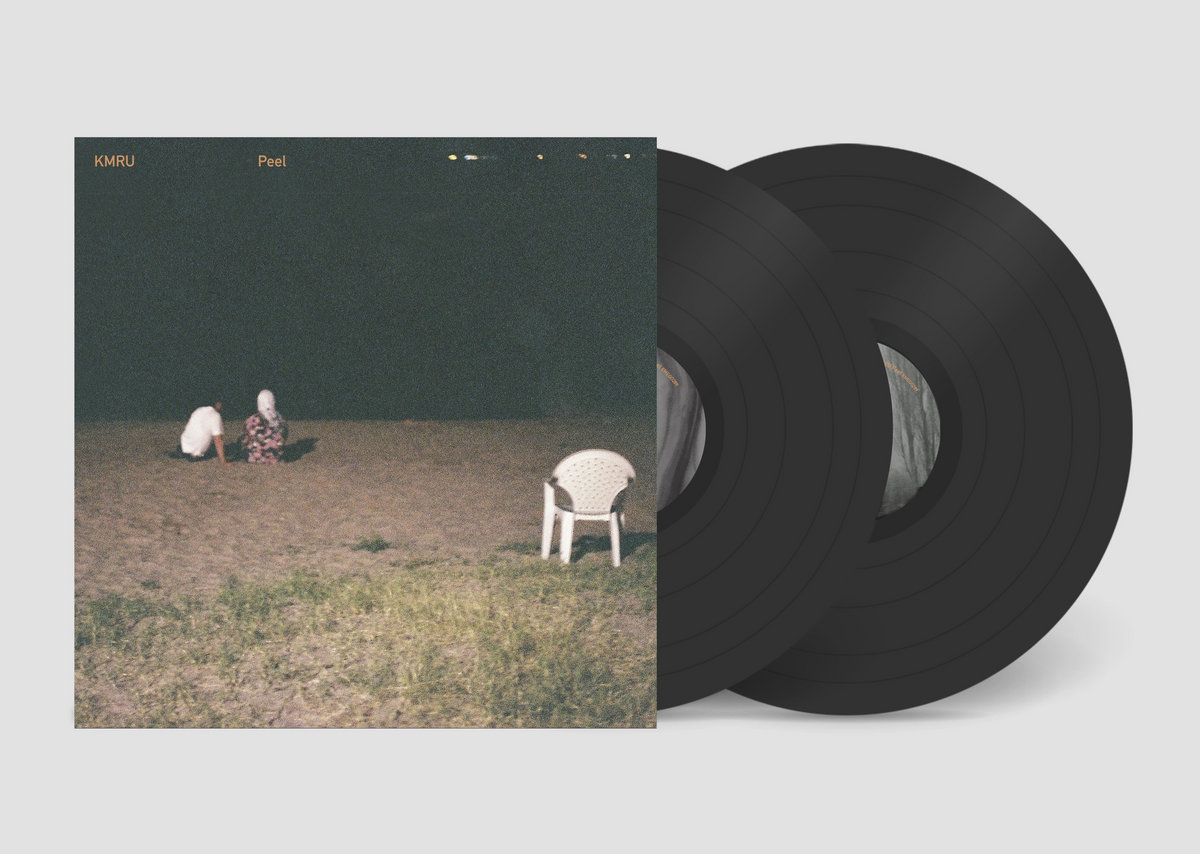
KMRU Unveils Peel Lp on Editions Mego
Bandcamp Pre Order

Essential Releases: Jangle Pop, Nairobi Experimental, Hardcore Punk and More By Bandcamp Daily Staff ·
August 14, 2020Peel, the excellent new album from Nairobi sound artist KMRU, comprises slow-rising field compositions meant to simmer in the background. It sets a meditative mood, and through looping electronics and a relaxed pace, Peel slows your pulse and drops anchor in your spirit. It’s not about standout songs; between its sprawling bookends, “Why Are You Here” and “Insubstantial,” the music works as a continuous listen when you allow the ambient drone to fully occupy your listening space. Peel is somewhat darker than odra, a sun-kissed EP with chirping birds and bright, darting synths. This one’s set in the dead of night, when nothing’s moving but the sun inching closer to dawn. Play Peel on repeat, and don’t move when you do.
El músico experimental keniata KMRU debuta en Editions Mego
Peel es su debut en Editions Mego, un trabajo de seis piezas en las que mezcla de forma exquisita "grabaciones de campo y electrónica que se desenreda a un ritmo repetitivo y pausado para exponer un rico tapiz de sonido que ha sido venerado por su capacidad de cruzar las fronteras con una profunda corriente de contenido emocional".
![]()
Kenyan sound artist KMRU unveils new album on Editions Mego

Mixing field recordings with electronic ambient.
Sound artist and producer KMRU, aka Joseph Kamaru, has releasing a new album – Peel – via Editions Mego.
Peel’s 6-tracks see him “improvising with field recordings, drones and textures,” shares KMRU. It follows his contribution to FLEE’s Extra Muros-Kenya project and compilation, the latter of which will be released this September.
Our favourite new vinyl releases this week (24th July)

KMRU
Peel
(Editions Mego)
Buy
Mixing meditative drone and ambient through field recordings, Kenyan sound artist KMRU steps to Editions Mego with album, Peel. Inspired by his last trip by his last trip in March before lockdown as well as his return journey home, its 6-tracks teleport you to a serene land. Ideal for gazing up at a cerulean sky dotted by cumulous, or pretending to. – GH

KMRU's ambient album for Editions Mego was made in 48 hours
The six-track LP, titled Peel, is out at the end of July.
Joseph Kamaru, AKA KMRU, is releasing an ambient album titled Peel via Editions Mego on July 31st.
The album, made up of six longform pieces, is named after a metro station in Montreal. The music captures "my experiences traveling in Montreal, as well as being back in Nairobi just before lockdown," says Kamaru, who was highlighted as an East African producer to watch by Kampire Bahana in a 2018 article on RA.
"I've been studying repetition and time in sounds, and Peel is one of the experiments from this," says Kamaru. "I tend to work freely and effortlessly on my textural sounds or ambient, not using any metronomes and just hitting record and improvising all the way. I'm always happy to have limitations while making music, and Peel is a good example of this. I recorded the entire project in 48 hours."
Kamaru said working on Peel inspired another ambient project, called Saal, which you can listen to below.
Bandcloud 305 feature
|
|

KMRU – Peel (Editions Mego)
By Nick Roseblade · On July 24, 2020KMRU might not be a name that you are familiar with. This will change by the time you read this review. If you read the review that is. You might decide to cut your losses and either scroll to the bottom and listen to the link or go back to listening to that thing you always listen to. Both are valid responses, but as you are still reading this, I hope you are here for the duration.
KMRU, or Joseph Kamaru to his friends, is a producer and sound artist based in Nairobi who has been steadily releasing singular music since 2017. He is part of a scene consisting of like-minded musicians making exceptional experimental music, of which he is one of the leading lights. The music KMRU makes lies somewhere between ethereal soundscapes, drone, and avant-garde electronica. His latest album Peel is a gloriously diaphanous affair where at times you aren’t sure if you are listening to music or witnessing steam gently escaping from our speakers. The songs are made up of field recordings and delicate electronic melodies that slowly repeat, and revolve around you, creating a feeling of flux.
The title is apt, as with each one KMRU removes another layer to expose even more, or is that, less, of the album. ‘Klang’ is the track that epitomises this. Opening with sounds that are reminiscent of a film projector, a delicate melody slowly swells and builds underneath until it is almost all consuming. But then KMRU does a clever thing. Instead of letting this melody be the sole focus of the song, he then starts to rebuild ‘Klang’ from within. There are minimal synth lines that appear only to vanish immediately. There are piercing motifs that appear to get brighter and brighter as the song progresses. Subtle basslines act independently to create one hulking mass that lies just below the surface. As ‘Klang’ enters its final third the music has gradually shifted. Instead of the swelling melody being the sole focus, it has started to disappear back into the fuggy ether of the song, and those beautiful shrouded motifs. The standout track is the self-titled album closer. For 23 minutes ‘Peel’ gracefully undulates along. It doesn’t rush to get its point across. Synths are brought in with glacial slowness that are exquisite to experience.
There is a chapter in Italo Calvino’s classic book ‘Mr. Palomar’ where the title character, in fact the only real character in the book, watches waves. He sits on a bench and stares out to sea. He picks one out on the horizon and tries to follow it all the way to the shore. It’s harder than it sounds, but if you manage to do it, incredibly exhilarating. The real joy in ‘Peel’ comes from doing the same, when KMRU starts to bring in a new tone. At first it is barely perceptible. You just know something is slightly different. Then with all the precision of a long-distance runner, or a tour riding cyclist, it starts to make its intentions known. Gradually the sound starts to make presence more prominent until it is your sole focus. It is at this point that he starts to introduce another tone. Then the process begins again.
The more you focus and try to listen to ‘Peel’ the less you hear, as you are too wrapped up on sound, rather than the piece as a whole. And this is KMRU’s charm. He creates dense soundscapes that are meditative and sonorous but also feature brutal melodies. The kind of melodies that latch themselves onto you and never let go. The overall vibe of ‘Peel’ is one of tranquillity. Everything might be going a million miles around you, but once you press play you are in a slow-moving bubble. This is the kind of album that we all need. It removes you from the world around you and makes you concentrate on minute details for a short period of time. This album isn’t ambient, or drone, or noise for that matter. But it is sublime and one of the most transfixing releases in recent memory.
NEW THIS WEEK: First Floor
The following is a rundown of my favorite tunes that came out during the past week or so. Click on the track titles to hear each song individually, or you can also just head over to this convenient Buy Music Club list to find them all in one place.
KMRU “Why Are You Here” (Editions Mego)
Another one for the more patient listeners out there. “Why Are You Here” is the 15-minute opener from KMRU’s new album Peel, which he incredibly recorded in only 48 hours. Although the Kenyan ambient artist makes his home in Nairobi and says the LP was partially inspired by a recent trip to Montreal, “Why Are You Here” feels untethered to any specific geography, its slow oscillations conjuring images of water quietly lapping against the shore or a batch of freshly hung laundry gently swaying in the breeze. From a production standpoint, the music is rather minimal, consisting of little more than a cloud of mushy reverb, a softly repeating melody and what sounds like a tiny echo of a human voice, yet that’s more than enough to create a palpable sense of serenity.
OSMR: KMRU – Peel
Posted on July 30, 2020 by Kevin Press
Nairobi-based sound artist Joseph Kamaru combines field recordings and synth drones to produce deeply peaceful, contemplative work – this new LP is a stand-out success.
Boomkat Peel Review.
Nairobi, Kenya’s KMRU debuts on Mego with a suite of serene ambient scenes after emerging with Four Tet-like electronica releases in 2019 and recently starring on ‘Alternate African Reality - Electronic, Electroacoustic And Experimental Music From Africa And The Diaspora’
Known as Joseph Kamaru to his pals, KMRU was hailed by RA as one of ’15 East African Artists You Need To Hear’ in 2018 and is a regular performer at Nyege Nyege Festival in Uganda, beside performing at CTM and Gamma Festival. For his Mego release ‘Peel’ it appears he’s been listening to label hero Fennesz, the Austrian experimental guitarist, or Will Long aka Celer, with whom his tracks share a certain, longing melancholy in their long, sighing arrangements of glistening and creaking ambient pads and mournful post-rock/cienmatic elegance.
“The subtle calming atmosphere within Peel belies the compositional prowess as layers of delicate sounds wrap around each other creating a hybrid new form ambient musics both captivating through it’s textural depth and kaleidoscopic patterns. The track titles lend themselves to the themes and mood set within: Why are you here, Well, Solace, Klang, Insubstantial and the title track. This is a deep heartfelt journey with a new strong voice being expressed through the means of organically presented electronic ambient sounds, one which reveals further layers on repeat listens.”
Premiere: Rone - Room With A view (KMRU Remix)

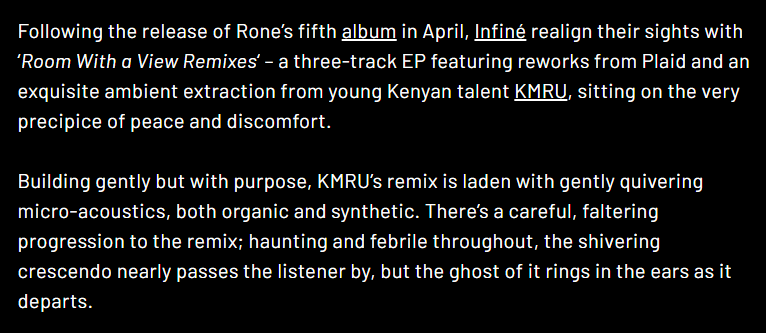
Needle Exchange
KMRU Makes Us a Mix of Ambient and Experimental Music
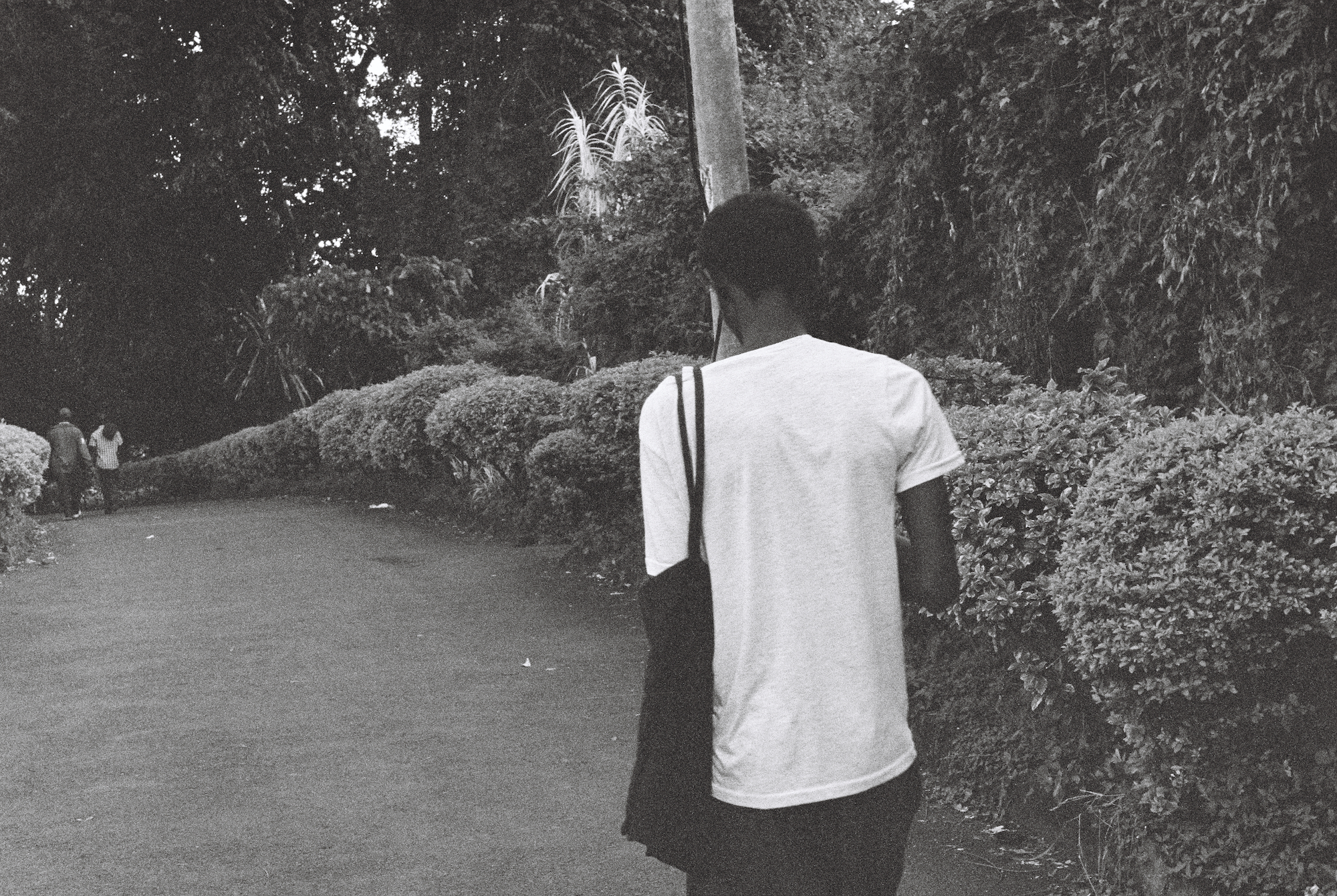
When Patricia Wolf shared a playlist of pain-relieving pieces earlier this month, one song immediately stood out: KMRU’s “Continual” single, a slow-moving stunner capable of stopping time itself.
Turns out there’s a lot more where that come from. Over the past three years, the Nairobi-based producer has unleashed a wealth of widescreen ambient works through his Bandcamp page, peaking with today’s Peel LP. KMRU’s first Editions Mego release is his most fully realized effort yet, six tracks that drift right on past the 60-minute mark and refuse to pass Go in the process.
Which makes sense; KMRU is actually the grandson of Joseph Kamaru, a highly influential musician and politically charged figure Bandcamp recently declared “Kenya’s King of Kikuyu Benga.” KMRU started reissuing his sprawling work through the site last year with the hopes of giving it proper vinyl pressings in the wake of his passing nearly two years ago.
“In his last days, he used to come to my mum’s house and talk to me a lot about music, about life,” KMRU said in a Bandcamp story. “He told me to stay authentic with the music I do, to stay honest with myself. And that’s what helped me, in certain moments, to choose my own path.”
The following mix shines a light on where that path has been and where it might lead in the months and years to come….
WITH THE RECENT RELEASE OF HIS ALBUM 'PEEL' ON EDITIONS MEGO, KENYAN SOUND ARTIST KMRU CONSTRUCTS a COMPELLING work OF EMOTIONAL SPACE AND DEPTH. NEIL HOUSEGO CAUGHT UP WITH KMRU AKA JOSEPH KAMARU TO DISCUSS THE LP, HIS GRANDFATHER AND THE ART OF LISTENING.
Silence is never silent...as you sit in the stillness, and your ears adjust, slowly but surely more information presents itself. The sharp staccato siren in the distance, the fluttering wave of leaves in the wind, the blurred drone of a muffled voice seeping through walls. Details come into focus, while others fade, ambience and atmosphere shift, the feeling comes trickling in. Kamaru’s's latest album 'Peel' taps into this sensation. An audio work of textural depth that weaves field and acoustic recordings together with subtle electronics to create an emotionally engaging tapestry. Sit still and listen carefully.
'I just try to express myself in the best way through my music. I'm more of a sound artist, as my work revolves around the audio conversation in a broad sense'. Kamaru's voice in the extended audio discourse is original and compelling. His work has steadily been gathering momentum these last couple of years. But it's the recent release of 'Peel', his first album on Peter Rehberg's Editions Mego label that feels like a watershed moment for the artist. The Austrian imprint, home of Fennesz, Florian Hecker and Rehberg's own PITA project is the perfect place for the project to reside and broaden his exposure. 'My music can fall under genres such as ambient, drone, experimental, but I'm always trying to be genre-fluid with these categories. Back in Nairobi, I'm known for making weird and wonderful music'. In his home city, KMRU is already established as a leading light in the region's vibrant underground music scene. An assured, sensitive voice, his expansive auditory worlds offer a contrast to the pumping dynamics of benga music, local hip-hop and EDM.
Kamaru was born into a household rooted in music. The late, Kenyan musician and namesake Joseph Kamaru, is his grandfather. Over a career spanning six-decades, Kamaru Senior defined himself as the voice of the people with a unique brand of politically conscious guitar music. The struggles of Postcolonial Kenya exposed, explored and illustrated at will. He was active and committed, even when the political risk was high. 'My grandfather was a close friend, and I learnt a lot about the environment, life and music from him'.
The importance of music and it's inherent potential resonated with the young Kamaru, who after experimenting with many instruments eventually picked the guitar as his primary mode of learning and expression. 'We jammed together on the guitar, and this influenced my approach of writing chords and melodies from an instrument'. Now working primarily in Ableton Live it is clear that the convergence of old and new techniques is central to Kamaru's method. A personal evolution facilitated in part by his education at Kenyatta University, where he graduated with a degree in Music Technology. However, the core principles garnered from precious time with his grandfather still run deep. '(My grandfather) was an improviser, and spontaneous in his works. He also released a lot of music'. With a committed work ethic as a foundation, Kamaru learnt how to improvise with an instrument.
Through many sessions, it soon became apparent that to be a good improviser, you have to be an exceptional listener. The art of conversation begins with listening, and 'Peel' is entirely centred around this approach. 'While in Montreal, I started a track that was all based on improvisation and 'one-take' recording. I wanted to write more tracks with this concept based on my experiences and field recordings from the location. This later turned out into 'Peel' when I came back to Nairobi just after the borders closed'.
As 'Peel' unfolds, the earthy, drone-like chord structures move, and the edges of auditory distance come into focus. Bell-like sounds slowly twist in place, and the entire environment is gently exposed. The apparent simplicity of the chord structures and static melodic phrases hide a compositional depth that reveals more and more with each listen. The results are emotionally sincere, grounded and connected. 'It was all spontaneous, I started working on the first track 'Well' and decided this is the direction this project will take. ‘Peel’ is one of my first projects that has a theme with all the tracks relating to one another. I spent hours recording different takes, all improvised and layered with some field recordings and sounds recorded during my trip'.
Kamaru's method with field recordings is perhaps a testament to his ability to listen. The fascination with subtle changes in timbre, the attack of a struck object, the resonant overtones of a sound decaying are all sensations with infinite variety. Kamaru hunts these out, with unending enthusiasm. He explains, 'Most of the time it's investigative field recording, where I begin with an idea of a sound or place and explore single subjects in detail. Sometimes I have no predetermined objective before going to the field'. Armed with his Zoom H6, iPhone and binaural Soundman microphone he examines the land and subject matter like an aural cartographer. Exploration and discovery always at the fore. 'Sometimes I just drive and decide to pin a location on the map and record this place, the next time I'll map a different location past my previous points'.
Although new technology makes the logistics of this process more accessible than ever, the selection and editing process is crucial. Anyone with a smartphone can snap pictures, but it takes a considerate eye to find the perfect shot, the parallels are easy to draw. Once the subject matter has been recorded, the work begins in earnest. 'At first, after making a field trip, I come and listen through the recordings and identify them. I listen for sounds that trigger my memory and begin naming them. Something like "Magadi Road, Child singing by the barrel, etc.'. The listening is critical, and finding the triggers that emotionally resonate are of prime importance. Taking photos of the location also helps to recall the memories and allows Kamaru to explore this interplay to reveal new emotional spaces and environments. 'I approach this in 3 different ways. Using field recordings as own compositions (performing sounds). Using field recordings as samples, instrument (resampling and editing sounds). Using field recordings as textures for sound synthesis'. The process is never linear or repetitive. It's a delicate dance between listening and improvisation. 'Once I open Ableton Live, I will go through different banks of the field recordings, I look for sounds/ patterns that can be building blocks for a full piece and build off with that. Other instances, I will drop a long piece of recording and improvise and layer on top of another. When I have a track, improvisation of 4-10 minutes, then I proceed adding more sounds onto this, and using repetitive sounds. I enjoy this a lot. And my recent releases have this repetitive layered sounds'.
The recordings are an infinite inspirational resource, and nothing is wasted. There's always another project on the horizon. 'If it doesn't work, it'll work for something else. I have a sketch folder in Ableton where I put all unused recordings and improvised synths which didn't fit a project. Most times they will end up being used in other projects, if not I'll share them with my friends too'. Kamaru gets involved in collaboration at every opportunity. His recent work with Contours on the track 'Portals' is a shining example. Although his work is sometimes solitary, he understands the importance of this activity and relationships. 'Collaboration is vital in the music industry, and it aids creativity. For me, every collaboration I take is a learning process, and encourages me to stay open-minded'. Performing live is an extension of this too. 'Always staying open-minded has helped me through this a lot, mostly when performing live and this reflects naturally while making music'.
And so our conversation returns to the positive influence of his grandfather, someone whom he collaborated with as a loving grandson and fellow musician. Although he was a man that existed in a different time, with different trends and technology, the underlying principles remain. This is a lesson in listening and action. 'Recently I have been attached to my grandfather's music, I think it is because for the past year I have been working on the archival/ reissue project and have been more in contact with his work'.
Whether listening to the struggle of your people and translating that into a Kikuyu song or listening for that unique sound to communicate heartfelt emotion, the similarities are clearly visible. Kamaru is forging his own path and identity on the foundations of listening and sensitivity. As life ebbs and flows around us, it's glorious to sit still every now and then and listen…really listen. 'This has been a learning process for the past 2 or 3 years. Being honest and striving to stay authentic, which is hard. But the more and more I create, the more I find my own space'.
‘Peel’ by KMRU is Out Now. Listen to his ‘Altered States and Imaginary Worlds’ Mix for Mezzanine here:
KMRU – Peel
Who knew that there was a burgeoning experimental music scene in Nairobi? I’ll confess, not me. It transpires that KMRU, known to friends and others as Joseph Kamaru was listed by Resident Advisor as one of “15 East African Artists You Need To Hear” in 2018, and is a regular performer at the Nyegenyege Festival, having also presented live performances at CTM festival and Gamma Festival.
As a low, slow-oscillating, cloud-shifting, minimalist ambient work, Peel is well-executed and seems like a reasonable entry point into KMRU’s work. The field recordings that are integral to its material form are so subtly integrated as to be practically indiscernible, absorbed in the soft swell of sound. This is testament to KMRU’s attention to detail, and in a time that’s an overwhelming blast of soundbites and headlines and music that’s compressed and geared towards MP3 / radio / streaming, Peel explores the full dynamic range.
While the album features six pieces in total, four run past the ten-minute mark, with opener ‘Why Are You Here’ drifting elongatedly past the fifteen minute mark, and the title track rounding off with a monumental twenty-two-minutes or minimalism.
‘Why Are You Here’ begins quietly, a lurching bass slowly rising against clattering metallics, and it’s a hushed, stealthy and vaguely challenging introduction, a combination of melody and disharmony. ‘Solace’ offers none, despite its soft misty formlessness and ‘Well’ is simply fair enough.
‘Klang’ picks up, pulsating subtly, its rhythm reduced to an electronic throb like a sore finger. It pulses and thrums like a rising tide against a sandy shore. It has a tangible density, a physical resonance, which contrasts with the vagueness of the appropriately-titled ‘Insubstantial’ and the 22-minute closer in the form of the title track. It’s not about form but feel, and Peel feels soft, reaching out across territories and emotional landscapes with no agenda and no set motive. This freedom is refreshing, not to mention rare.
026.5: KMRU
An interview with KMRU for a special mid-week issue
KMRU
KMRU (aka Joseph Kamaru) is an ambient musician from Nairobi, Kenya. He recently released two albums, Peel on Editions Mego and Opaquer on Dagoretti, and has performed at CTM Festival, GAMMA Festival, and Nyege Nyege Festival throughout the past few years. Joshua Minsoo Kim and KMRU talked on the phone via WhatsApp on August 13th, 2020 to discuss his music, field recording, the electronic music scene in Kenya, and his grandfather—a famous musician whom KMRU was named after.

KMRU – Peel
Namacalna gęstość.
Dwoje ludzi siedzi na brzegu morza, a być może innego zbiornika wodnego. Kobieta i mężczyzna, a za nimi stoi plastikowe krzesło. Zdjęcie wykonane zostało w nocy, ale szczegóły umykają cyfrowej dokładności, gdyż fotografia jest niewyraźna, ziarnista. W prawym górnym rogu majaczą światła horyzontu (chyba). Wiemy, że autorką zdjęcia jest Claudia Mock. Wiemy również, że bije z niego spokój. Wiemy również, że zdobi okładkę albumu „Peel” nagranego przez KMRU.
Właściwie przez Josepha Kamaru wywodzącego się Kenii, który debiutuje niniejszą płytą w Editions Mego. Zawartość albumu stanowi minimalistyczny ambient, który został pozbawiony jakiejkolwiek zrywności, krzykliwości czy zaskakujących zwrotów akcji. Ambient, którego motywem przewodnim powinna być cisza. Są również wplecione w niego nagrania terenowe jak w powolnym „Well”. Nawet nie chodzi o jakieś fizyczne pulsowanie muzyki, choć też występuje na płycie, raczej bliższy bym był posłużeniu się określeniem o namacalnej gęstości faktur.
Kamaru doskonale opanował swoje rzemiosło i z niespiesznością postępującej erozji maluje swoje krajobrazu w sposób delikatny, ale konsekwentny („Solace”). Jedna miara tempa przypada na każdy utwór, ale to wcale nie pozbawia utworów głębi. Na pewno „Klang” nie zostanie przeoczony, gdyż w nim odciska się najbardziej eksperymentalny charakter, ale już „Insubstantial” rozpływa się w bezkształcie. Nie chodzi nawet o konkretną formę, czy styl muzyczny, a o odczucia, które ta muzyka wywołuje. Raz subtelne, na granicy szeptu, a chwilę potem rozwibrowane, z niemal orkiestrowym rozpostarciem („Peel”). Triumf miesza się ze smutkiem.
Siedemdziesiąt pięć minut muzyki, która nie przytłacza, ani nie oszołamia. A jednak wciąga. Nie daje zepchnąć się na boczny tor, a nawet może być źródłem obsesji. Jak na przykład otwierający utwór „Why Are You Here”. Zresztą już tytuł każe skonfrontować się z własnymi myślami. Muzycznie natomiast jest to piętnastominutowe dryfowanie w zapętlonych, introwertycznych zakamarkach muzyki elektronicznej. Coś jakbyśmy trafili na koniec płyty analogowej, a igła gramofonu zamiast kończyć swój bieg poszła dalej, otwierając płynne pokłady nieskończonej melodii. Wymaga skupienia, a w zamian oferuje spokój.
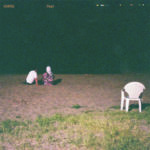
KMRU – PEEL 
KMRU is the artist name of (Joseph) Kamaru, “one of the leading exponents of the experimental music scene of Nairobi”.
Peel is certainly nót his first release: you may want to check out his website for an extensive list of works. But it is his debut release for the Editions Mego label, that recognized the quality of his work – “an exquisite mix of field recordings and electronics unraveling at a repetitive and leisurely pace to expose a rich tapestry of sound with the sheer undertow of emotional content”.
With its 75 minutes (four long tracks and two 6-minute) it is a currently unusual long album. KMRU takes his time to set the mood with his captivating layers. And so it is even more surprising to learn that this album was created in just 48 hours: “a time-restricted experiment in texture, influenced by experiences traveling in Montreal, as well as being back in Nairobi just before lockdown”. Kamaru prefers to have limitations while making music, as he feels that “more time wouldn’t have yielded better results.”
The proof of that is in this album. It doesn’t feel ‘lo-fi’, as you might expect with such a short time-frame, but has a full, organic, and natural sound, which would probably have less impact with too much post-production.
For this stunning result, credits are not only due to Joseph Kamaru, but also to Stephan Mathieu who mastered this album with his fundamental respect for the nature of sound.
KMRU
Peel
(Editions Mego)
Artiste en vue de la scène électronique émergente d’Afrique de l’Est, Joseph Kamaru aka KMRU dessine des paysages ambient au minimalisme hypnotique, dévoilant sur la longueur les modulations et l’incandescence de sa musique.
En six titres, le jeune kenyan affirme son style, déplaçant les mélodies sur des vagues aux mouvements tranquilles. Les forces nocturnes enrobent l’ensemble, recouvrant de vibrations lunaires les effluves de machines happées vers un ailleurs semi-figé, cherchant à passer les frontières entrouvertes entre des cieux aux couleurs passées.
Peel est chargé de mélancolie et de tristesse, sentiments profonds surgis des entrailles d’un homme en recherche de soi, combat entre une nature omniprésente véhiculée par les outils de la modernité. Les field recordings utilisés en filigrane nous rappelle notre nature charnelle issue des combinaisons extraordinaires de la vie.
KMRU explore les versants de l’onirisme, à coups de plages semi-statiques et de drones aux similarités subtiles, de voltiges funambules et de maniérisme émotionnel. Superbe.
KMRU – Peel (Editions Mego) / opaquer (Dagoretti Records)
Joseph Kamaru, the Nairobi-based sound artist and producer behind the KMRU moniker, is also the grandson of the influential and political musician of the same name and considered a “king” of Kikuyu benga. In 2018, KMRU started reissuing his grandfather’s records shortly after he passed away, and in a feature on Kamaru’s reissued catalog, KMRU spoke to his conversations with his grandfather about music. In terms of sound and with two generations between the two, it is hard to imagine they would have crossed paths naturally. In their talks just before Kamaru’s passing, KMRU’s grandfather consistently encouraged him to “stay honest” in his music, no matter what, a simple idea that carries more weight, and is easier to rehash in practice when it comes from a blood relative from the same field.
KMRU, along with Uganda’s Nyege Nyege collective, is part of an expanding electronic scene in East Africa. The region has seen an exponential growth in software and internet access, especially Kenya which has one of the world’s fastest data connection speeds, exceeding the United States and South Korea. In turn, artists have adopted and incorporated music software into their music and developed their own ways of using them, infusing their productions with traditional rhythms and instrumentations of the area. In contrast to the energetic Nyege Nyege Tapes output and many artists sprouting from this scene, KMRU creates ambient music with slow beats and dub inflections in the vein of Detroit’s echospace label or early Andy Stott EPs, gleaning from his home country’s environmental sounds as much as it’s musical traditions.
Two weeks apart, KMRU releases the double-LP Peel and single-LP opaquer. Both albums, like the majority of KMRU’s catalog, contain deep and repetitive and captivating drone and sub bass sounds with subtle, microscopic inflections that rewards engaged listens. Although release within a month, the two have their differences. The pieces on Peel follow waves of repetitive, near-drones, surrounded by smaller outgrowths and separate, subtle manipulations. It could be analogous to a large whale swimming through a deep ocean with trailing schools of feeder fish living off the plankton its body creates. Opaquer also limits the bandwidth of its sound, focusing primarily on one reverberating sound source, usually a field recording, with smaller, electronic supporting tones. But opaquer alters its focus and doesn’t necessarily encourage the sensation of drone; the sounds, more decipherable however ambiguous they may be, live in the reverberations they leave behind, amplifying their contours and giving the impression of a whole, contiguous, solid sound mass.
Something that can define an effective ambient record is an ability to disintegrate the perimeter of the record itself and the outside world. Listening to either Peel or opaquer, say, outside at night, the albums are not met with too much interference, maybe the occasional passing car, laboring window air conditioner, or floating conversation from a neighbors’ windows. But these outside sounds incidentally bleed into the pieces and embed into what KMRU creates, becoming an unintended part of the composition. The wide-open nature of the pieces KMRU creates meet these outside sounds halfway, allowing a lively, tangible commingling, giving you an impression that the pieces on opaquer and Peel have an inherent generative property.
NIGHTSHIFT w/ Diamondstein & KMRU [NTS]
"Anyone that's ever worked a "night shift" (bars, hospitals, taxis, etc.) knows that there's a strange time of night, usually around 4:30-5:30 am, when the most subtle sounds of the world seem extra dramatic. The example I like to use is the sound of a lighter dropping at a gas station. Or the sound of wind through palm trees. The kind of sound that you don't get the chance to hear when the rest of the world is aroused, but in the context of more ambient, experimental, cinematic, and dark music, is inspiring and suggestive. It's the music of film noir, Miles Davis, and Edward Hopper paintings, but also Boards of Canada, Sunn 0))), Molly Drake, Charles Manson, These Hidden Hands, whatever. Night shift always takes on the flavor of the guest's preference but is built around that time of night, and the music that makes you think of it."
Crucial Listening #58: KMRU
Waves of timelessness, electromagnetic chandelier recordings, Minilogue improvisations. The Nairobi-based sound artist discusses three (well, four) important albums.
KMRU - Peel [Editions Mego - 2020]
|
The warmly emotive minimal chord loops on this album have tonal echoes of Biosphere, William Basinski, Gas (Wolfgang Voigt) and Brian Eno, possessed similarly of thoughtful optimism, meditative patience and sunshine-infused sound design. These sounds emanate their zen optimism from a place of domestic comfort and clarity, and will quickly draw you back there. A genuinely serene recording. The Fifteen minute opener "Why Are You Here" is quite simplistic, and yet it is easy to be lost in its reverie, pondering the emotional subtleties of the space it creates. Like Basinski or Voigt's work, the texture is heavily eroded, smeared and blurred; it is only the nectarous undercurrent that remains. The soft, steady shifting of the reverberant sphere around the notes is as natural as patterns of weather. Though the tonalities of each piece are immediately obvious, closer scrutiny reveals a world of quiet layers beneath the filtered synths that form the core of each track. "Well" is appropriately lined with field recordings of water, the soft babbling of streams. "Solace" does justice to its title, a haunting windsong of wavering resonances, cementing the tone of the album as that of nature worship. It is the delicate precision of the luminous production which allows such a recording to succeed. In perfect tonal balance, it is hypotic like a dim light fixture that flickers rhythmically, but never so brightly that one wishes to look away. Tunneling to ever deeper introspective depth, the album culminates with two lengthy tracks, "Insubstantial" and titular piece "Peel", which give a sensation of streamlining one's consciousness into a contented idling. This is one of my favorite ambient recordings in recent memory, suitable both for active listening or for sleeping. The emotions within its tonalities are complex and worthy of many repeated listenings. KMRU is a rising star in the ambient world and I look forward to hearing his other recordings. |
Album of the Day
KMRU
Peel
(Editions Mego, 2020)
We first stumbled upon Joseph Kamaru’s womb-like world while reading a rundown of the records that helped Patricia Wolf deal with her mother-in-law’s death.
“This song is a recent discovery for me,” she wrote of the revelatory KMRU single. “It resonates with the current place I am in with grief. It says to me, ‘Life is full of loss but you must shake yourself out of this suffering and live.'”
We feel the same way after hearing Peel: torn between the cold, hard realities of our current situation (indecisive politicians, resurgent crime rates, Trumped-up tribalism) and the distinctly human need to dig ourselves out of a self-imposed hole and get on with it already.
Much like William Basinski’s seminal Disintegration Loops series or a Buddha Machine with a mind of its own, Kamaru’s Editions Mego debut is deceptively simple and profoundly deep. Call it a ritual, with traces of everything from Tim Hecker to Rafael Anton Irisarri, and quite a few signs that the Nairobi-based composer is just getting started.
34 albums die wij onterecht over het hoofd zagen in de tweede helft van 2020
KMRU – Peel/Jar
In lockdown-tijden durft een mens al eens naar ambient te grijpen om wat rust te vinden. KMRU’s ‘Peel’ en ‘Jar’ lenen zich uitstekend tot muziek om mee in slaap te vallen, maar zorgen door hun begeesterende drones op andere momenten juist tot een soort hyperfocus. Hoewel beide albums zich duidelijk en bewust in de repetitieve sfeer plaatsen, onderscheiden ze zich van elkaar. ‘Peel’ is duidelijk de plaat waar onderhuids de meeste spanning heerst. De gonzende en golvende drones op ‘Solace’ leiden tot een bijna sacrale ervaring, mede door de vage orgelklanken waaruit het nummer bestaat. ‘Klang’ en ‘Peel’ zoeken nadrukkelijker de spanning op. Beide nummers zwellen langzaam maar zeker aan, maar waar ‘Klang’ niet tot een ontlading komt, gaat ‘Peel’ uitermate precies over tot een overweldigende vloed. ‘Jar’ zit in eenzelfde hoek van het spectrum genesteld, maar is misschien een stukje toegankelijker. Hier opteert KMRU nog steeds voor drones, maar deze worden doorspekt met field recordings van spelende kinderen, lichte belletjes (‘Ulmma’) of naar chill-out neigende muziek (‘Note 43’). ‘Jar’ toont zich dan ook als een (iets) gevarieerder album dan ‘Peel’, maar beide zijn zeker evenwaardig aan elkaar. (Daan)
AT HOME WITH LWE: 6TH OCTOBER KMRU TAKEOVER

Reduced by KMRU
“A slowed form of listening”, from a Nairobi producer with a proclivity for drones and field recording.”
The Garden of Forking Paths - KMRU
by Radio Primavera SoundIn this episode of The Garden of Forking Paths, DJ Apologetic talks to Kenyan sound artist, KMRU, about his recent album, Jar, the joys and frustrations of field recording, and moving to Berlin in the midst of the pandemic.

